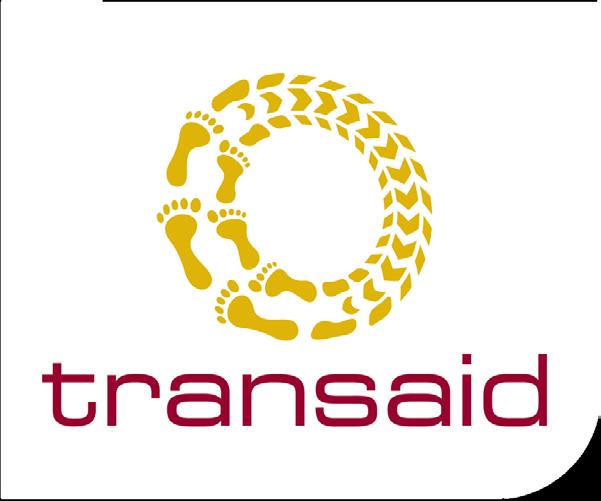EXCITING LINEUP FOR in Heathrow, in collaboration with Altus Group
NAVIGATING EMPLOYEE ENGAGEMENT & recruitment in ����...lessons from & emerging trends
KEEP COSTS LOW ON THE ROAD
Top tips for HGV drivers
INTRODUCING...

EXCITING LINEUP FOR in Heathrow, in collaboration with Altus Group
NAVIGATING EMPLOYEE ENGAGEMENT & recruitment in ����...lessons from & emerging trends
KEEP COSTS LOW ON THE ROAD
Top tips for HGV drivers
INTRODUCING...
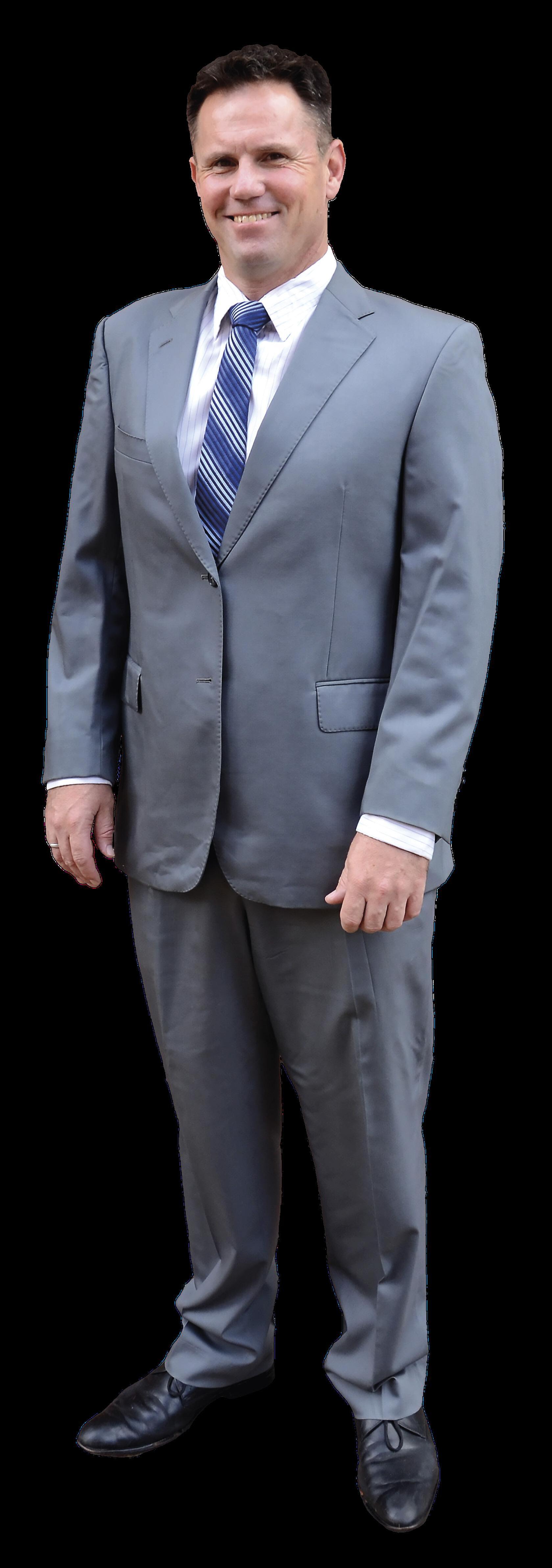 PRINCIPLE MANAGEMENT CONSULTANT, HEADFORD GROUP EUROPE
PRINCIPLE MANAGEMENT CONSULTANT, HEADFORD GROUP EUROPE

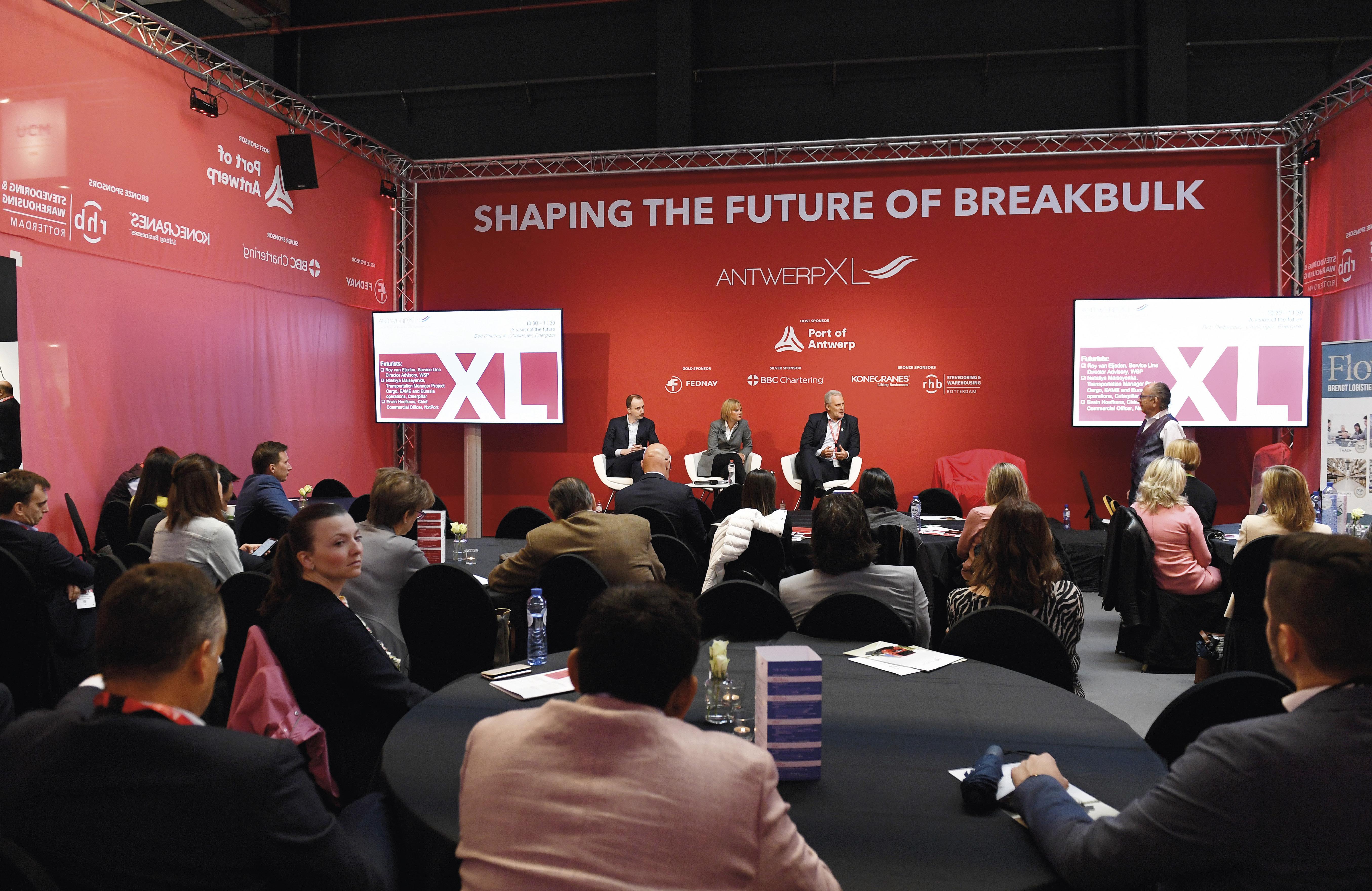


AIR FREIGHT
If it flies and it's freight, we'll feature it.
SEA FREIGHT
If it floats and it's fr... you get the idea.
ROAD FREIGHT
By far the largest share of cargo transport in the USA.
RAIL FREIGHT
The second stalwart; road's right-hand man.
PROJECT CARGO
Oversized, heavy, high-value or mission-critical stuff.
PORTS & HUBS
Gateways to the wider world.
TECH & DIGITISATION
From data to drones. Welcome to the future.
EXHIBITIONS & EVENTS
From promo to expo, don't risk FOMO.
CUSTOMS & SECURITY
If only COVID had been subject to this...
INDUSTRY SERVICES
Everything from freight forwarding to insurance.

CRISIS RESPONSE
The latest emergency, from money to monkeypox.
RECRUITMENT & TRAINING
Growing, perfecting, and certifiying your business.
MERGERS & ACQUISITIONS
The other way to grow your company.
MEDIA & MARKETING
This is a vital industry. Let's shout about it!
Environment. Fundraising. Charity. The feel-good stuff.
elcome to issue 83 of FORWARDER. Thank you to Robert Nel from Headford Group Europe for his feature on employee engagement and recruitment in 2024, an issue that we know is of great interest at the moment.
We also hope you're reading this at the in Heathrow!
Tim, Designer, FORWARDER magazine




CRAIG EDITOR-IN-CHIEF craig@freightsolutions.com
PAUL MEDIA /EVENTS MANAGER paul@forwardermagazine.com +44 (0)1454 275 946

TONY SALES EXECUTIVE tony@forwardermagazine.com

(0)1454 628 795

TIM DESIGN & PRODUCTION tim@forwardermagazine.com
MOHIT DIGITAL & SOCIAL mohit@freightsolutions.com
events...p61, BC
A system of transporting goods by aircraft.
Related topics
AOG (aircraft on ground)
OBC (on-board couriers)

Air charter
Sponsored by
IAG Cargo has expanded its Constant Climate global network that serves the pharmaceutical, bioscience and healthcare industry adding Cincinnati Northern Kentucky International Airport as an approved station
IAG Cargo has over 100 approved stations across six continents
Cincinnati’s strategic location serves as an ideal station, facilitating freight forwarders throughout the United States in transporting an array of healthcare items from vaccines to clinical trial medicines
IAG Cargo, the cargo division of International Airlines Group (IAG), is today announcing Cincinnati, Northern Kentucky International Airport as its latest station in the United States to be approved to transport time and temperature-sensitive healthcare products. Bringing the total number of approved Constant Climate stations in the United States to 21.
This newly established station will facilitate the movement of pharmaceuticals that require precise time and temperature management between Cincinnati and London Heathrow. It will leverage IAG Cargo’s extensive network which links six continents to transport critical cargo such as vaccines, medicinal drugs and clinical trial medication around the world. This service will be of special interest to pharmaceutical customers located in Ireland and India whose life-saving medicines frequently transit through London-Heathrow to the United States.
We are very excited about the opening of a new Constant Climate station at Cincinnati airport. The opening of Cincinnati will allow us to support more customers globally and provide another route by which they can utilise our cold chain solution to transport their key pharmaceuticals. We look forward to working with our partners and customers to increase our pharmaceutical offerings with this new addition.
Jordan Kohlbeck, Head of Pharmaceutical, IAG CargoIAG Cargo’s Constant Climate product is a state-of-the-art cold chain solution that caters specifically to the transportation of pharmaceuticals, such as vaccines, biotech products, diagnostics samples, or any other temperature-sensitive pharmaceutical material. During the first half of 2023, Constant Climate, IAG Cargo’s cold chain product for transporting pharmaceutical products, experienced a 45 per cent increase in the volume of pharmaceuticals transported across its network compared to the previous year.
IAG Cargo’s new 10,000m2 facility New Premia at London Heathrow, launched in May 2023, features a cutting-edge Constant Climate Quality Centre (CCQC) for pharmaceuticals, with 27 dedicated cool cells and temperature facilities available from +2°C to +8°C (COL), +15°C to +25°C (CRT) and -20°C (FRO) ensuring sensitive shipments are held in a temperature-controlled environment at all times.
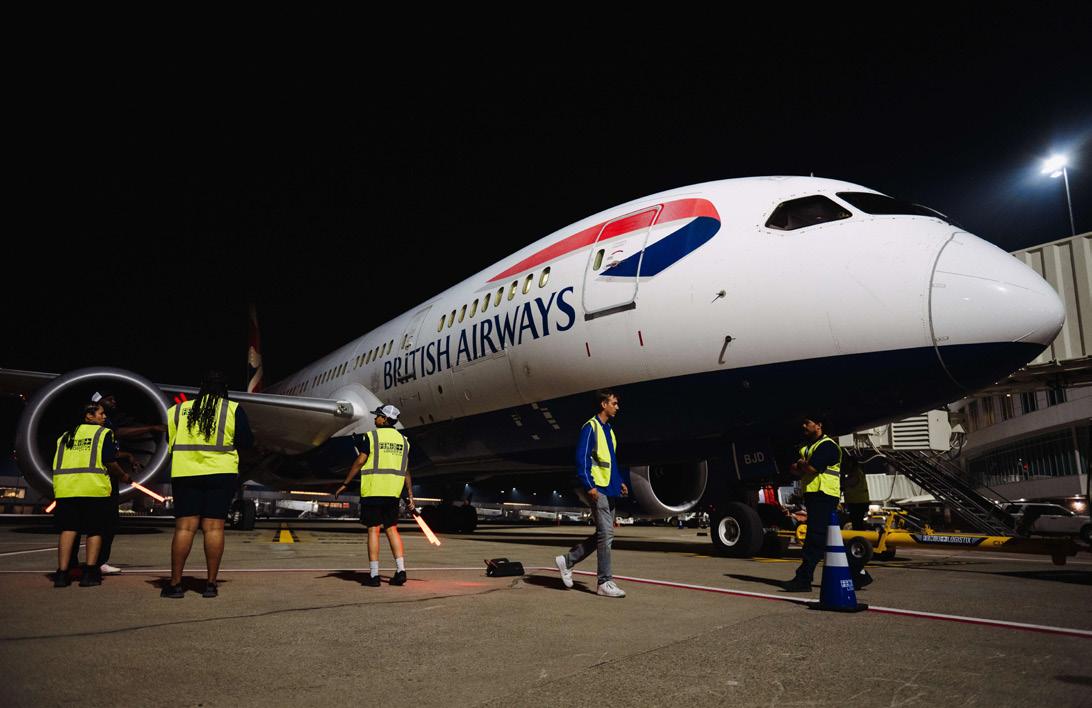
Redkik a global software company with the mission to simplify and improve the supply chain with technology, today announced its partnership with Air Cargo Latin America.
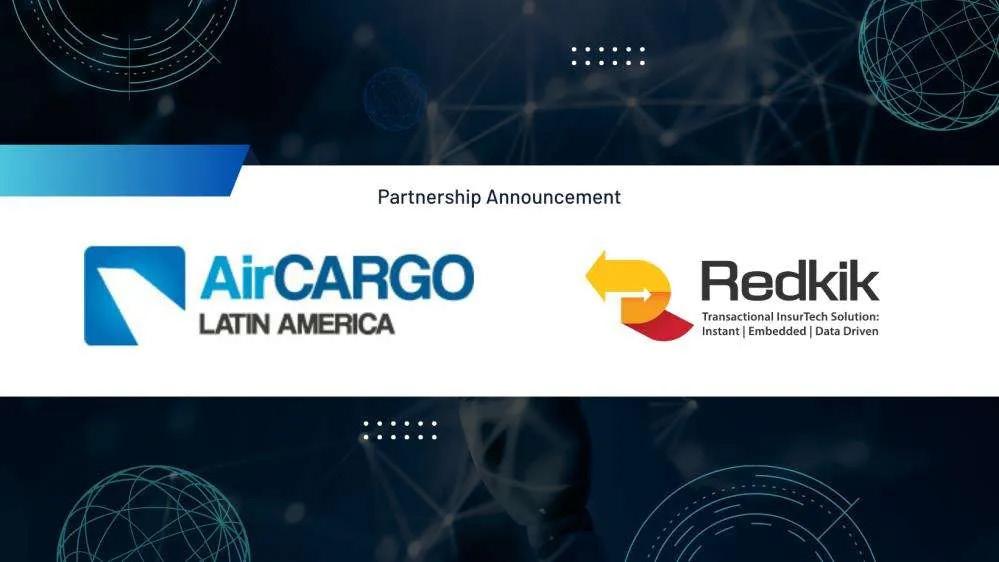
Redkik joined forces with aircargolatinamerica.com to expand its visibility and access in the Latin American Market. Thanks to this agreement, in less than two minutes and on a transactional basis, anyone needing coverage in the supply chain can now quote and acquire international insurance to cover their international shipments, either by air, road or sea, at a very competitive rate.
Redkik´s platform is easy to use and logistics players can access leading and reliable insurance covers without any hidden requirements. Upon completion of the transaction the insured party will receive an email with the certificate of insurance (COI) and additional helpful information.
We really appreciate Redkik’s confidence in Air Cargo Latin America as a vehicle to expand its visibility and presence in the Latin American market. We will do our best effort to honor this commitment, taking an active role in promoting this service among the international cargo community. Since long ago we were looking to offer added value services, other than keeping our audience informed on the latest news of the industry, and we think that by making international insurance available through Redkik´s technology contributes to this objective.
Marcelo Ricciardulli, Managing Director, Air Cargo Latin AmericaLatin America is a growing area of business for Redkik and partnering with Air Cargo Latin America allows to make our technology available to a large audience. We are very excited to assist Air Cargo Latin America to offer an additional service to its users and are looking forward to a long-term collaboration.
Chris Kalinski, CEO & founder, RedkikThis new service offered through Air Cargo Latin America is available to freight forwarders, importers, exporters, customs brokers, carriers (by air, sea and land) and any other person or organization involved in the international transportation of merchandise.
As the mango season has drawn to a close, Kempegowda International Airport Bengaluru (KIAB/BLR Airport) has recorded a remarkable surge in mango exports setting a new benchmark when compared to the previous year. Demonstrating a consistent upward trend in exports, BLR Airport has achieved an impressive 124% growth in mango exports for this season compared to the previous year, establishing a three-year tonnage record.
In 2023, BLR Airport processed an export of 6,84,648 kgs of mangoes, showcasing a significant rise from the 3,05,521 kgs exported in the previous year. Furthermore, this season’s exports saw an impressive 86% increase in the number of pieces, with approximately 17 lakh pieces of mangoes being exported.
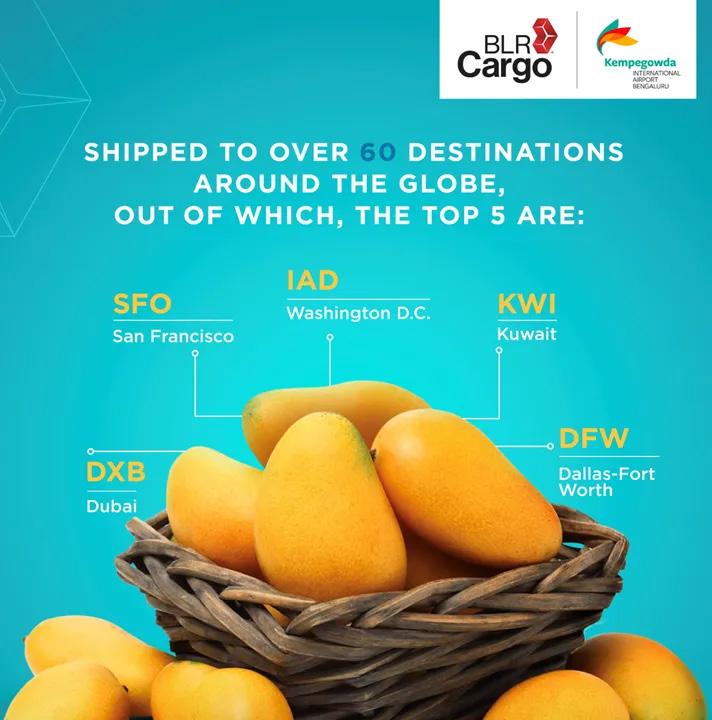
BLR Airport’s expansive export network spans more than 60 international destinations. Particularly noteworthy is the thriving export of mangoes to the United States this year, where prominent metropolitan regions such as Dallas Fort Worth, Washington D.C., and San Francisco have played a pivotal role in fostering this growth.
BLR Airport has emerged as a driving force in facilitating perishable exports from India. With substantial volume shares across Indian airports, we take pride in our role in enhancing the global reach of South India’s mangoes. Our unwavering commitment to streamlined cool-port export operations underscores BLR Airport’s significance as a premier gateway connecting the world to the rich produce of our region.
Satyaki Raghunath, Chief Strategy & Development Officer, Bangalore International Airport LtdAs BLR Airport continues to strengthen its cargo operations, it remains dedicated to its vital role as a bridge between Indian producers and global markets. This commitment significantly contributes to the growth of India’s agricultural and export sectors, fostering economic resilience and expanding the nation’s global presence.
A system of transporting goods by ship.
Related topics
Shipping lines
Biofuels
Ships' parts

Sponsored by
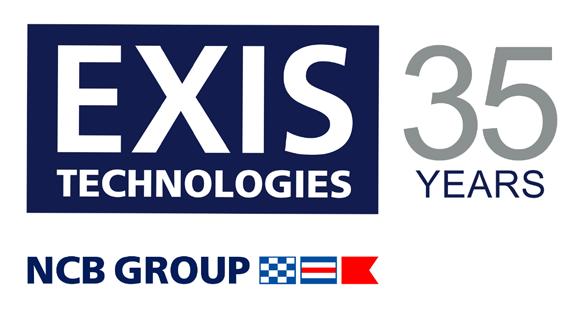
As wholesale inventories dwindle in the US, the ongoing restrictions at the Panama Canal could have implications for Christmas stocks and supply chains. With the imminent Christmas shopping season, the delay in inventory restocking due to shipping disruptions and congestion at the Panama Canal could result in missed sales opportunities for businesses.
The present disruptions have raised concerns about the ability of businesses to replenish their inventories in a timely manner due to shipping delays. If these disruptions continue, there is a looming threat of shortages for select goods during the critical Christmas shopping period.
With the Panama Canal Authority implementing water conservation measures in response to a drought, vessels are experiencing prolonged wait times and capacity limitations, resulting in a ripple effect across the shipping sector.
Prominent industry sources, including Alphaliner, Sea-Intelligence, and Drewry, have reported a notable increase in blanked sailings – the practice of cancelling scheduled sailings to manage capacity. Specifically, during June and July, approximate 10.8% of the regular sailings connecting Central China and Europe were cancelled. Comparable patterns have also emerged in the transpacific trade lanes. As a direct result of these capacity reductions, the market has witnessed a corresponding rise in spot freight rates. This outcome aligns closely with earlier projections made by industry experts.
Notably, the ongoing efforts by the Panama Canal Authority to conserve freshwater amidst the prevailing drought conditions have contributed
to a substantial backlog of vessels – currently numbering around 200 –awaiting their turn to transit through the canal. As this queue lengthens, waiting times have surged to a peak of 21 days, introducing significant delays across multiple segments of the shipping industry.
Given the Panama Canal's role as a vital trench for U.S. shippers, who channel 40% of all U.S. container traffic through the canal annually, the ramifications of the current disruptions are extensive. Measures such as the restriction of booking slots and adjustments to vessel weight requirements have compounded the existing backlog, further elongating waiting times. This, in turn, is straining shipping schedules, potentially leading to disruptions along supply chains and the potential for knock-on effects on pricing structures. The Panama Canal plays a critical role for U.S. shippers en route to Gulf and East Coast ports. The U.S. accounts for 73% of Panama Canal traffic representing about $270 billion in cargo.
The knock-on effects are also anticipated to affect costs. The need for alternative routes and the resulting longer lead times due to the ongoing congestion have the potential to increase operational expenses for carriers. These cost increases may eventually be passed down to businesses and consumers alike. While optimism surrounds the prospect of improvements as the rainy season approaches, historical data indicates that even after the removal of draft restrictions, the process of clearing the accumulated backlog may still be a time-consuming endeavour.
Against this backdrop, collaboration among stakeholders becomes even more pivotal. Effective coordination and communication will be instrumental in addressing the multifaceted effects of the Panama Canal congestion on global trade routes and container prices.
ERMA FIRST, a leading sustainable maritime solutions provider, has received a letter of professional opinion from DNV categorising ERMA FIRST BLUE CONNECT as an energysaving device and verifying its positive impact on Carbon Intensity Indicator performance.
Following a thorough review, DNV has issued a letter of professional opinion confirming that ERMA FIRST’s alternative maritime power (AMP) system, BLUE CONNECT, meets the requirements for categorisation as an ‘energy-saving device’ (ESD). In the same document, DNV recognises BLUE CONNECT’s ability to improve vessel Carbon Intensity Indicator (CII) ratings in line with regulations set out by the International Maritime Organization (IMO).
BLUE CONNECT’s official recognition as an energy-saving device that can help ship owners to improve their CII rating is a significant milestone for the product and for ERMA FIRST as an organisation. This letter of professional opinion from DNV provides evidence of the benefits BLUE CONNECT can deliver as we strive to offer solutions that facilitate regulatory compliance and support the decarbonisation of shipping and the protection of coastal environments.
Dimitris Tsoulos, BLUE CONNECT Director, ERMA FIRST
By plugging into an onshore power supply and shutting down its diesel auxiliary engines while berthed, a vessel equipped with BLUE CONNECT not only saves energy but eliminates the emission of greenhouse gases including carbon dioxide in port, thereby reducing its overall carbon intensity per transport work, Tsoulos explained. In addition to improving CII ratings in accordance with IMO requirements, the solution allows ship operators to comply with port regulations as authorities worldwide continue to develop and implement requirements for the use of shore power at berth.
As the leading global manufacturer of ballast water treatment systems (BWTS), ERMA FIRST considers the protection of marine ecosystems as its primary objective. In developing BLUE CONNECT, the company drew on the experience gained through its industry-leading ERMA FIRST FIT BWTS, to create a product that goes far beyond regulatory compliance in terms of environmental benefits. Specifically, BLUE CONNECT helps improve air quality and reduce noise and vibrations in ports, enhancing health and quality of life in surrounding communities while minimising impacts on aquatic fauna.
The solution is suitable for retrofit and newbuild installations and is available in containerised or stand-alone formats. Standard models currently cater to Ro-Ro, Ro-Pax and pure-passenger ferries as well as container ships, cruise ships and tankers, but the system can be tailored to the needs of other vessel types.
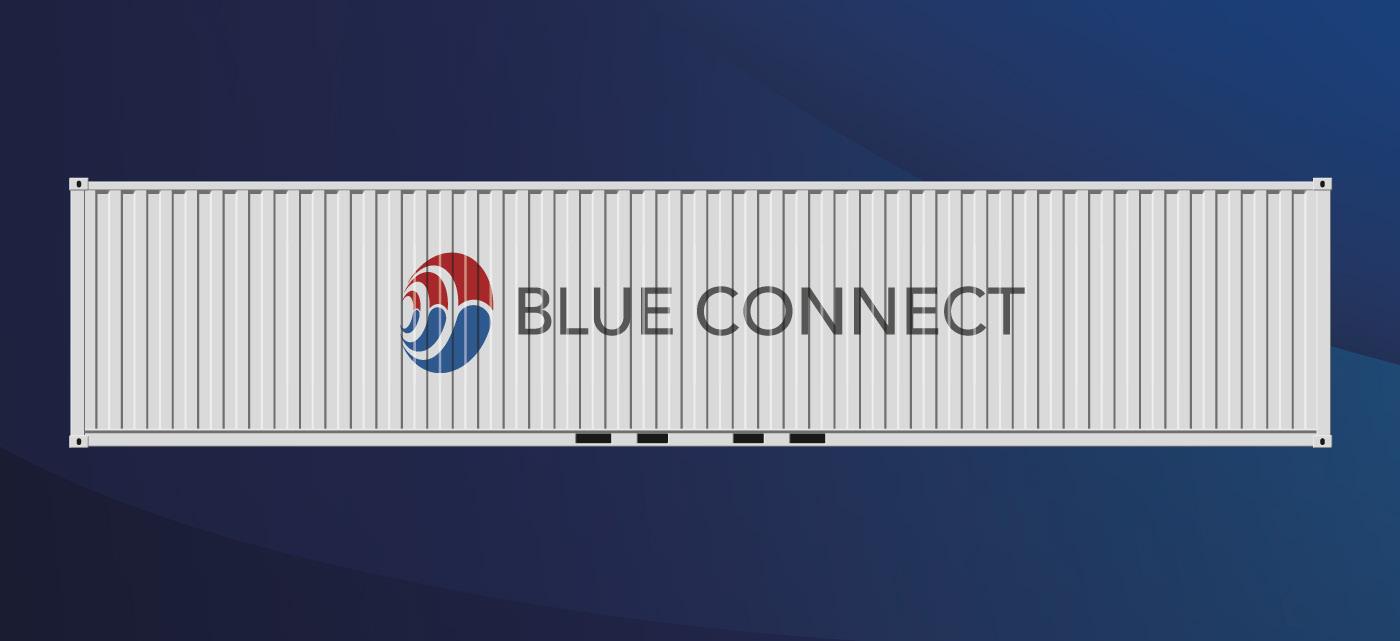




























The global economic slowdown is also impacting the business of HHLA as a European logistics company. This means that 2023 will remain challenging, as was to be expected. In a quest to bolster the company’s future viability and competitiveness, HHLA is stepping up its cost discipline once again and focusing all the more on developing sustainable, innovative and profitable logistics solutions. In the first six months, we continued to invest in state-of-the-art technology, expanded our European rail network and forged ahead with a pilot project on autonomous driving in Tallinn.”
The listed Port Logistics subgroup recorded a decrease of 7.1 percent in revenue to € 707.7 million in the first six months (previous year: € 761.9 million). The operating result (EBIT) dropped by 55.8 percent to € 40.5 million (previous year: € 91.7 million). The EBIT margin came in at 5.7 percent, down by 6.3 percentage points in a year-on-year comparison. Profit after tax and non-controlling interests decreased by 93.0 percent to € 2.7 million (previous year: € 38.4 million). Earnings per share thus amounted to € 0.04 (previous year: € 0.53).
In the Container segment, container throughput at HHLA’s container terminals decreased year-on-year by 14.6 percent to 2,876 thousand standard containers (TEU) (previous year: 3,368 thousand TEU). At 2,763 thousand TEU, throughput volume at the Hamburg container terminals was down 12.7 percent (previous year: 3,167 thousand TEU). The main driver of this development was the strong decline in volumes of the Far East shipping region. The positive momentum from North American freight volumes was unable to compensate for this. Feeder traffic volumes were also strongly down on the previous year. In addition to the strong reduction in Swedish and Polish traffic, volumes
from Russia were also absent due to the sanctions. The proportion of seaborne handling by feeders was down to 18.4 percent (previous year: 20.9 percent).
Throughput volume at the international container terminals fell by 43.9 percent year-on-year to 113 thousand TEU (previous year: 202 thousand TEU). The strong decline in cargo volumes was largely attributable to the Odessa terminal (CTO) after seaborne handling there was suspended by the authorities following the Russian invasion. There has also been an absence of extra calls at the TK Estonia container terminal as an alternative to Russian ports in 2023. The strong increase in throughput volumes at the multi-function terminal PLT Italy was unable to fully offset this shortfall.
Revenue in the Container segment fell by 19.7 percent in the reporting period to € 352.2 million (previous year: € 438.8 million). In addition to the strong decrease in volumes, this was mainly due to shorter dwell times for containers handled at the Hamburg container terminals compared to the previous year and the resulting drop in storage fees. Against this background, the operating result (EBIT) fell by 76.2 percent to € 19.1 million (previous year: € 80.2 million). The EBIT margin dropped by 12.9 percentage points to 5.4 percent (previous year: 18.3 percent).
In the Intermodal segment, container transport decreased by a total of 3.7 percent to 819 thousand TEU (previous year: 851 thousand TEU). Rail transport fell year-on-year by 2.5 percent to 691 thousand TEU (previous year: 709 thousand TEU). All the main routes were affected by the decrease, with the northern German seaports and Polish traffic hit particularly hard. There was a decrease in road transport of 9.9 percent to 128 thousand TEU (previous year: 142 thousand TEU).
With a marked year-on-year increase of 11.1 percent to € 313.0 million (previous year: € 281.6 million), the development of revenue contrasted sharply with that of transport volumes. This was due to the rise in transport revenue in the previous year, which was adjusted to the increased costs for the purchase of services, in particular energy costs, at a later point in time. Mainly as a result of the decrease in transport volumes, the operating result (EBIT) fell to € 41.1 million (previous year: € 42.8 million), a drop of 3.9 percent. The EBIT margin fell by 2.1 percentage points to 13.1 percent (previous year: 15.2 percent).
Real Estate subgroup:
performance January to June 2023
HHLA’s properties in the Speicherstadt historical warehouse district and the fish market area reported a positive trend in the first half of the current financial year with almost full occupancy in both areas.
Revenue rose significantly by 8.6 percent in the reporting period to € 23.4 million (previous year: € 21.5 million). In addition to increased income from revenue-based rent agreements, this growth was largely due to rising rental income from newly developed properties in the Speicherstadt historical warehouse district. A planned temporary vacancy for facade renovation to increase the energy efficiency of a property, as well as increased maintenance expenses and depreciation following completed project development, were more than offset by the growth in revenue. As a result, the cumulative operating result (EBIT) increased slightly by 2.2 percent to € 9.7 million in the reporting period (previous year: € 9.4 million).
Within the Port Logistics and Real Estate subgroups, the key economic indicators for the first half of 2023 and HHLA’s actual economic performance were largely in line with the performance forecast in the combined management report for 2022, which, at the time of preparing the annual report, was subject to great uncertainty due to the geopolitical tensions and their effects on inflation as well as economic sanction measures. In the course of the current financial year, the post-pandemic economic recovery in the main markets of the Port Logistics subgroup has been weaker than forecast by leading economic institutes at the beginning of the year. Consequently, HHLA issued an ad hoc disclosure on 27 July 2023 announcing the downgrading of its guidance for the financial year 2023 compared with the expectations communicated in the quarterly statement January to March 2023.
Against the background of this development, a significant year-on-year decrease in container throughput is now expected for the Port Logistics subgroup (previously: slight increase) as well as container transport on a par with 2022 (previously: moderate year-on-year increase). A significant decrease in revenue is now expected (previously: slight increase). This development is the result of a strong volume-related decrease (previously: moderate decrease) in revenue of the Container segment, which cannot be offset by a significant increase (previously: strong increase) in revenue of the Intermodal segment. Expectations for the operating result (EBIT) have been adjusted accordingly and now range from € 100 to 120 million (previously: € 145 to 175 million). Within this range, a strong year-on-year decrease is expected for the Container segment and a slight year-on-year decrease (previously: moderate increase) for the Intermodal segment in their respective segment EBIT results.
For the Real Estate subgroup, revenue is still expected to remain at the prior-year level with a significant decline in the operating result (EBIT).
Overall, a significant decrease in revenue is forecast at Group level (previously: moderate increase). Against this background of changed expectations, the operating result (EBIT) will be between € 115 and 135 million (previously: between € 160 million and € 190 million).
Capital expenditure at Group level is still expected to be in the range of € 250 million to € 300 million. With investments of € 220 million to € 270 million, the Port Logistics subgroup will account for the majority of this expenditure. In the Container segment, investments will focus on efficiency gains for the Port of Hamburg and the expansion of foreign terminals, and in the Intermodal segment on the expansion of the Group’s own transport and handling capacities.
Given the aforementioned volatile conditions, the outlook remains fraught with significant uncertainties.

Starting from 31st August, the new digital supply-chain product covers inland transportation services in mainland China and Greece, Albania, Bosnia, Bulgaria, North Macedonia and Serbia, customs declaration services at the port of departure, shipping services and customs transit services at the port of destination
With 'Talent Athena', COSCO SHIPPING adds another digital supply chain product to its portfolio. Following 'For For Tune' for shipping cargo from Europe to China launched on 28th August, customers can now import goods from China to Greece and neighbouring countries in one stop. The new door-todoor service 'Talent Athena' is starting on 31st August and includes inland transportation services in mainland China and Greece as well as Albania, Bosnia, Bulgaria, North Macedonia and Serbia, as well as customs declaration services at the port of departure, shipping services and customs transit services at the port of destination in one package.
Like with other end-to-end supply chain products available on COSCO SHIPPING’s digital platform SynCon Hub, customers benefit from easy and fast order, high quality and reliable delivery, convenient and worryfree service, full process visual tracking and transparent fees.
With SynCon Hub, customers can place their orders immediately for importing their cargo via industry-leading foreign trade routes and with reliable delivery guarantees. Based on self-operated resources and dedicated combination products, fees and charging rules are always transparent and worry-free, allowing the customer to choose from all options with confidence. Once the booking order has been placed, the booking will be confirmed within only 2 working hours.
'Talent Athena' is designed as a full process supply chain logistics solution, which also features a one-stop customer service to handle various node matters and accompany the customer and their goods throughout the entire process, for a convenient and worry-free experience without the need of contacting multiple suppliers.
By utilizing advanced digital technology to track every process of goods in real-time, customers can obtain visual feedback on key nodes in the process at any time, track logistics status at any time, and keep track of the dynamics of shipment.
'Talent Athena' comes with a loading and unloading time guarantee, providing 4 hours of free loading time at the loading place and 2 hours of free container unloading at the delivery place, and free use time of the container at the port of departure and destination.
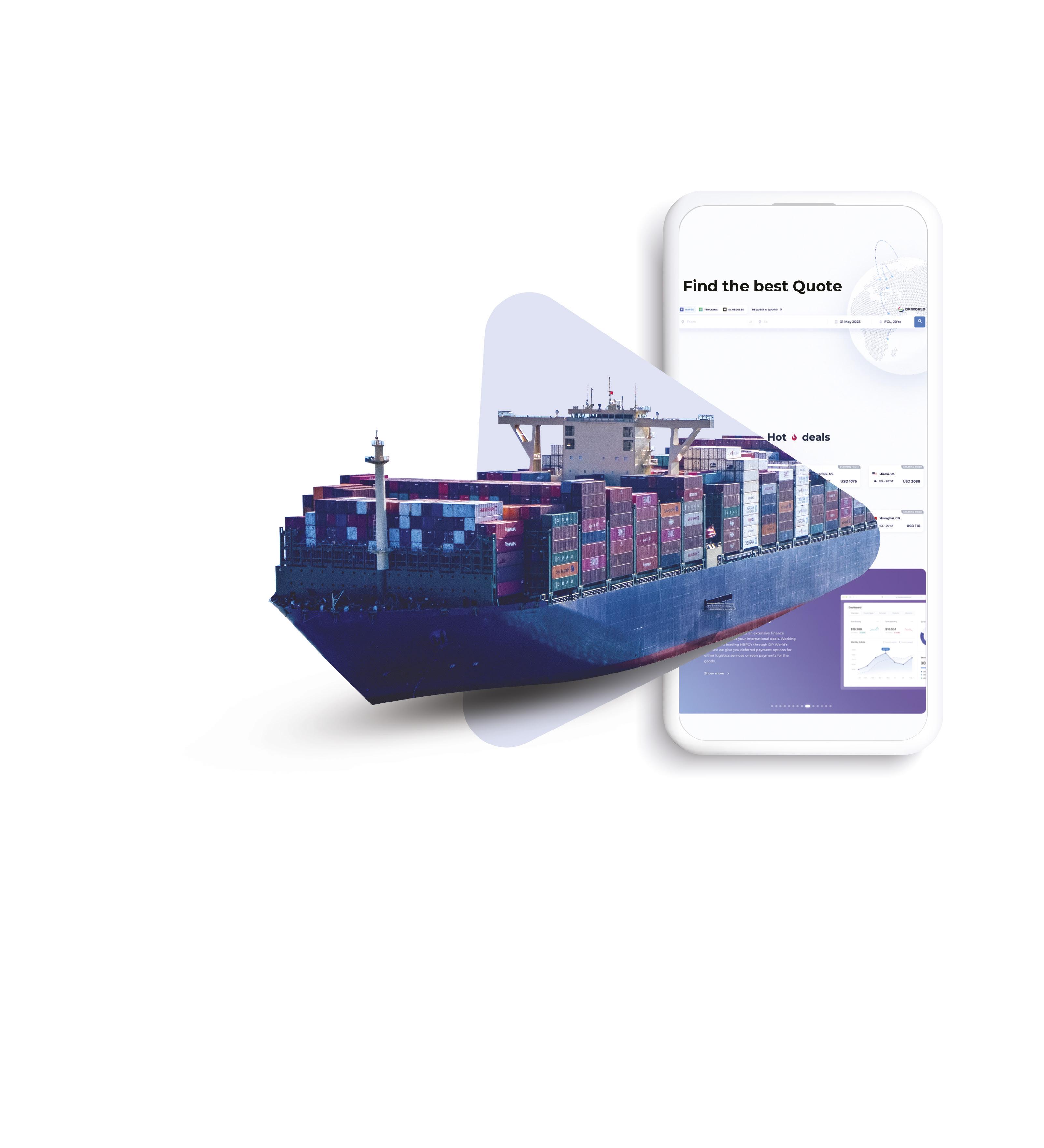

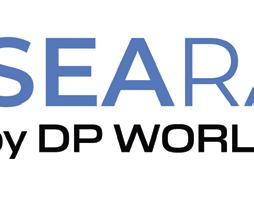




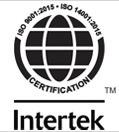

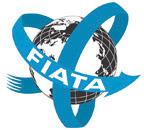










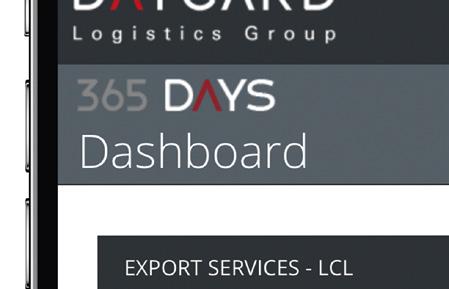

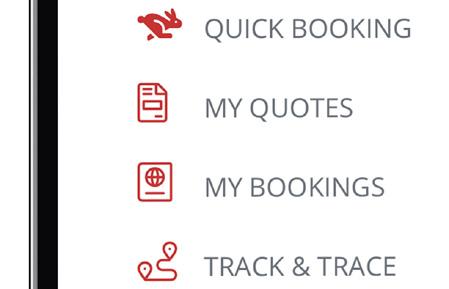


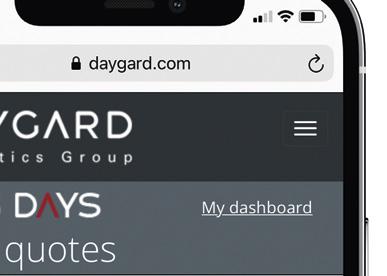

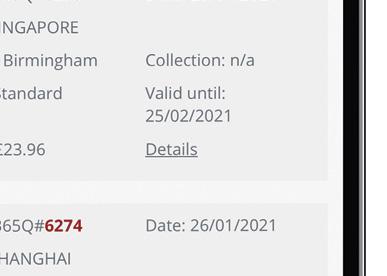


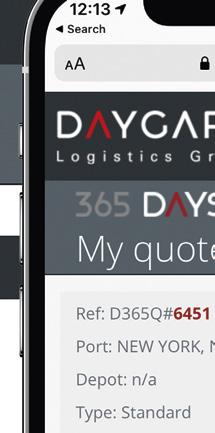
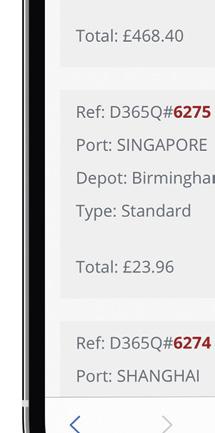



A system of transporting goods by road.
Related topics
Groupage Couriers
Last mile
Sponsored by
Equipped with industry-leading Internet of Things (IoT) security features and infrastructure, the GEODIS Road Network is integrated with major air and sea ports and offers multimodal options to meet customer needs for agile and flexible supply chains.
GEODIS, a global leader in the transport and logistics sector, is driving its growth in Asia with strategic investments in its capabilities and infrastructure in the region. The company has expanded its Road Network from Southeast Asia (SEA) to China – solidifying its position as a leader in providing secure day-definite, cost-efficient and environmentally-friendly solutions connecting Singapore, Malaysia, Thailand, Vietnam and China.
The Road Network features advanced IoT technology and equipment for transporting goods securely for the High Tech, Semiconductor, Automotive, Engineering, Retail, and Fast-Moving Consumer Goods (FMCG) sectors. Investments have also been made to increase service frequency and to enhance its capabilities with dedicated customs brokerage and trade compliance teams at major border crossings to facilitate the seamless movement of goods. The Road Network integrates with major air and sea ports to offer customers a variety of multimodal options to meet the challenges of today’s fast-moving environment and their need for agile and flexible supply chains.
The Road Network to Shenzhen will officially launch on 23 August 2023 and will subsequently be extended to Hong Kong, and in the near future to Indonesia, connected by an inter-modal road-sea service.
In recent years, trade between ASEAN and China has grown rapidly, underscoring the significance of logistics in facilitating trade. Road freight has become one of the fastest-growing modes of transport
in the ASEAN freight market with Thailand and Vietnam looking to invest further in infrastructure to support cross-border trade. The Road Network will enable GEODIS to access the expanding logistics sector in Asia Pacific, projected to reach US$4.5 trillion by 2029 with an anticipated growth of 5.24% from 2023 to 2029.
ASEAN and China are two of the fastest growing economies in the world. As the region remains poised for growth, GEODIS sees the extension of our Road Network to China as an opportunity to enhance our multimodal solutions and connectivity across major air hubs and seaports to give customers greater flexibility and reliability. We have made significant investments to our security, infrastructure and capabilities to ensure a safe and efficient flow of goods for our customers. Ultimately, we want to provide them with a competitive advantage to grow their business.
Recognizing the need for high security, GEODIS has made significant investments into advanced IoT security equipment and processes to safeguard high-value shipments throughout the Road Network. With GPS-tracked, sensor-equipped containers, prime movers and trailers, the Road Network is monitored 24/7/365 by a professional command center, providing real-time, end-to-end visibility of shipments actual locations. Customers can access automated updates of shipment milestones including border crossings via GEODIS’ freight management solution.
The Road Network will be equipped with industry-first truck safety and driver assistance features such as brake assist, stability control assist, hill hold assist and driver fatigue monitoring, to ensure utmost safety of people, vehicle and cargo.
Trailer Dynamics and Duvenbeck are successfully joining forces to decarbonise heavy goods traffic on roads
The logistics specialist, Duvenbeck, and the technology innovator, Trailer Dynamics, have taken a major step towards enabling more sustainable goods traffic on roads. The dieselpowered tractor unit required more than 45 percent less fuel on a journey of 325 kilometres during a field test when used in combination with an eTrailer. In addition to the benefit of having lower operating costs, this represents a further milestone in reducing CO2 emissions when transporting goods.
The test has demonstrated that the eTrailer technology not only helps reduce operating costs, but it can also make a significant contribution to greater sustainability in the logistics sector. Climate-friendly transport logistics is the goal of all those involved.
Jörg Witt , Head of Group Sales, Duvenbeck GroupThe eTrailer, a product that Trailer Dynamics has been developing for many years, is equipped with an electrically-power middle axle and it was used in conjunction with a diesel-powered tractor unit during the field test. It took place in conjunction with Volkswagen Konzernlogistik GmbH & Co. OHG on a journey heading to the Volkswagen factory in Wolfsburg. Duvenbeck needed to transport 11.9 tonnes of vehicle parts from its business site in Herne to Lower Saxony.
Bernd Reining, the Fleet Manager at Duvenbeck, has played a major role in this project through his extensive practical expertise and his profound understanding of the specific needs of an automobile logistics company.
By fitting an additional, functionally reliable, electric powertrain in the eTrailer, it is possible to achieve significant reductions in the consumption of diesel fuel and CO2 emissions in the diesel tractor unit and noteworthy increases in the battery electric vehicle’s range (BEV).
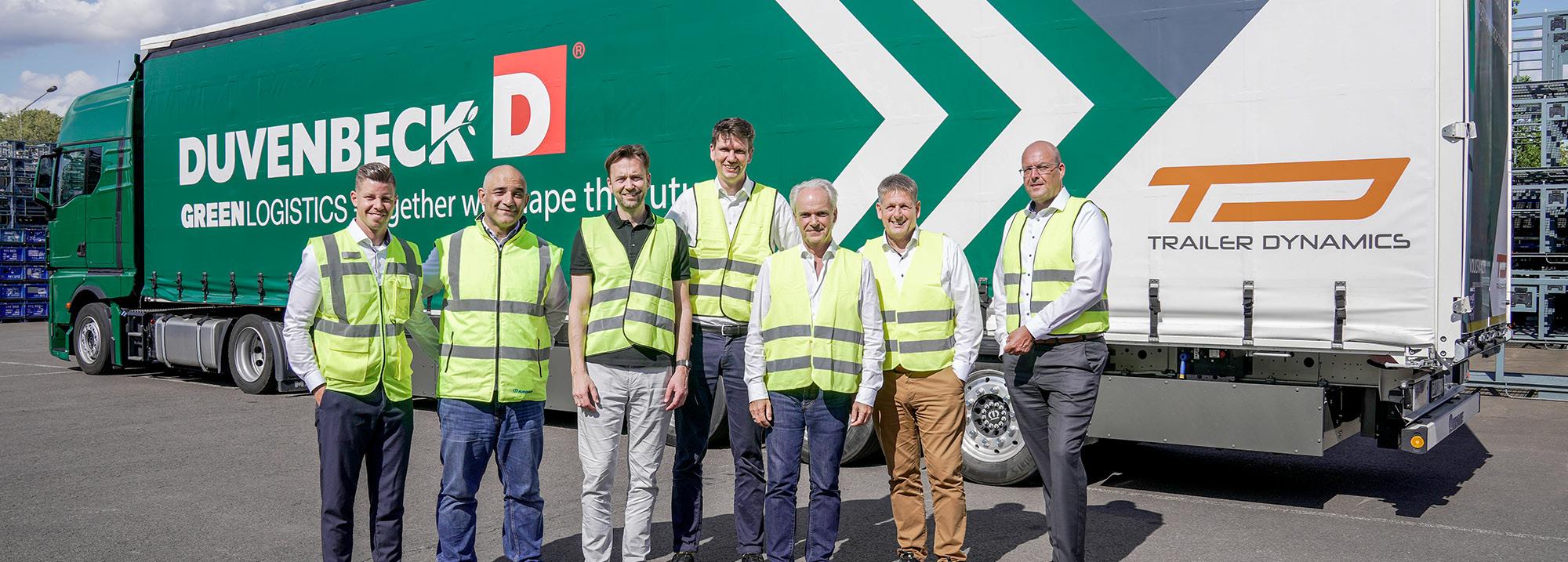

























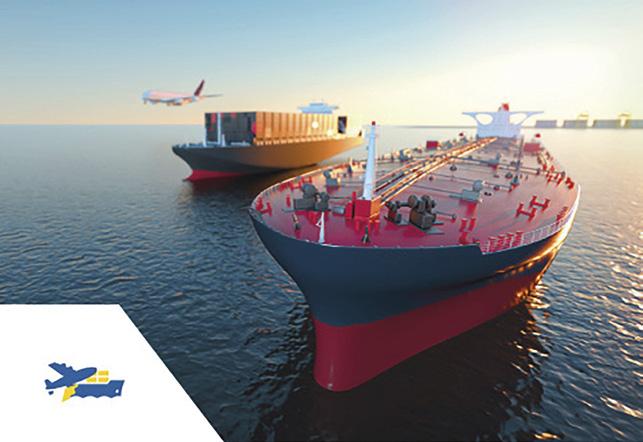






As HGV levy returns and ULEZ due to hit this month, price drops are expected to turn into price rises
New data from the TEG Road Transport Price Index reveals that road transport prices fell 2.13% during July, with haulage prices dropping just under 4%.
However, prices have been relatively stable so far this year, marching slowly upwards since February. The combined haulage and courier index had risen by less than 8 points up to July. And the courier price-per-mile has remained almost unchanged since April 2023 – a continuing trend with no change from June 2023 to July 2023.

But now, with the HGV levy back and ULEZ in force later in August, operators will face higher costs and may have to raise their prices.
At the same time, with the Tories winning the Uxbridge and South Ruislip byelection on an anti-ULEZ ticket, the government has started rethinking its green vehicles policy and has turned back to fossil fuels. This may mean electric vehicle investment suddenly becomes less necessary – as will road transport price hikes.
The High Court’s decision to rubber-stamp the ULEZ expansion was met with dismay in some quarters.
Most diesel vans registered before September 2015 will have to pay the charge, as well as most petrol vans produced before January 2006. Transport for London estimates that more than 200,000 drivers of noncompliant vehicles will be affected. Greater London and the surrounding counties are home to a collective 33% of the UK’s vans.
Those least able to adapt, such as small businesses, will bear the brunt of this change – and the returning HGV levy.
Encouraged by their success in winning the Uxbridge and South Ruislip byelection by campaigning against ULEZ, the Tories have since announced plans to revisit their environmental policies.
Rishi Sunak has just confirmed he’ll seek to ‘max out’ the UK fossil fuel reserves, while Downing Street previously said the 2030 ban on new petrol and diesel car production is being reexamined.
Now, many in the road transport industry are questioning whether the government will actually ban production of new small diesel trucks (by 2035) and new 26-tonne-plus trucks (by 2040).
This means uncertainty for operators considering switching to an electric fleet – and those who’ve made the switch in the hope of infrastructure improvements.
Some hauliers and couriers might follow the example of Royal Mail and PepsiCo, who’ve introduced hydrotreated vegetable oil (HVO) as an alternative fuel. It’s a less expensive and time-consuming switch than going to EVs, and every HVO mile creates 80% less greenhouse gases than diesel.
The Rhenus Group is broadening its network of business locations in Germany for (inter)national road freight by expanding two of its business sites. While a completely new logistics facility is being built in Nuremberg with extremely modern warehouse, handing and office space, Rhenus is extensively expanding its existing logistics facility at its business site in Dietzenbach in order to meet the growing demand for warehouse and handling space.
We’re delighted that we’re able to meet the growing demand from our customers in the business regions of Frankfurt and Nuremberg. In Dietzenbach alone, we’re expanding our space for handling operations by about 50 percent and we’re doubling our current cross dock in Nuremberg in order to particularly strengthen our presence in general cargo traffic across Germany and Europe too, says Nenad Lukic, the Managing Director of Rhenus Road Freight, explaining the developments.
Rhenus is proud to be growing organically and expanding its network with new business locations for Rhenus Road Freight. A new logistics facility with a transhipment and warehouse building is being constructed in Nuremberg on an area measuring almost 17,000 square meters. As the new building is right next to the current high-shelf warehouse operated by Rhenus Warehousing Solutions, customers will in future benefit from different processes that are ideally interconnected. It will not only be possible to provide interim storage at short notice for goods that have been transported there, but also quickly and easily prepare products for (inter)national road freight services, even if they have been in store at the high-shelf warehouse for quite some time. Overall, almost 25,000 square meters of logistics space will be available for the different divisions once the building has been completed. The general contractor, Max Bögl, which has its headquarters in Nuremberg, is responsible for constructing the new facility.
The business site in Dietzenbach is also being expanded on an impressive scale. The new feature here is that it will be possible to store both hazardous goods and products from pharmaceutical companies with special temperature requirements. The goods from customers in the chemical and pharmaceutical industries are subject to many different legal stipulations regarding storage and all of them will be met at the new logistics facility in Dietzenbach. Rhenus is working with the general contractor, Köster, in Dietzenbach.
Rhenus is attaching great importance to the issue of sustainability for the extension and new building work. A green roof is being installed at Dietzenbach, for example, and most of the building materials from the old demolished, buildings dating back to the 1970s are being reused in Nuremberg. Both business sites are also receiving a solar power unit, they will process rainwater and will also be built or converted in line with the Building Energy Act (GEG) 40 norm instead of the currently compulsory standard GEG 55. The employees will benefit too: they will have access to a new and modern working world with open rooms, ideas workshops and feel-good areas.
The two facilities in Nuremberg and Dietzenbach are expected to be completed during the spring of 2024.
Northampton-based pallet network, Fortec Distribution, is celebrating its three-year milestone as a wholly owned subsidiary of Pall-Ex Group
Operating out of its hub in Watford Gap, Fortec has benefitted from the support of Pall-Ex Group, which has allowed it to retain the agility of a smaller network while gaining the experience and resources of an international market leader.
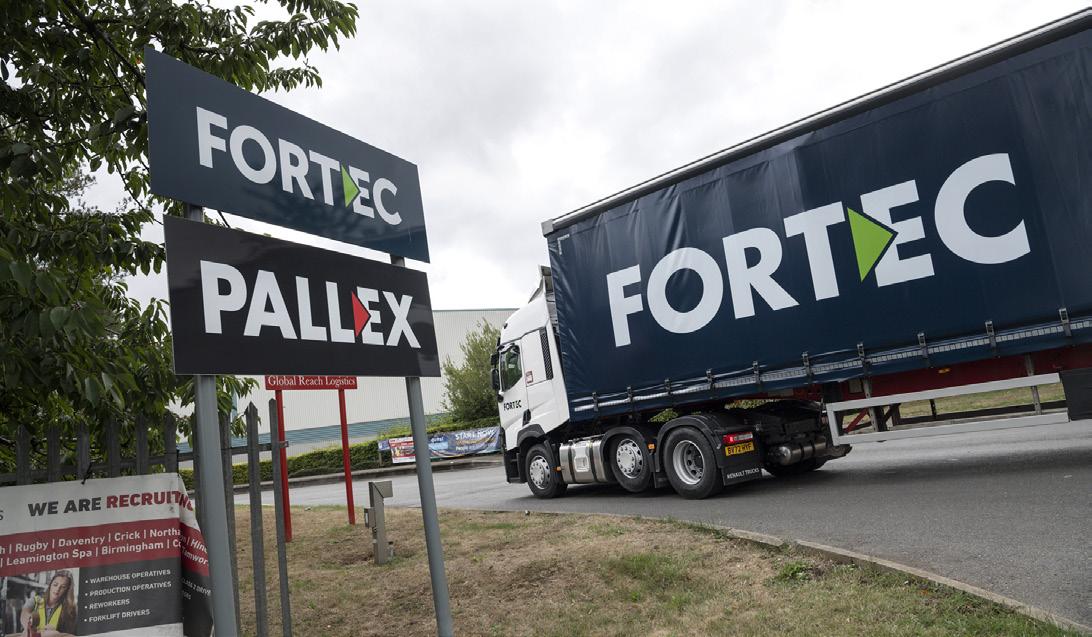
Under its previous ownership model, Fortec was losing over £2.5 million per annum, however Pall-Ex Group has transformed the business into a much stronger outfit, seeing it bring in an EBITDA profit of £286,000 in the year to July 2023. During the last three years, one of the biggest changes has been the introduction of the shareholder model, a tried and tested model which has proved successful amongst Pall-Ex’s members. Long-standing members Brocklehurst Transport, Team C Express Logistics and Devereux Transport were amongst the first to sign up, giving them the opportunity to acquire shares in the business and have a say in how it operates.
Barry Byers, Managing Director of UK Business Units at Pall-Ex Group, comments on the partnership: It’s been great to watch Fortec Distribution and its members thrive over the last three years. Our commitment to our members is our highest priority, so every investment made into Fortec has been worthwhile as we continue to watch the network grow. It’s been a fantastic partnership to date and I’m excited to see what the future holds.
Fortec Distribution now has over 60 members operating across the UK, offering a cost-effective distribution service to customers in every UK postcode. Access to Pall-Ex Group’s international network also provides them with the opportunity to take their customers’ freight further afield, with full European coverage.
In July 2023, the business launched a best-in-class product range. The range boasts five new products, including the first-to-market in the pallet network, Parcel Pallet.
This compact pallet supports loads up to 150kg and allows a costeffective, efficient, and secure way to send large parcel and multiple parcel consignments. The full range can handle loads up to 1200kg, offering members complete flexibility to ship a range of different consignments.
Investments into Fortec’s hub facility have seen major improvements in its operations. A fleet of 36 new forklift trucks worth over £250,000 are in operation, while an additional £180,000 has been spent on upgrading the roof of its 210,000 sq. ft warehouse. Further improvements will see Fortec’s hub capacity increase by an additional 2,000 pallets per night, allowing the network to deliver a much stronger and more efficient service.
The future holds even more enhancements to the sector-leading core operational system, Nexus. The system has already given members tracking capability and an integrated messaging system, allowing them to communicate better than ever before.
But 2023 will see further developments to the system, giving members the ability to book delivery timeslots within a 2-hour period.
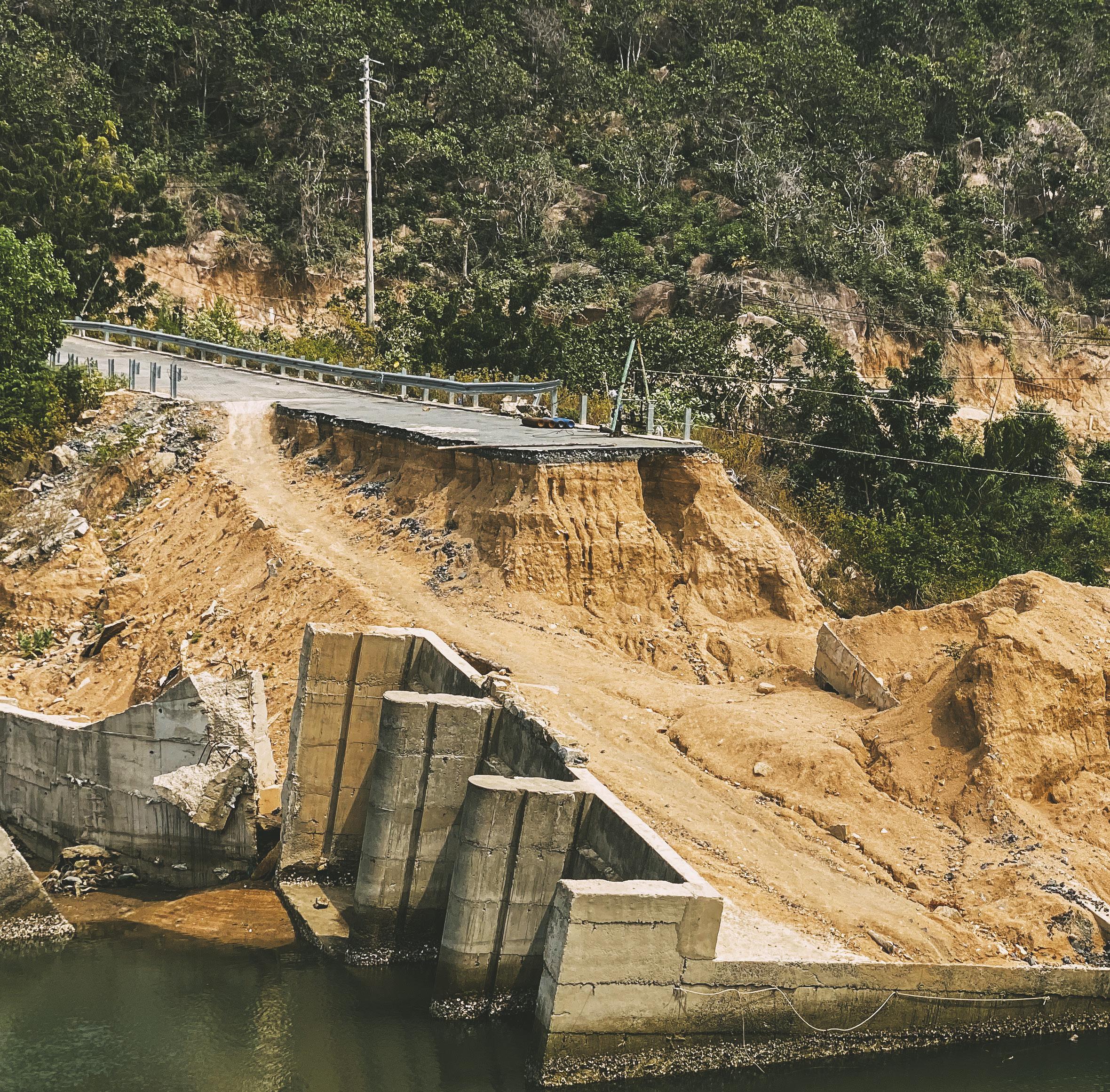
At United Development we possess the dedication to not merely deliver on a requirement but to make the improbable a reality. To possess the expertise and agility to deliver more than purely the physical, often to remote and challenging regions, but to deliver confidence among government, non-government and commercial sectors that rely on and trust United Development to deliver the undeliverable. Find out more at: udfze.com
Howard Tenens Logistics are pleased to have been awarded a new contract with Beavertown Brewery. The two companies have enjoyed a positive relationship since the beginning, with both sides recognising the mutual value delivered
Founded in 2011, Beavertown Brewery is an award-winning brewery based in London, UK. With a commitment to quality and creativity, Beavertown produces a range of unique and exciting beers, like Neck Oil that have won critical acclaim and a loyal following.
The partnership between Howard Tenens Logistics and Beavertown Brewery began when they recognised a need to extend their operational footprint. The Beavertown Brewery team visited Howard Tenens Logistics site in Swindon and immediately felt that the ethos of the company matched their own, making it the right fit. Being a familyowned business offers a strong sense of commitment and dedication with a deep investment in success. Howard Tenens Logistics place high value on building and maintaining relationships with customers and this has proven successful with Beavertown Brewery. The recent acquisition of Beavertown Brewery by Heineken further highlighted the need for a logistics partner who could provide unique and scalable solutions to support their growth. Howard Tenens Logistics, with over 4.5 million square foot of warehouse space and a proven track record in the food and beverage industry, was well-positioned to deliver on this requirement.
Being a family-owned business with over 70 years of experience in the logistics industry, Howard Tenens Logistics has a focus on innovation, sustainability and offers a range of logistics solutions, including warehousing, transport, and value-added services.
Environmental sustainability was one of the key considerations for Beavertown when selecting Howard Tenens Logistics. The level of commitment to sustainability demonstrated by Howard Tenens Logistics was unparalleled, with initiatives such as CNG and HVO vehicles that helped reduce carbon footprint. These efforts were complemented by their targets of achieving Net Zero by 2045 and reducing annual CO2 emissions by 20% by 2030. These goals aligned with Beavertown's own values, making Howard Tenens Logistics an ideal partner for them.
John Davis from Beavertown Brewery commented: During the tender process, we were struck by the culture and values of Howard Tenens Logistics. We felt it was a perfect match for our company, as they were forward-thinking, innovative, and environmentally aware, and a family-oriented business. We have had a very positive experience with our working relationship.
Cost effective solutions for businesses are a top priority at Howard Tenens Logistics. This commitment to excellence is reflected in the services offered at their site in Swindon, which is where Beavertown Brewery operates from. The Swindon site provides support for UKwide distribution, with inbound support from Enfield and onwards to key delivery points. Howard Tenens implemented a wet bond on site during Beavertown's onboarding, and since then, they have renewed their BRCGS certification, achieved a level 5 food hygiene rating and is currently going through Soil Association auditing.
We are proud to have been selected by Beavertown Brewery for our commitment to innovation, sustainability initiatives and our overall ethos. Our successful working relationship is a testament to the mutual value that is delivered here at Howard Tenens Logistics. We place a high value on building relationships with our customers and we are happy to continue our relationship with Beavertown. We certainly look forward to delivering exceptional logistics solutions to drive both our businesses forward.
Jamie Hartles, Chief Executive Officer of Howard Tenens LogisticsThe working relationship between Howard Tenens Logistics and Beavertown Brewery represents a commitment to a shared vision of growth. Both companies look forward to continuing their collaboration and exploring new opportunities to improve their operations and deliver the highest level of service to their end customers.
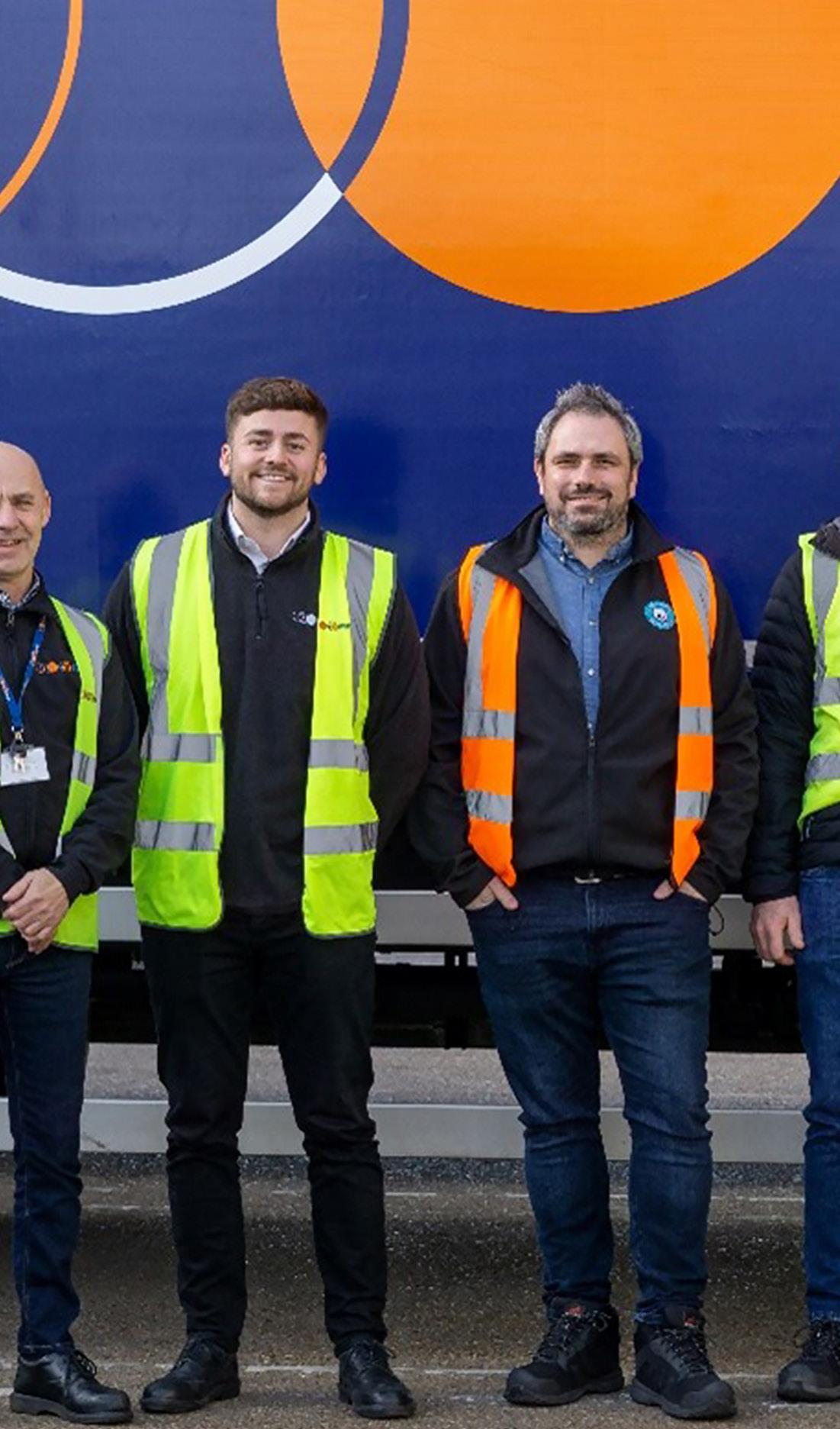
Beavertown Brewery is dedicated to crafting high quality, innovative beers like Neck Oil IPA, Gamma Ray APA and Lazer Crush Alcohol Free IPA that appeal to the thirsty masses. From brewing to branding, we believe in creativity at the heart of everything we do.
At Beavertown, we believe beer is more than just a beer, it’s an experience. That’s why we host weekly Saturday taprooms to give people the chance to taste our carefully crafted beer in its natural habitat, our own Tottenham brewery.
Now 11 years old, Beavertown began life on a 650L kit in a BBQ joint in Haggerston. The brewery in Tottenham Hale produces 5500L batches (or 9,000,000 pints a year) and our new home in Enfield - Beaverworld - will allow Beavertown to produce ten times this, a staggering 90,000,000 pints a year.
The official craft beer of Tottenham Hotspur F.C., you can enjoy a crisp pint of your favourite Beavertown brew in our new taproom and microbrewery inside the stadium - the first of its kind.
In 2021, Beavertown opened the doors to its first-ever pub, Corner Pin, at the brewery’s home in Tottenham. Popping with vibrant blasts of colour, iconic Beavertown designs and with a menu featuring the whole range of Beavertown's out-of-this-world beers, Corner Pin encompasses everything that makes the brand unique, bringing all of its creativity and curiosity to the new north London location.
Winner of 3 gold medals at the International Beer Challenge for core range beers Gamma Ray & Neck Oil.
The use of railroads and trains to transport cargo, as opposed to human passengers.

Related topics
Belt & Road Initiative
HS2
Rail terminals and depots
Eastship are pleased to announce their involvement in the modernisation of the railway between Sighișoara and Brașov in Romania; an upgrade which will cover an extensive 128 kilometre stretch.
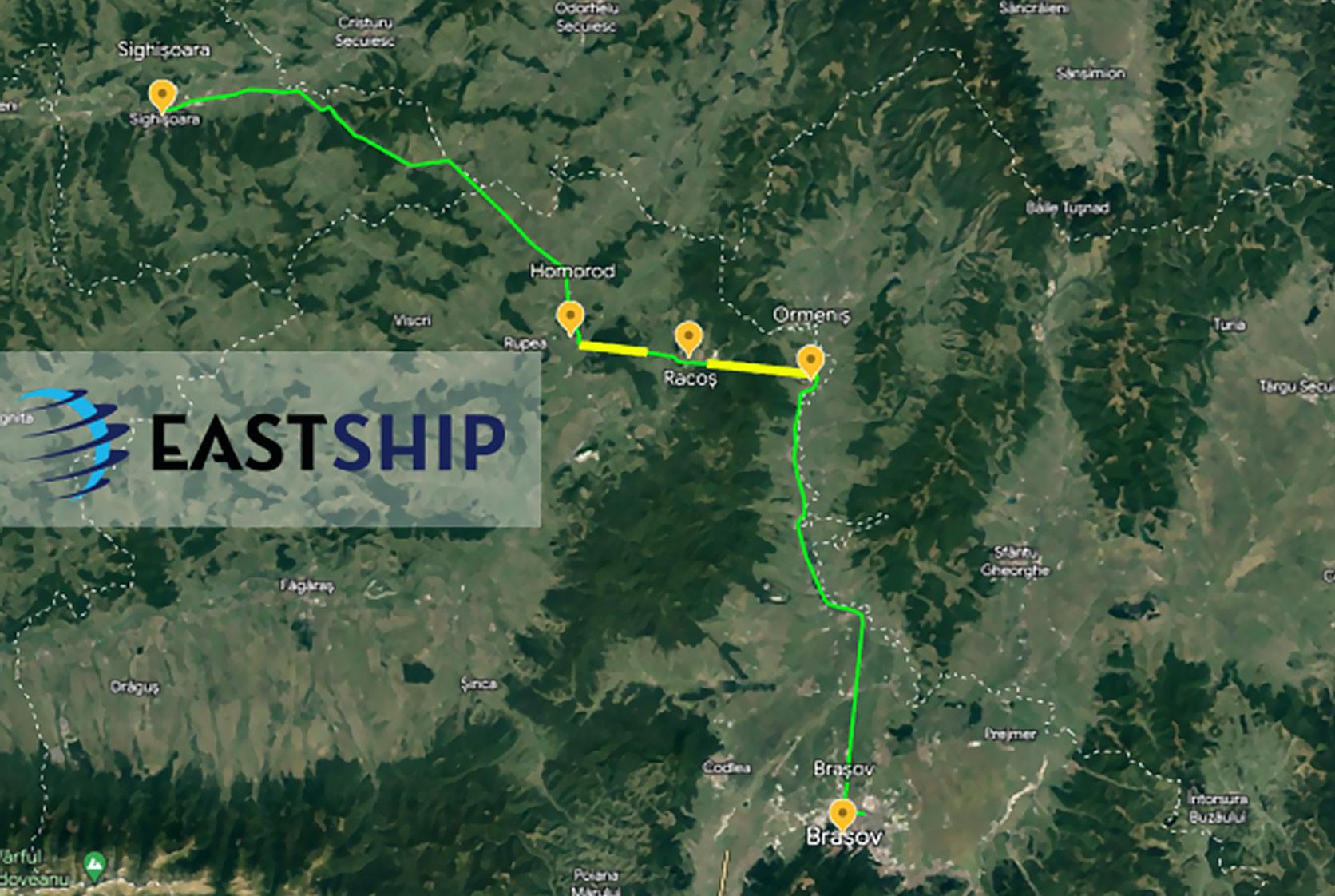
The project includes...
• Rehabilitation of 3 stations, namely Racoș, Mateiaș, and Ormeniș
• Construction of 2 overpasses
• Development of 7 bridges
• Installation of ten culverts, facilitating water drainage and maintaining the integrity of the railway infrastructure
• Erection of three viaducts, offering elevated passages for trains, spanning challenging terrain and promoting a more seamless journey
At the core of this ambitious endeavour, though, are the construction of two tunnels measuring five and seven kilometres respectively. To accomplish this feat, state-of-the-art Tunnel Boring Machines (TBMs), affectionately called 'cârtițele' or moles, have been deployed.
These colossal machines are capable of advancing 15 meters per day, and will operate twenty-four hours a day, six days a week. This allows for a projection that the seven kilometre tunnel will be completed in 18-19 weeks, and the five kilometre tunnel in 14-15 weeks.
As a logistics partner for this project, Eastship played a pivotal role in transporting the massive machines to their designated locations. Despite the challenges posed by navigating winding mountain roads, the experienced Eastship team handled the transport – with some parts exceeding 5.5 meters in width – for over 500 kilometres.
Once completed, the upgraded railway section between Sighișoara and Brașov will facilitate train speeds of up to 160 kilometres per hour, reducing travel time between the two tourist cities significantly. Presently, trains navigate this stretch at a modest pace of 40 kilometres per hour.
Hellmann Worldwide Logistics is pleased to announce that Marijo Pesic has joined the company as Director Product Management Rail Europe. In this newly created position, he is responsible for the strategic development of all European intermodal transport in combination with rail. Hellmann's goal is to further develop railfreight within Europe as an important part of intermodal transport establishing environmentally friendly and at the same time cost- and time-efficient supply chains throughout Europe.

Marijo Pesic, a 41-year-old transport expert, has many years of experience in combined transport. For almost 25 years, he worked for Kombiverkehr GmbH & Co. KG in Frankfurt (Germany), where he was most recently responsible for services in Eastern and Southeastern Europe. At Hellmann, in addition to the strategic further development of the Rail Europe product, he will use his in-depth industry know-how to launch new intermodal products with a particular focus on the development of sustainable supply chains between Europe and Turkey.
Sustainability is a key focus for Hellmann – and rail transport means climate protection. Therefore, it is our declared goal to shift as much freight as possible to rail. We will significantly expand combined transport throughout Europe to offer our customers internationally tailored, environmentally friendly transport solutions. That's why we are delighted that Marijo Pesic, a proven expert in combined transport, works with us and our international rail team to implement this development in a forward-thinking and sustainable way, Jens Wollesen, COO, Hellmann Worldwide Logistics
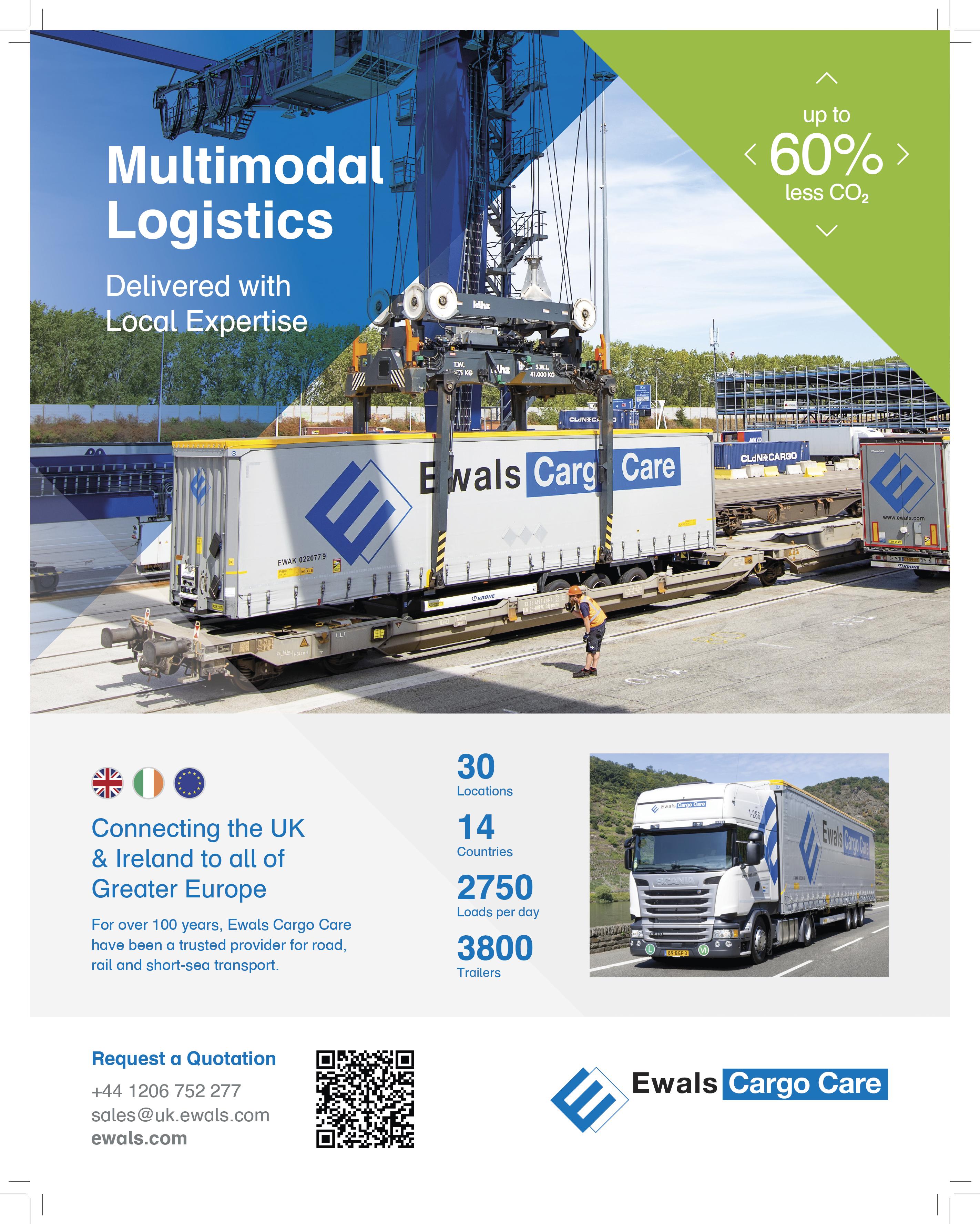

Hamburger Hafen und Logistik AG (HHLA) is expanding the portfolio of its climate-friendly product HHLA Pure. As of today, HHLA rail subsidiary Metrans will significantly expand its HHLA Pure network in Europe and thus offer its customers additional routes certified as climate neutral. With the HHLA Pure product, HHLA and its rail subsidiary Metrans offer their customers climateneutral throughput and transport of their goods from the terminals in the Port of Hamburg all the way to the European hinterland. From today, Metrans will include the seaports of Gdansk, Rijeka, Rotterdam, Trieste and Wilhemshaven in the system for carbon-free transport. In addition, the inland terminals in Duisburg, Germany, and Indija, Serbia, will be integrated into the HHLA Pure network. Metrans has thus more than doubled its available routes and now offers around 340 connections through the HHLA Pure network. In the past half-year, Metrans had already transported two-thirds of its overall container volume in a climate-friendly manner with the help of HHLA Pure.
With the expansion of the HHLA Pure network, we are making another important contribution to climate protection and offering our customers even more opportunities to transport their containers from the seaports to the hinterland in a certified climate-neutral way.
Peter Kiss, CEO, the Metrans GroupAll rail transports to and from Hamburg, Bremerhaven and Koper with HHLA Pure have been carbon-free since 2021. The expansion with additional routes was also reviewed and certified by TÜV as part of this year’s audit. Metrans uses state-of-the-art equipment (electric and hybrid locomotives, modern carrying wagons and electric cranes) and, in Germany and Austria, electricity from renewable sources in order to limit the carbon emissions caused by the handling process to a minimum. The remaining CO2 emissions per standard container (TEU) will be calculated for each route and compensated through high-quality climate protection projects.
HHLA also offers its customers climate-neutral handling at its container terminals in Hamburg. In August 2023, Container Terminal Altenwerder once again received the certificate from TÜV NORD for the company’s climate neutrality. The aim is to further reduce the amount of offsetting and to ensure that all production is climate-neutral across the entire HHLA Group by 2040. HHLA continues to rely on the development and use of technological innovations to achieve this aim.
CargoBeamer, a leading operator of rail connections and terminals for non-craneable semi-trailers in Europe, is further expanding its best-developed line. The route between Kaldenkirchen (Germany) and Domodossola (Italy) consists of 17 weekly rotations since the end of August. Since it runs on the Simplon corridor and through the Lötschberg Base Tunnel, CargoBeamer could ensure unobstructed operations of the line in recent weeks which were dominated by the Gotthard tunnel incident. Additionally, the new schedule now represents the highest density of trains ever operated by CargoBeamer on this line and serves as the highest frequency on a route in transalpine intermodal traffic between two terminals for craneable and non-craneable semi-trailers in Europe.
With the new schedule, CargoBeamer offers its customers a great flexibility with up to four daily departures in each direction. As is customary on CargoBeamer connections, customers can send noncraneable semi-trailers, P400, refrigerated and silo trailers in addition to craneable semi-trailers and containers. The transport of each unit reduces the CO2 footprint by an average of 79%, with the remaining emissions being offset by CargoBeamer via CO2 certificates, making all shipments entirely carbon neutral. CargoBeamer continues to work with BLS Cargo as the traction partner.
Since early September, construction works to expand capacity at the CargoBeamer terminal in Domodossola are complete. CargoBeamer had acquired the property in 2021 and has been handling the first trains by using reachstackers since March 2022. The expansion includes extending the three existing tracks for reachstacker loading and shunting to around 700 meters each, asphalting further areas, and creating additional parking areas for semi-trailers. Overall, the terminals' capacity increases from 2 to 5 train pairs per day, with the expansion eliminating the need to split trains into two parts. Some trains will continue to be handled inside the nearby Domo2 terminal, of which DB Cargo Transa/FLS is the operator. In the next step, CargoBeamer plans to install its own horizontal transshipment technology, turning Domodossola into a central hub for intermodal routes in transalpine traffic.
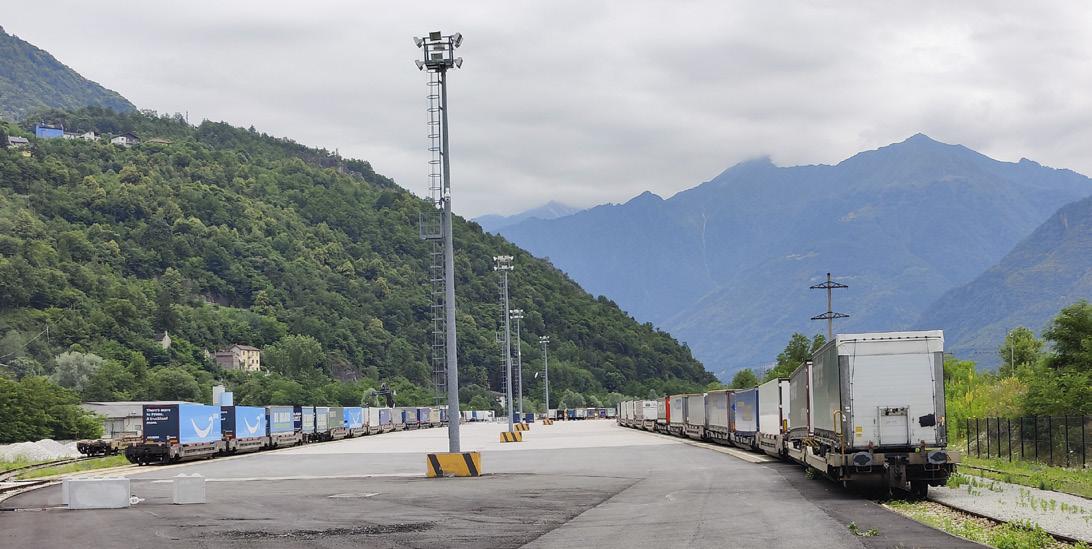
The expansion of the frequency on our historically strongest line Kaldenkirchen – Domodossola is another step in growing our market share for transports between the Germany/Benelux area and Italy. The new schedule of 17 weekly rotations reflects our ambition and commitment to the transalpine corridor. In parallel to the new frequency, we are working on expanding Kaldenkirchen and Domodossola into important cornerstones of our network as state-ofthe-art CargoBeamer terminals with high capacities.
Nicolas Albrecht , Chief Executive Officer, CargoBeamer5 SEPTEMBER 2023 | Source: CARGOBEAMER
The transportation of large, heavy, high-value or critical (to the project they are intended for) pieces of equipment.
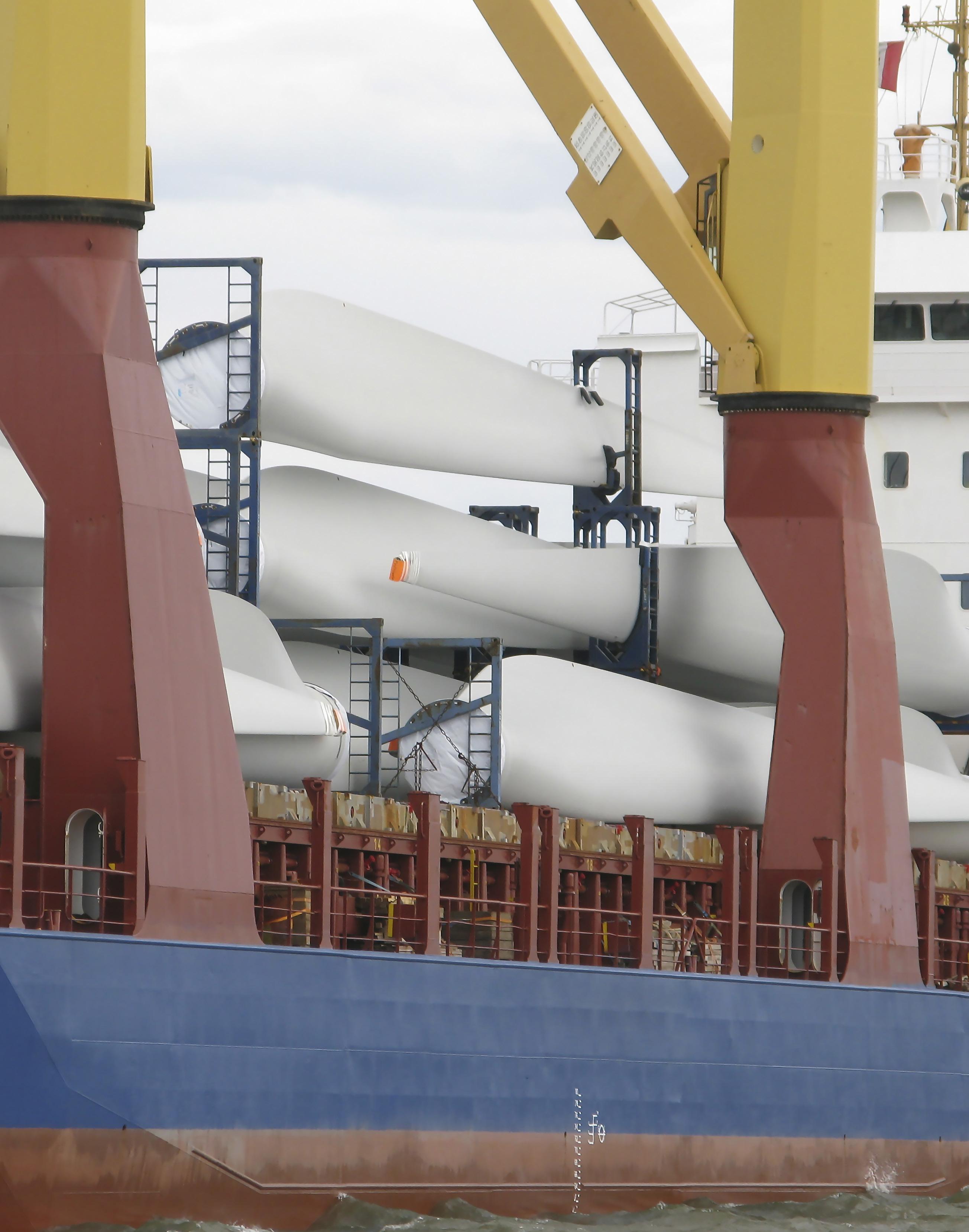
Related topics
Heavy lift
Abnormal load
OOG (out of gauge)
Sponsored by
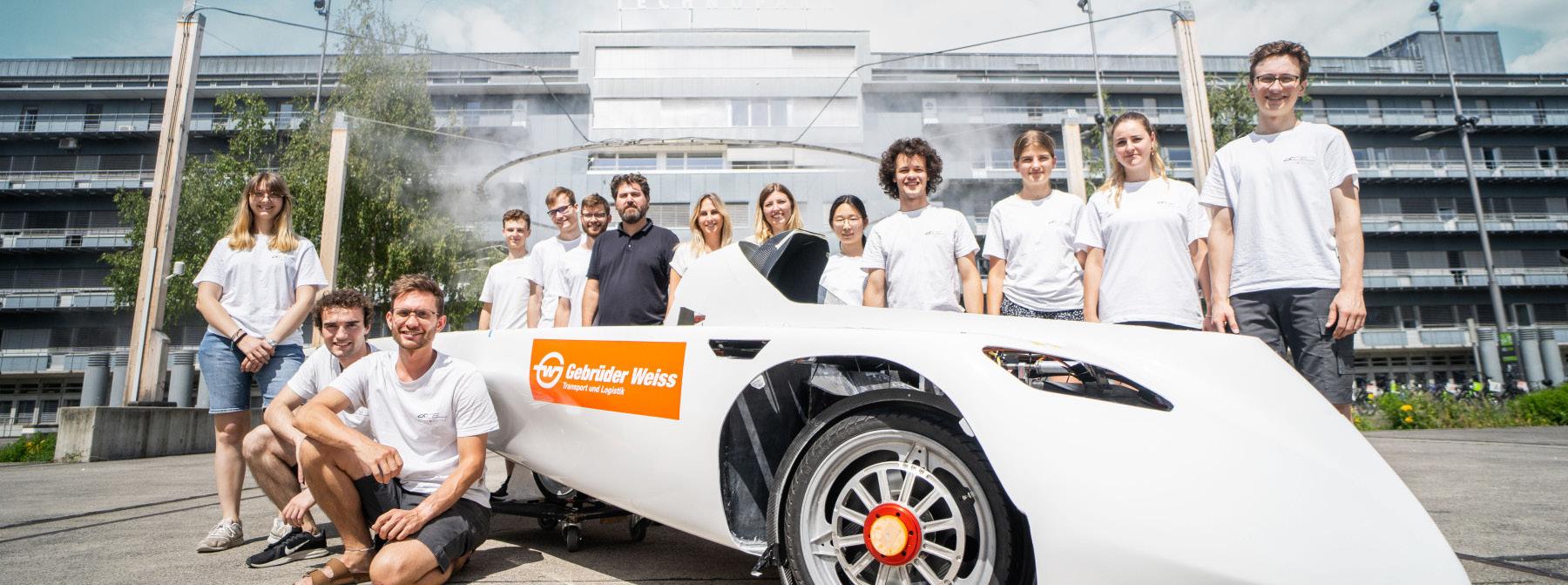
The international logistics company Gebrüder Weiss takes charge of transporting an innovative solar car to Australia for the aCentauri Solar Racing Team of Eidgenössische Technische Hochschule Zurich (ETH). This is where the World Solar Challenge will begin at the end of October 2023. This unique race sees 31 teams cover the vast 3,000 kilometres from Darwin across the Australian outback to Adelaide using solar power alone.
To ensure that the high-tech vehicle can be on its marks on time at the other end of the world, Gebrüder Weiss delivers a customised mix of logistics covering land transport, sea and air freight.
Our position as a global logistics company means we are a driver of intelligent transport solutions, actively shaping the mobility of tomorrow. aCentauri’s solar car is a trendsetter with the potential to revolutionise the transport sector, which is why we are supporting the team on their journey to Australia.
Frank Haas, Head of Corporate Brand Strategy & Communications, Gebrüder WeissThe students have been working on the development and implementation of this solar car for nearly a year. Designed for durability and maximum energy efficiency, it is emblematic of a future in which the environment takes centre stage. Of course, we would like to win the race. But what is equally important to us is taking an active role in developing efficient, environmentally sound solutions. With the support of Gebrüder Weiss, we can demonstrate that solar-powered cars and, by extension, sustainable mobility, are possible.
Alexandr Ebnöther, team manager, aCentauriThere is particular focus at the moment on alternative drives at Gebrüder Weiss. For example, aCentauri’s solar car is covering the first leg of its journey on the logistic company’s zero-emission hydrogen truck.
Collett & Sons, leading heavy transport specialists, have successfully delivered two 160Te inlet valves to Dinorwig HydroPower Station as part of an essential upgrade scheme.
Working on behalf of Rhenus Project Logistics, Collett has completed the first two deliveries of the project, a significant accomplishment marking a crucial milestone in the ongoing upgrade project, aimed at extending the power station's operational lifespan for the decades ahead.
A total of six valves will be delivered to complete the project, with each valve weighing 160Te and measuring 5.3m(L) x 4.7m(W) x 3.7m(H).
Prior to deliveries, meticulous preliminary works were completed by Collett’s dedicated Project Management and Consulting departments. This included Swept Path Analysis (SPA) reports, lashing calculations and plans, stability calculations, as well as a comprehensive test run and route studies. During the test run, a load replicating the exact size and shape of the valves was constructed to ensure safe transportation.
The first two inlet valves arrived at the Port of Penrhyn, located East of Bangor, North Wales. Working under CPA Contract Lift Conditions, Collett discharged both valves from the vessel using an 800Te mobile crane. Ensuring secure transport, each valve was carefully lashed onto two 10-axle modular trailers.

The journey from the port to Dinorwig Hydro-Electric Power Station encompassed approximately 12 miles, with a travelling time of 3 hours. Throughout the transport, a comprehensive support system was in place, including full police escorts and Collett’s own escort vehicles. The loaded trailers were accompanied by three 8x4 ballasted tractor units, two primary and one in support. Special Order BE16 Permits were obtained by Collett’s Permit Team to facilitate the move.
Upon arrival at the power station, the two main inlet valves were directly transported to a designated storage area and lowered onto stools. After later preparation, the valves were transported into the mountain and offloaded by overhead gantry cranes.
Dinorwig Hydro-Electric Power Station, located near Llanberis in the Snowdonia National Park, is the largest pumped hydroelectric storage facility in the UK. With a maximum power supply of 1,728MW and a storage capacity of approximately 10GWh, the station efficiently manages water between the Marchlyn Mawr reservoir and the Llyn Peris Lake to generate power as needed.
Kamor helped EXG in streamlining the local services, and assured that the documentation was arranged in an orderly fashion. They also made sure the cargo was swiftly loaded and adequately secured before all containers were brought to the carrier’s local depot.
Kamor were pleased to work with EXG, and hope to develop more opportunities in the future, relying on the mutual PCN affiliation and our proven record of successful conduct.
Kamor Logistics are pleased to report on a shipment they recently completed with fellow PCN member, Express Global Logistics (EXG)
Kamor Logistics were approached by Express Global Logistics who asked them to assist with the local operations in Israel for a shipment of one of EXG's clients who is building a water-desalination plant in India, sourcing the components from a leading Israeli producer.
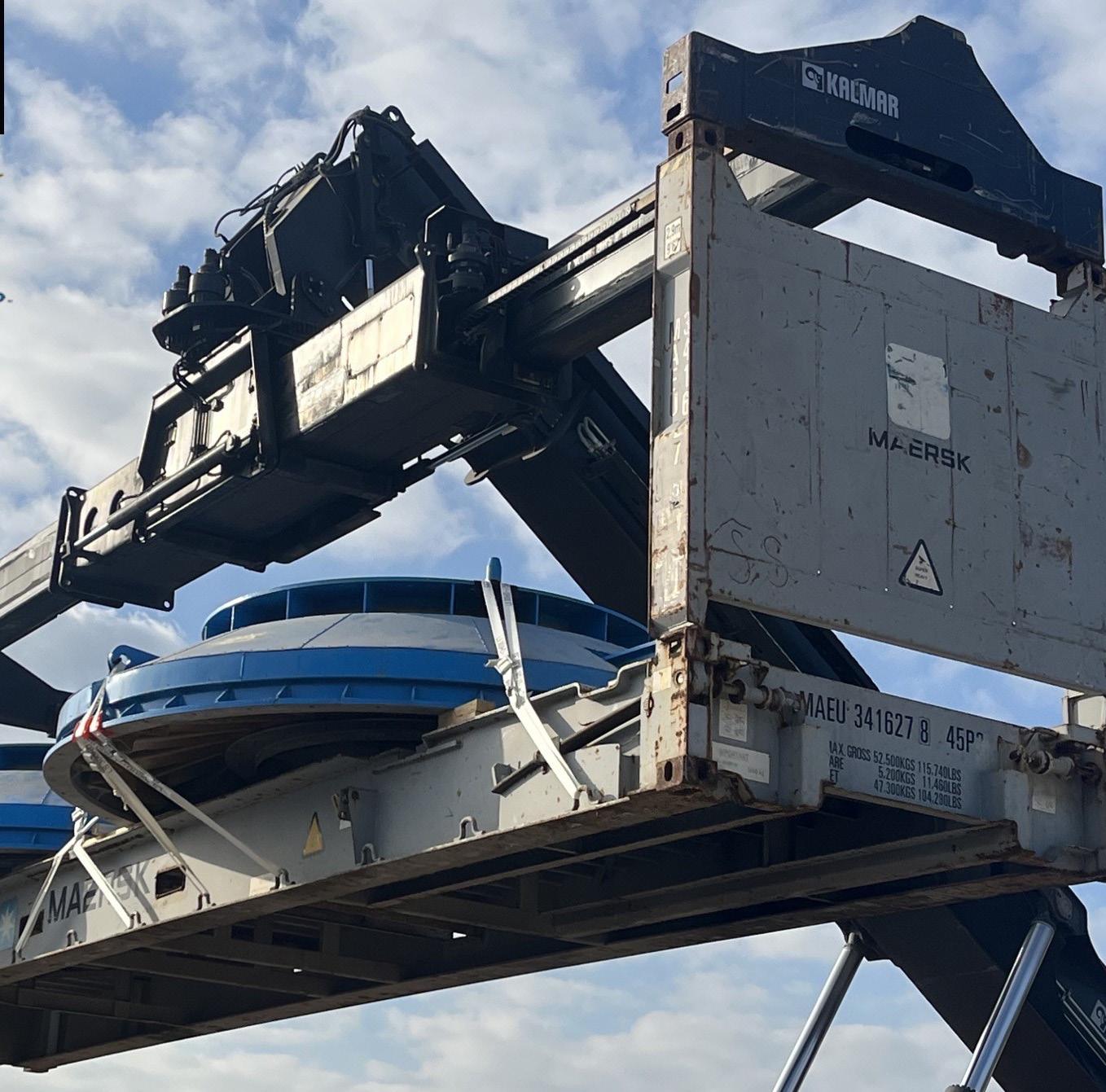
The cargo included various components for the desalination facility. This was shipped using 4 x 40’ OOG FR and 3 x 40’ HC containers from Haifa to Tuticorin.
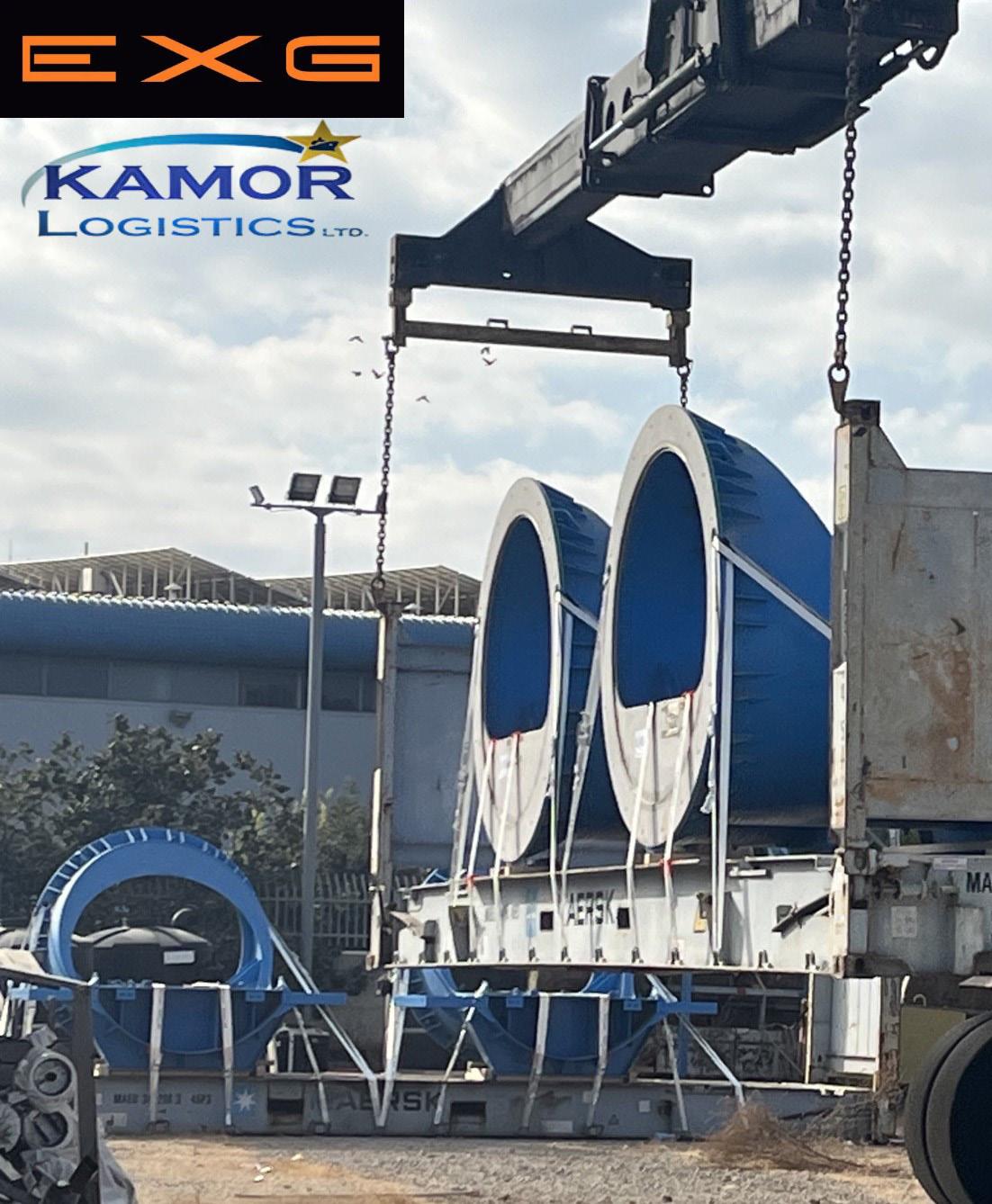
Kerry Logistics launches new services in Aberdeen, further expanding its UK network. Operating under the brand of ‘Kerry Project Logistics’, and with newly appointed UK Industrial Projects Director Keith Sinclair leading the charge, the move strengthens their presence in the northern region of the UK. Commenting on the news, Dave Gaughan UK Managing Director, Kerry Logistics said Aberdeen’s strategic location and thriving industrial sector make it a key addition to our network, enabling us to provide even more efficient and comprehensive logistics solutions to our clients. Our commitment to delivering excellence in project logistics remains unwavering, and this expansion marks another significant step forward in our mission to serve our customers’ evolving needs across the UK and beyond.
As the project arm of Kerry Logistics, Kerry Projects Logistics specialises in large scale and complex projects and re-supplying logistics, proposing integrated solutions designed for specific industry verticals: Oil & Gas, Renewables & Power, Chemicals & Petrochemicals, Mining, Construction & Infrastructures.
With the strength of over 500 Project Specialists in over 45 countries, we have attained over 180 Projects.
Over the years we have gained a reputation for transporting project cargo over landlocked and rough terrain. Besides freight forwarding, we offer warehousing and pre-shipment inspections, post order expediting, site surveys, feasibility studies and engineering services. We provide pre-project phase consultancy as part of Kerry Project Logistics’ value-added services.
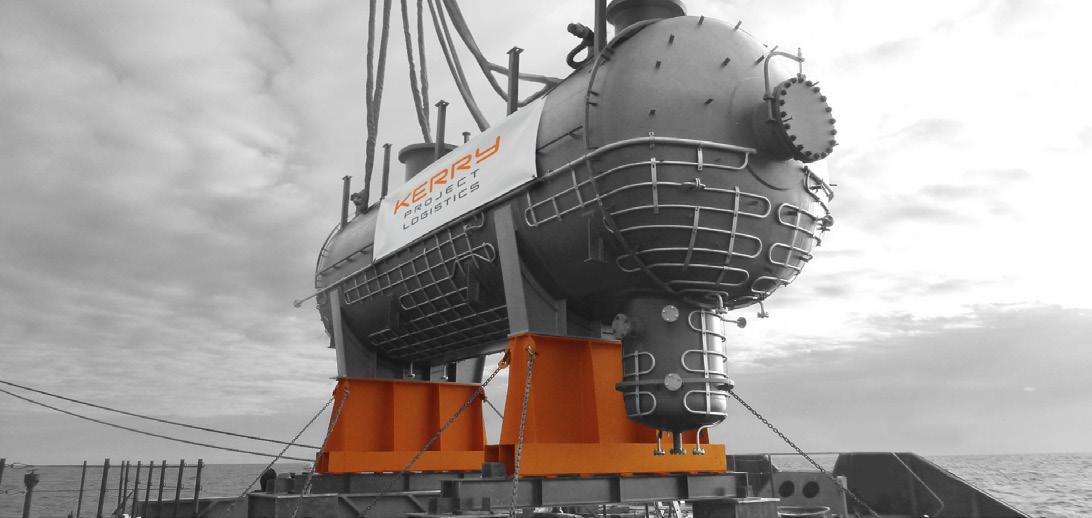
Kerry Project Logistics’ mission is to provide our customers with high quality logistics solutions on a global scale, in support with their project and re-supply requirements.
We aim to integrate all the skills and services required by the supply chains of industrial projects or re-supply logistics through tailor made solutions.

We offer a wide range of value-added services which provides a one-stop shop to our clients’ projects teams. Our customer driven, agile and flexible teams are used to working in remote and challenging areas where they strive to develop a sound and sustainable local content. Our teams deliver safely, on time and on budget with the highest ethics and QHSSE standards.
Clients rely on our expertise and experience to develop strategies and innovative solutions from the projects early stages. This enables integration with our customer’s tendering, projects, procurement and logistics teams.
During the operational life of the asset, Kerry Project Logistics also assists our customers with sometimes highly complex supply chain management related to the ongoing repair and maintenance spares, required to ensure production continuity.
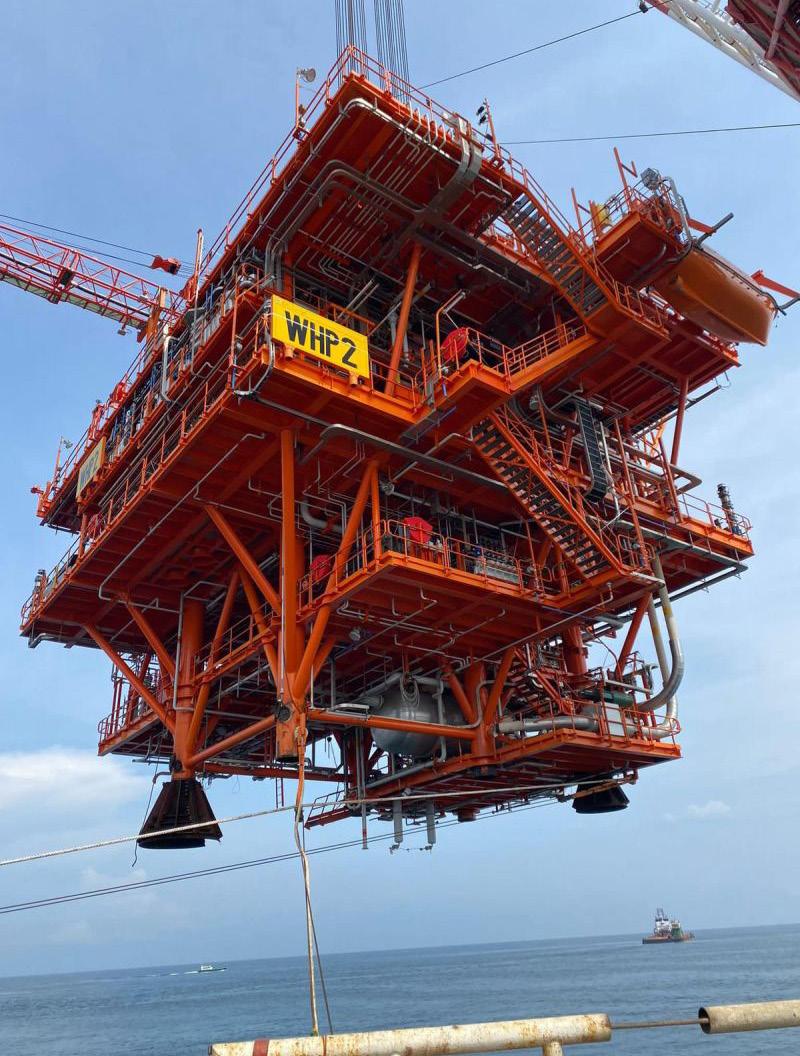
Our objective is to offer more than just freight forwarding and be seen as a strategic partner that provides specific and innovative logistics solutions to our customers. For more information or to speak with one of our Project Specialists email contact.uk@kerrylogistics.com or call 0161 873 8777

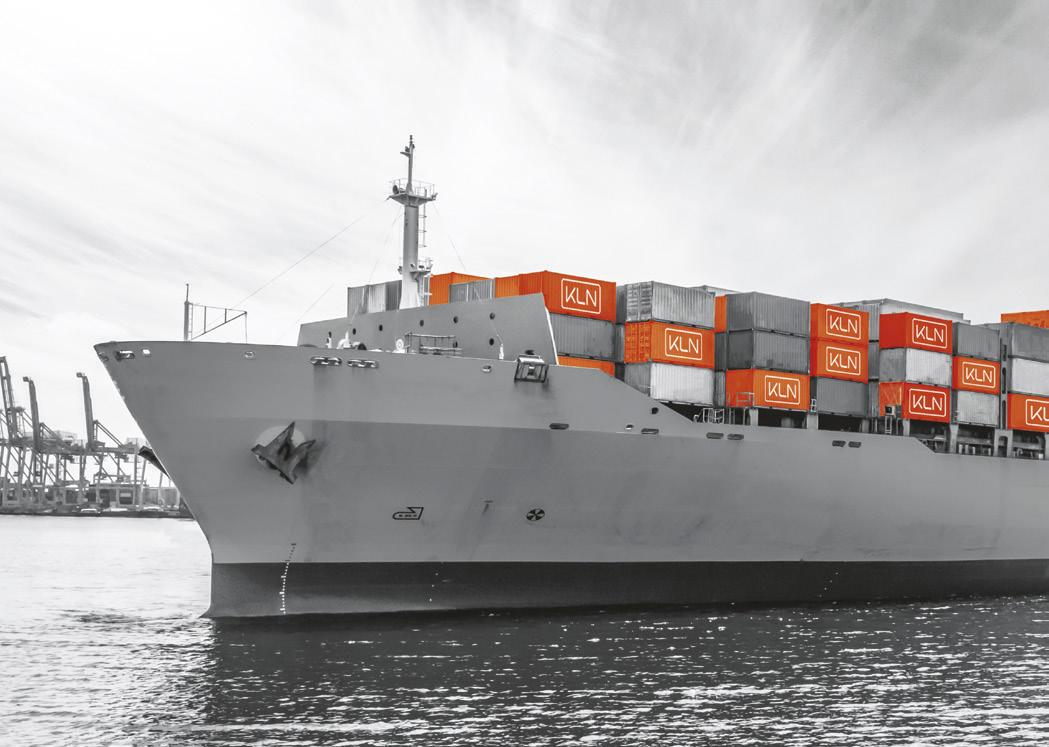
• Seafreight
• Airfreight

• Sea-Air
• Road
• Rail
• Warehousing
• Supply Chain Solutions
• Integrated Logistics
PCN Members, EZ Link in Taiwan and Fortune International Transport in Italy recently executed the OOG shipment of a yacht together.
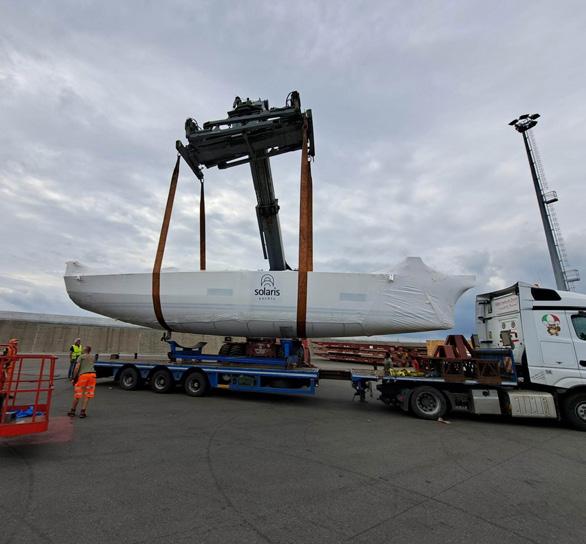
Fortune International Transport handled the ex-works service from the site to Savona Port in Italy where the cargo was loaded to a RO/ RO vessel.

An extendable trailer was used for inland haulage in both Italy and Taiwan and 62' and 40' MAFIs were used for shipping.
Suitable cranes were utilised for the loading and unloading operations with the cooperation of professional longshoreman to move the cargo from truck to MAFI at Savona port and from MAFI to trailer at Taipei Port.
After the cargo discharge at Taipei Port, EZ Link coordinated the door delivery to the final destination at Anping Port. They arranged for the cargo to be loaded onto a low bed trailer, and acquired road permits due to the oversized dimensions of the yacht's main body.
Thanks to the great cooperation & communication between EZ Link and Fortune, our clients in Taiwan and Italy have been satisfied with the 'timely and reliable service' offered, as always.
Gebrüder Weiss recently completed a challenging project which involved four breakbulk shipments. The cargo involved ten tanks, each measuring 23.0 (H) x 4.6 (W) meters with a total volume of 2,500 CBM.
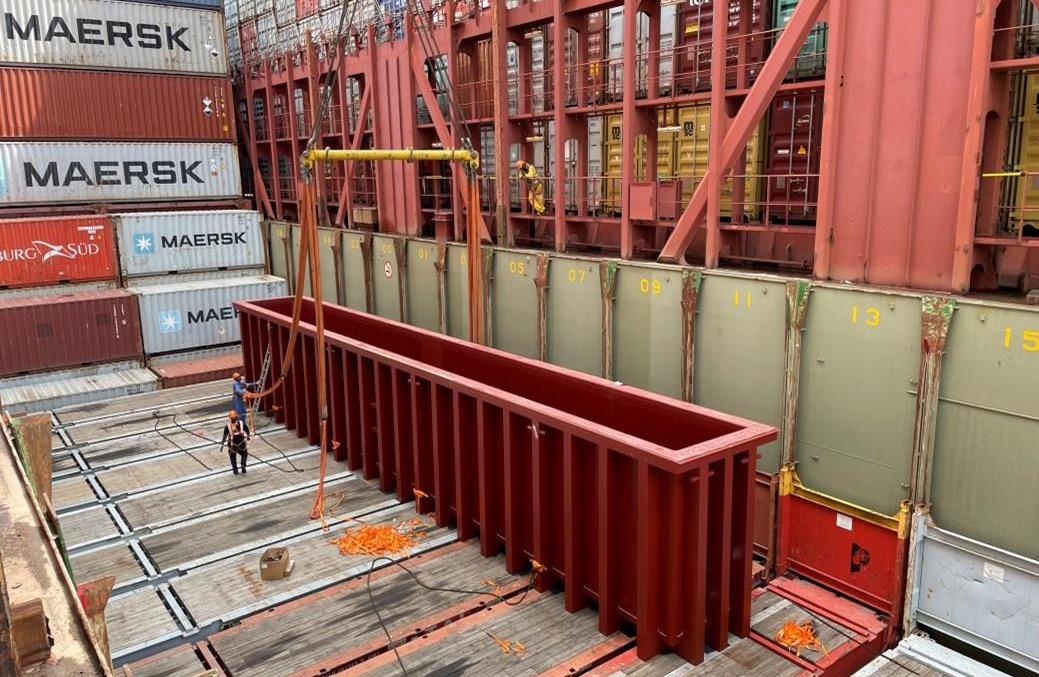
These tanks travelled on container vessels from Europe via transshipment in Singapore to Brisbane, Australia.
We planned this transport for more than a year, but once started it ran without any problems.
Logistics Plus recently handled a project shipment involving industrial equipment from India to Turkiye. The company shipped bundles of industrial air-cooling heat exchangers, with dimensions of 13.0 (L) x 2.43 (W) x 1.90 (H) meters, and a weight of 16.7 tons for each bundle. This totalled approximately 800 CBM of cargo volume and 200 tons of weight.
Each bundle was handled carefully with cargo safety being their top priority. The bundles were stacked and loaded on 12 x 40' flatbeds, ensuring that all four hooking points of the containers remained free for lifting and loading onto the vessel.
Irrespective of bad weather conditions, and a heavy storm near the port of loading, our team successfully completed their operation well in-time.
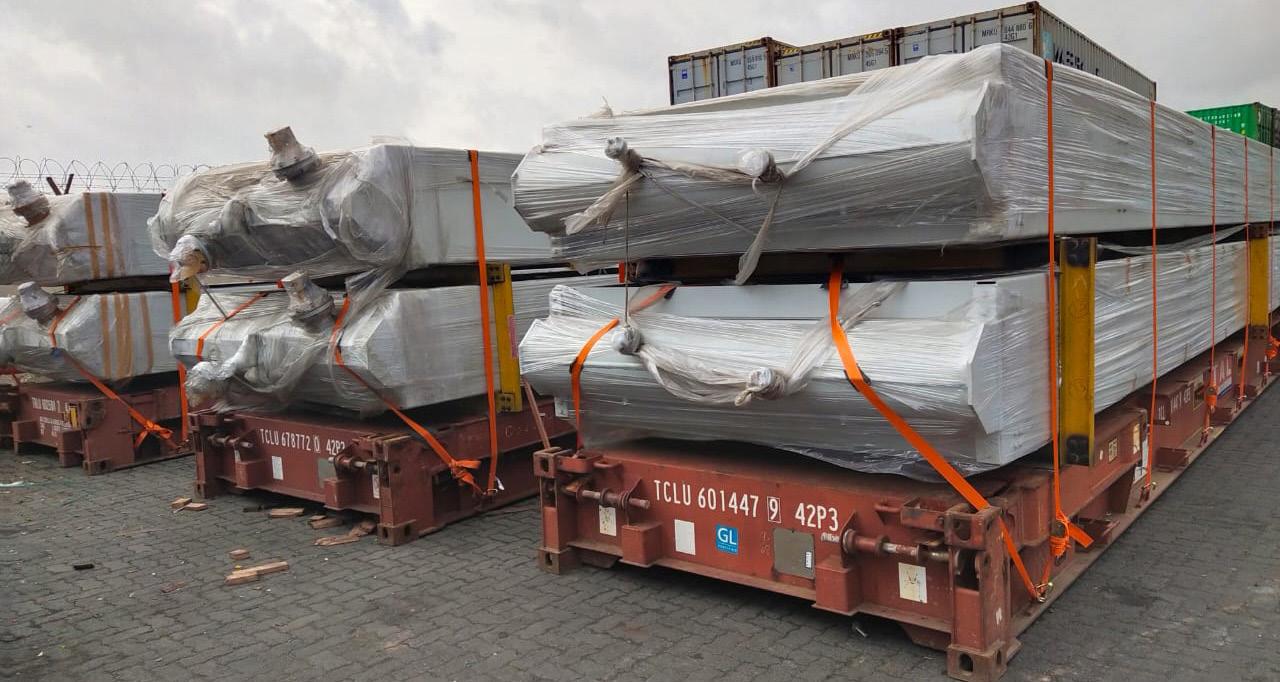
Any place where goods are allowed to pass, by water or land, into and out of a country and where customs officers are stationed to inspect or appraise imported goods | logistics hubs where goods are stored under ideal conditions, for onward distribution.
Related topics
Cargo handling
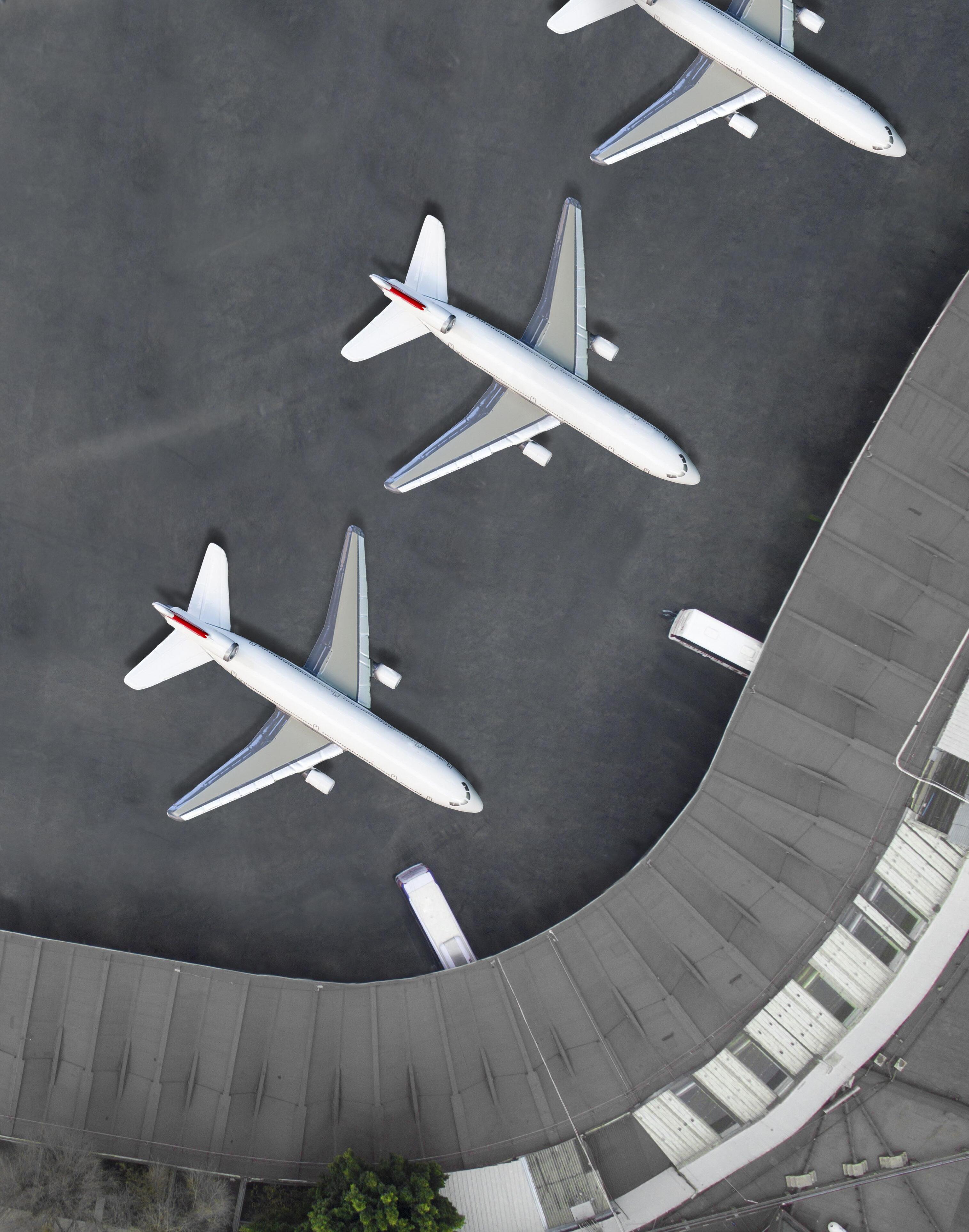
Container terminals
Drayage
Warehousing
Pick ‘n’ pack
Sponsored by

Nokia deploys a private 4.9G/LTE wireless network for Husky Terminal and Stevedoring at its 115-acre yard in the Port of Tacoma, Tacoma, Washington
Nokia today announced it has deployed a private wireless network for Husky Terminal and Stevedoring, a terminal operator and stevedoring company based at the US Port of Tacoma, Tacoma, Washington. The deployment of secure, low latency private wireless connectivity allows Husky Terminal to concentrate on reinventing marine freight operations using innovative digital technologies to exceed customer expectations.
Nokia deployed the private 4.9G/LTE wireless network to support Husky Terminal’s upgrade to a cloud-based terminal operating system (TOS), allowing the company to manage and coordinate terminal operations from anywhere. The network, which leverages Nokia Digital Automation Cloud (DAC), has removed the reliability and capacity issues that the company had previously experienced using traditional Wi-Fi with its previous TOS. Husky Terminal is now supported by robust, resilient, and secure low latency connectivity across its 115+ acre container yard, which has been achieved in a network footprint using 91 percent less hardware.
In fact, coverage was enabled through the deployment of six 4.9G/ LTE antennas in four access point locations, compared to the 39 Wi-Fi access points required to cover the same area, thereby reducing the amount of fiber required at the site, as well as other operational costs. With over 40 yard trucks now connected, Husky Terminal can monitor them to aid worker activities. It is also now investigating use cases that will leverage private wireless to further enhance operations for its customers and teams.
The deployment of Nokia private LTE was a significant milestone for us at the Port of Tacoma and has exceeded our expectations. The regular disconnections and packet loss that we experienced over Wi-Fi, that created downtime and impacted productivity, are now a thing of the past. With reliability no longer a concern, we’ve moved from firefighting mode to focusing on the strategic use cases that will further enhance operations for our customers as well as our teams working at the port.
Philip Styf, Director of IT, Husky TerminalIndustrial-grade Nokia Private Wireless networks are the cornerstone of the digital transformation journey at ports. We worked in close collaboration with Husky Terminal to design and deliver a private 4.9G/LTE network that satisfied their need for robust reliable connectivity. The industrial-grade Nokia DAC digitalization platform will be critical as Husky Terminal evolves its modernization plans at the Port of Tacoma.
David de Lancelloti, VP, Enterprise Campus Edge Business at NokiaNokia has deployed mission-critical networks to more than 2,600 leading enterprise customers in the transportation, energy, large enterprise, manufacturing, web scale and public sector segments around the globe. We have also extended our expertise to more than 635 private wireless customers worldwide.
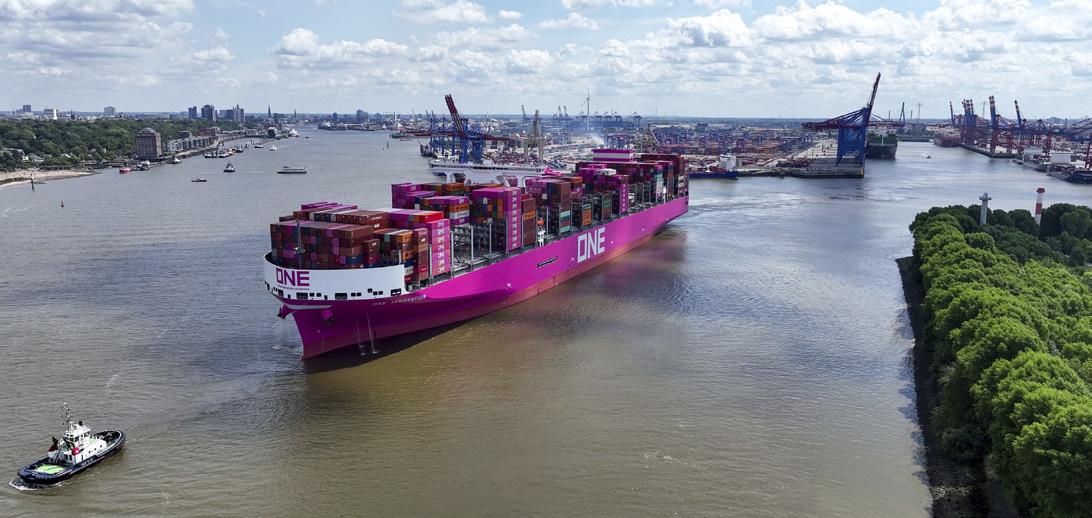
Both the tense economic situation in Europe, especially in Germany, and background geopolitical factors continue to have repercussions on throughput in the Port of Hamburg. Despite these, Germany’s largest seaport can record a gain of 7.7 percent in bulk cargo throughput at 19 million tonnes. First-half general cargo throughput was 11.1 percent lower at 39.2 million tonnes. Terminal operators in the Port of Hamburg handled 58.2 million tonnes of seaborne cargoes were handled by terminal operators in the Port of Hamburg on the seaward side., orThis is a reduction of 5.8 percent less in comparisoned to the same period of the previous year. As one of the world’s largest rail ports, landward hinterland throughput is a significant aspect. With tonnage totalling 23.1 million tonnes, 2.1 percent lower, rail almost maintained transport volume there.
On a comparison with other North Sea ports in the North Range, it is absolutely clear that all players in this market are subject to the same tough prevailing circumstances.
Axel Mattern, CEO, HHM – Port of Hamburg MarketingContainer handling in the Port of Hamburg improved in every month of the first half. In June, it was 10.2 percent higher than in January. Comparison of the first two quarters indicates a 4.6 percent rise in container throughput. As a rule, growth rates in this period are of around 0.6 percent. In total, 3.8 million TEU crossed the quaywalls then, a fall of 11.7 percent in comparison with the same period of the previous year. Container throughput on a tonnage basis totalled 38.7 million tonnes, being 10.8 percent lower.
The positive trend in bulk cargoes was attributable to all sectors. With 3.5 million tonnes handled, agribulk achieved a first-half increase of 18.6 percent. Up 18.1 percent and 5.3 million tonnes, the trend in throughput of liquid cargoes was similarly positive, while grab cargoes at 10.2 million tonnes were at almost the previous level.
Traditionally, China heads the Top Ten list of trading partners and with 1.1 million TEU, the country retained first place in the first half year of 2023. Positive developments are evident in trade with further markets, for example in America . The USA continues to take second place among the Port of Hamburg’ trading partners, and was able to further consolidate this its position with a 7.4 percent increase, and throughput of 313,000 TEU. Canada advanced by 6.7 percent to 95,000 TEU. With 108,000 TEU, Central America achieved a 6.3 percent advance. It is on these routes that further growth is expected in the coming years as the Port of Hamburg develops as an energy hub. Over the next few years, it is especially on these routes that further growth can be expected in the wake of the Port of Hamburg’s expansion as an energy hub.
Especially against a background of mounting uncertainty and global upheavals, we aim to establish close trading relations with a broad spectrum of partner countries. Increased dialogue with North and South America, along with India as a significant growth market, is a highly promising indicator in that context,
Dr. Melanie Leonhard, Hamburg’s Senator of EconomicsPositive developments are also apparent in many parts of Asia. With a 9.3 percent rise in throughput on the same period of the previous year to 99,000 TEU, India achieved its best result for four years. Trade with Japan and Thailand haswas also increased. One of the Hamburg companies actively implementing this trend is packaging and digitalization specialist Deufol Group, also owner of the Wallmann Terminal.
The opportunities in foreign trade with North America and S.E. Asia are obvious to us. We are working with great commitment on expanding our intermeshed HUB solutions and infrastructures internationally, especially in North America and S.E. Asia. Our goal is to back up customers in running their project logistics more efficiently and sustainably. This positive trend is also reflected in the gratifying results on foreign trade with these regions. DEUFOL, including the Wallmann Terminal in Hamburg, is actively working on further promoting these developments, and on offering innovative and sustainable end-to2-end solutions for global heavy-lift logistics.
Dennis Hübner, CEO, DeufolThe trend towards ever larger container ships is also persisting in the Port of Hamburg. 135 vessels in the largest, Megamax class called Hamburg, representing 15.4 percent growth. Larger container ships with slot capacities of more than 10,000 TEU were also calling the Port of Hamburg more frequently again. These calls increased by 6.2 percent on the same period of the previous year. In addition, there was strong – - 31.2 percent - growth for VLCCS – Very Large Containerships with 8,000-9,999 TEU, and of 31.9 percent for traditional Panamax sizes with 4,000-5,999 TEU. Many of these vessels will in future be able to use shore-based power in the Port of Hamburg, which is thus advancing along its course towards climate neutrality.
Persistent challenging economic and geo-political circumstances do not allow firm predictions to be made on the development of throughput in the Port of Hamburg. We are assuming that at least the slightly positive trend of the second quarter will continue. How the year will develop further depends directly on the economic mood in Germany and geopolitical developments, emphasizes Axel Mattern.

Prominent Itasca high-rise accommodates corporate teams across multiple floors
Corporate teammates for supply chain solutions leader AIT Worldwide Logistics recently moved into a new global headquarters at 2 Pierce Place in Itasca, Illinois. Previously, AIT’s shared services teams were based out of multiple Itasca facilities, including 701 Rohlwing Rd., a single-story building and warehouse that had been shared with the company’s Chicago station since 1997.
According to AIT’s Chairman and CEO, Vaughn Moore, the move was spurred by the organization’s exponential growth and emergence as a global logistics powerhouse.
After more than 40 years in business, and immense expansion to more than 110 locations across Asia, Europe and North America, we’re fortifying our roots in the Chicago area. This modern, highly visible location is a true manifestation of our global brand, and it provides our corporate staff with both the space and resources they need to best support our customers and teammates around the world.
Moore added that the new location is a major investment in AIT teammates’ on-site work experience.
Working together in this state-of-the-art office space allows us to be much more collaborative, enabling faster, real-time reactions. 2 Pierce Place also provides the additional space we need to accommodate the future growth of our shared services teams.
AIT’s global headquarters occupies multiple floors of the iconic 25-story suburban tower. Standing at 395 feet, it is the second-tallest building in Illinois outside the Chicago city limits. From its modern lobby to the tenant lounge, game room and outdoor patio, 2 Pierce Place offers popular on-site amenities, including a fitness center, walking trail, a fullservice deli serving breakfast and lunch, grab-and-go dining options, and on-site catering services.
Team members from accounting, claims, finance, global business systems, global compliance, human resources, imaging, information technology, legal and marketing are stationed on newly remodeled high-rise floors with conveniences including a private game room, coffee bars, sit-stand workstations, and multiple conference rooms equipped with state-ofthe-art audio-visual capabilities.
In the coming months, the remaining Chicago area AIT teams in Itasca and Wood Dale (including dedicated food logistics and life sciences locations) are planning to move into a unified multi-service facility in the nearby suburb of Palatine. This new joint office and warehouse space is under construction. Meanwhile, AIT Truckload Solutions will continue to serve customers out of their current location at 55 W. Monroe St. in Chicago.
Conveniently located near the intersection of Interstate 290 and the Elgin-O’Hare Expressway, AIT’s new global headquarters is easily accessible from O’Hare International Airport:
2 Pierce Place, Suite 2100
Itasca, IL 60143
Tel: +1 (630) 766-8300
Worldwide Flight Services (WFS), a member of The SATS Group, is to open a fifth cargo handling terminal at Adolfo Suárez Madrid-Barajas Airport to provide additional growth capacity and secure its position as Madrid’s largest independent handling provider.
Construction of the new 6,500m2 terminal has now commenced and WFS aims to begin operations from the facility by the end of Q1 2024, increasing its total cargo facility footprint in Madrid to 17,000m2
WFS has been present in the Madrid cargo and ground handling market since 1998 and serves 39 airline customers, also providing trucking services connecting other key airports in Spain and across the EU. It has been proactively investing in its operation in Madrid for over two decades to meet customer growth at Spain’s leading cargo airport, previously adding additional facilities in 2001, 2018, and 2019. In support of its long-term commitment to the airport and its airline community, WFS has signed a 30-year lease on the new building opening in 2024, which sits on a 12,500m2 plot connected to the airport tarmac.
As with all new WFS cargo terminals, the building is being designed to incorporate the highest levels of safety, security, and customer service as well as to support WFS’ progressive digitisation and sustainability programmes. The building will offer:
• 17 landside truck and van docks for efficient cargo collections and deliveries, supported by direct and wide access from the main road to the facility
• 2 Build-up-Pallet lanes and docks
• 4 airside truck and dollies docks with tilting and 20-foot ULD handling capabilities
• A secured refrigerated cargo acceptance area
• 2-8°C and 15-25°C loose and mechanised temperature-controlled cool rooms for pharma and perishable shipments, supported by WFS’ GDP certification in Madrid
• A mechanised handling system connecting the landside and airside docks
• 4 integrated workstations with scales, and 3 loose cargo scales
• Dedicated areas for DGS, VUN, HUM, PIL and AVI special cargoes
• Optimised security systems and technologies, including 24/7 CCTV monitoring • Modern office accommodation
This new building is situated in front of the main freighter parking area and close to Terminals 4 and 4S, shortening cargo transport timings.
The new multi-user building will match WFS’ other cargo terminals in Madrid by being powered by 100% renewable energy, including energy generation by solar panels located on the roof of the facility, which will also power LED lighting, warehouse climatization, and electric battery chargers for cars and warehouse GSE. Indoor AGV (Automated Guided Vehicles) will also be introduced into the facility in the second half of 2024.
Madrid is such a strategically important cargo market as a hub for Central and South America to and from the EU and connecting the Middle and Far East markets. This new cargo terminal will help to future-proof WFS’ service offering by increasing our handling capacity by 60% for our current and future airline customers. This will enable us to accommodate strong organic growth and support the significant increase of inbound e-commerce traffic from China.
Humberto Castro, Managing Director, WFS in Spain
B&H Worldwide, the award-winning aerospace logistics provider has gained airside licences for its drivers to operate vehicles at both Auckland and Christchurch airports in New Zealand. After undertaking and passing tests which include showing a full understanding of airside driving and what to do in an emergency team members working in both cities now have airside licences.
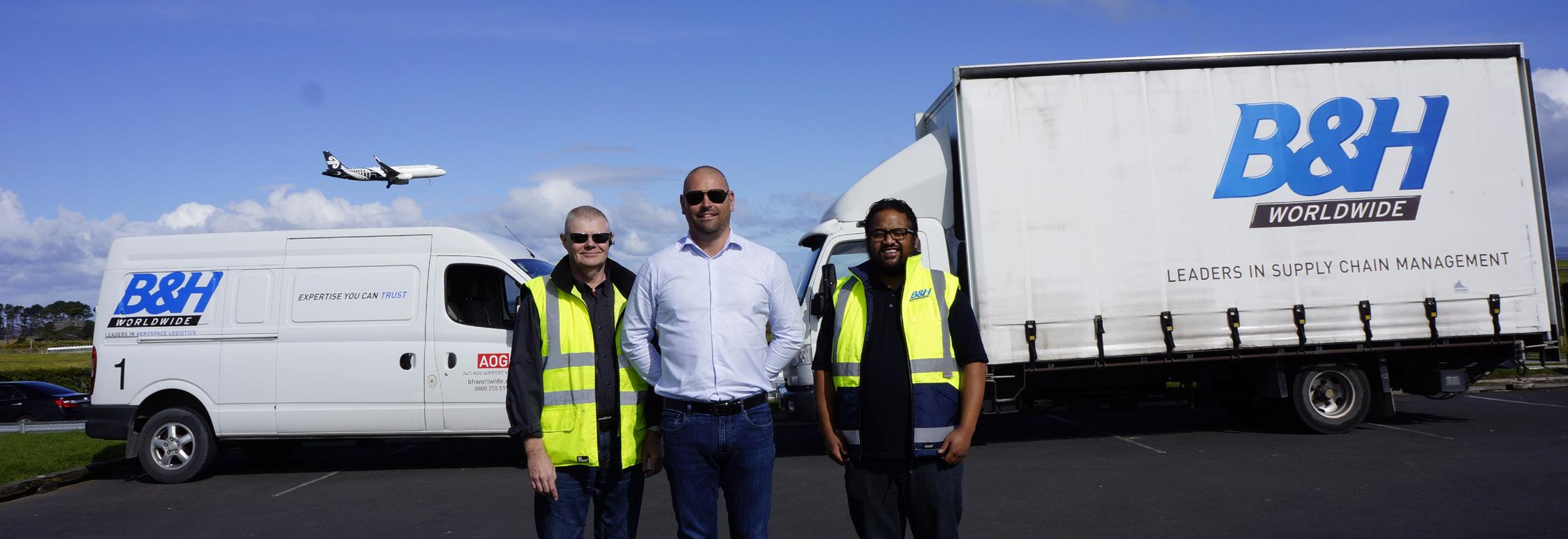
Having Airside access allows us to hand-deliver critically required components directly to line maintenance engineering teams for immediate fitment to the aircraft. As experts in aviation & aerospace logistics, B&H is one of a very few transport organisations to provide final-mile airside transport services for our airline customers and this new access means improved response times for them.
Lee
Hedges, New Zealand Branch Manager, B&H WorldwidePassing the airside exam and achieving Airside Driving Permits (ADP) means the company can now provide secure airside delivery to its airline customers’ engineers for their urgent AOG/routine delivery needs. It no longer has to rely on third party operators to provide the service. B&H’s own trucks will now operate daily at New Zealand’s two leading airports for both collections and hand deliveries, guaranteeing that line maintenance engineers receive their AOG and time-critical spares at the point of demand.
B&H Worldwide’s forward stocking locations and inventory warehousing hubs are located close to major airports around the globe which perfectly positions the company to handle its customers’ timesensitive and ad-hoc delivery needs airside. In Auckland the company will operate a 3.5t truck with tail lift, while at Christchurch a 1.5t vehicle with tail lift is operated.
Auckland and Christchurch join London Heathrow, Melbourne, Singapore and Sydney in the company roster of stations where B&H Worldwide has held airside access for many years.
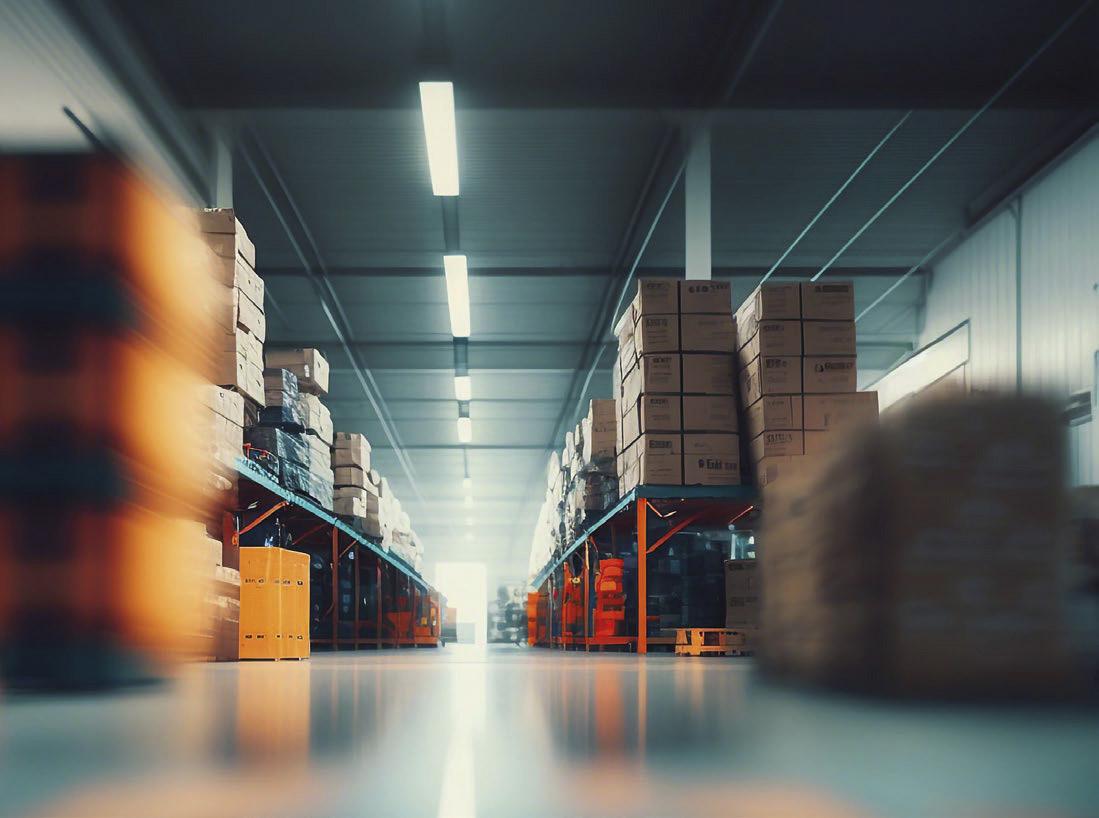
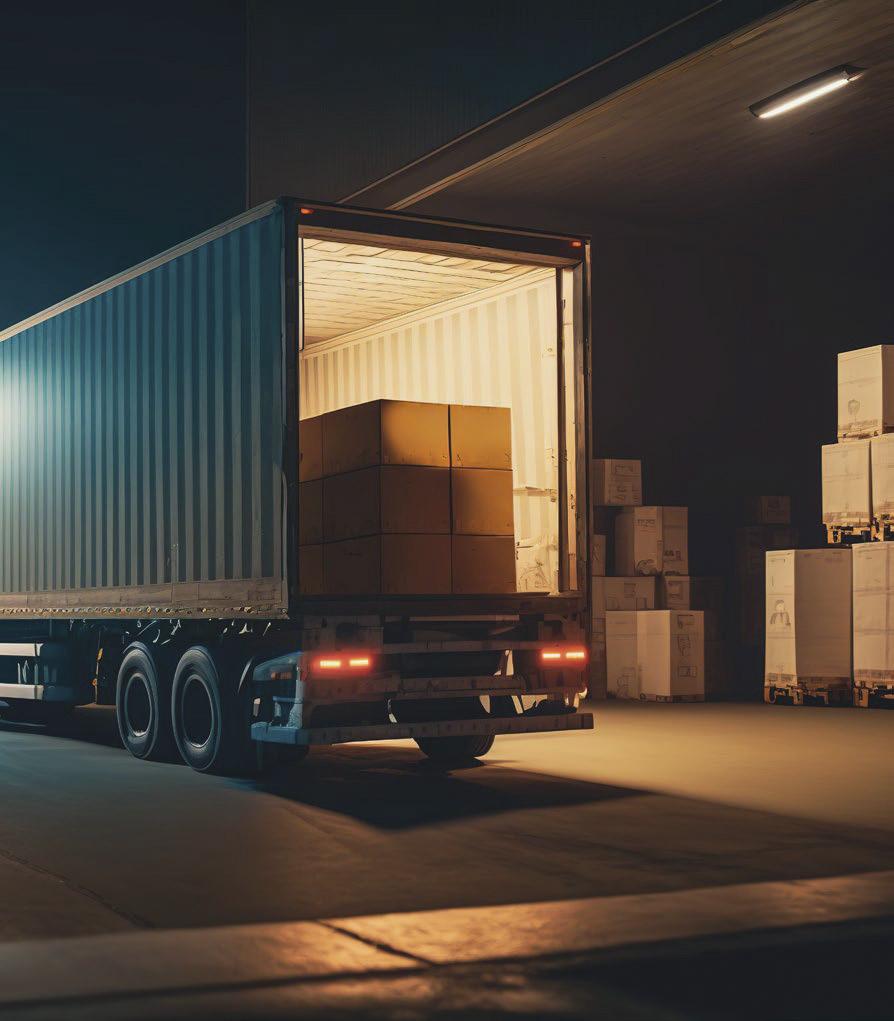

Leading transport and logistics optimisation specialist Optimize has delivered measurable efficiency gains for Welch’s Transport, a family-owned transport group based in Duxford, Cambridgeshire.
A member of Palletline, the UK’s leading palletised freight network, Welch’s is responsible for collecting and delivering goods across five counties.
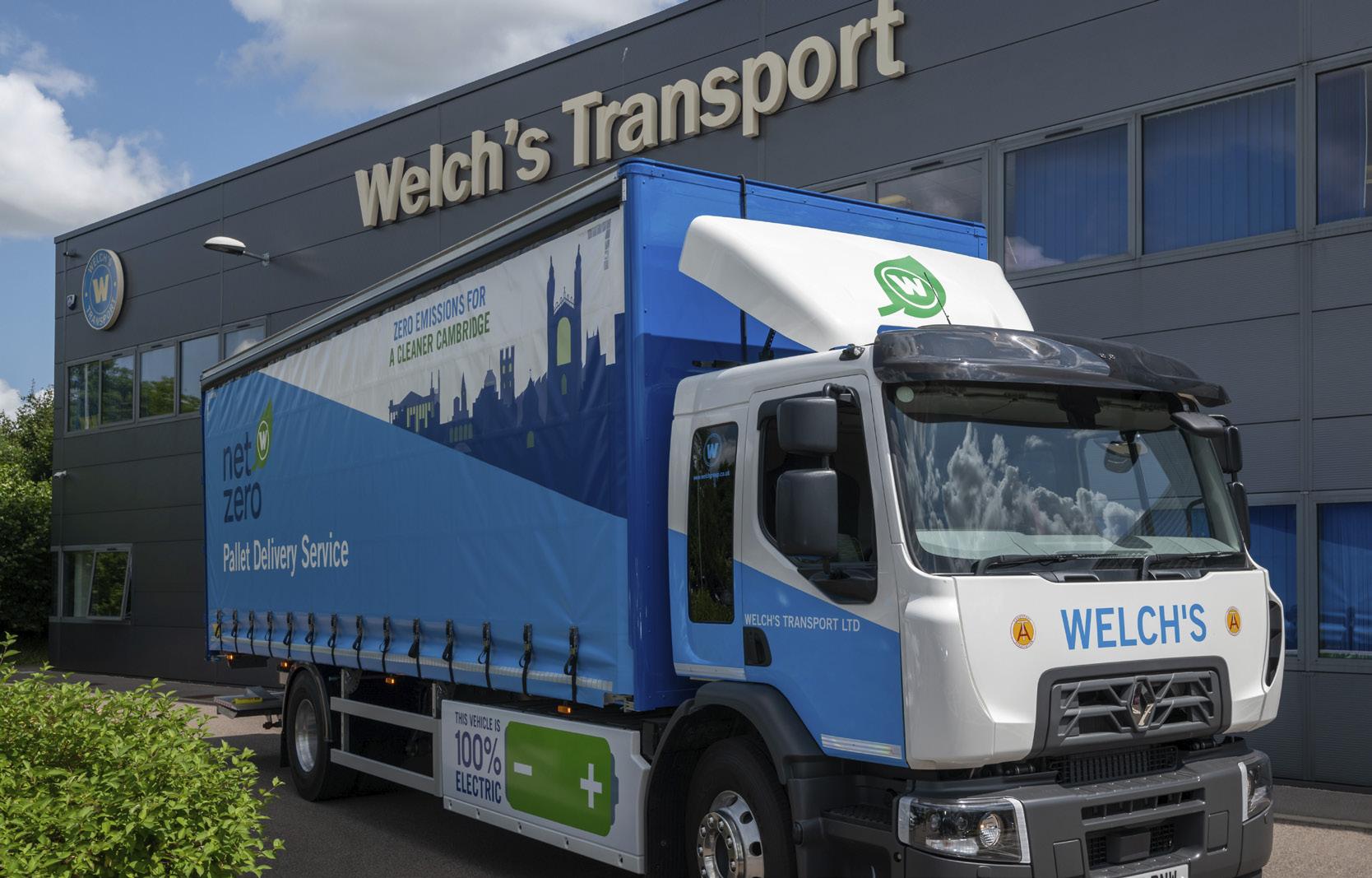
Following a successful trial which delivered a 15% reduction in mileage and emissions, Welch’s are now rolling out Optimize across its 80-vehicle fleet, which also includes electric vehicles.
Welch’s was first introduced to the Optimize technology at the beginning of 2023, and at the recent launch of Optimize’s new suite of AI based algorithms, at the Royal Institution in London.
We were very excited from the outset about the potential efficiency gains we could make with the use of the Optimize algorithms. We had tried a number of different route optimisation software systems previously but had had limited success.
Chris Welch, Commercial & Operations Director, Welch’s TransportThe Optimize algorithms work across a number of customer requirements to route and schedule fleets for maximum efficiency, and allow businesses to reduce carbon emissions, by optimising fleet productivity. Welch’s is also utilising the Optimize technology to
maximise the use of its new electric vehicles. The algorithms intelligently predict battery capability and available range to ensure full deployment of the EV vehicle fleet in the most efficient way.
We are delighted to be partnering with Welch’s Transport and working together to help optimise, decarbonise and transform the logistics sector. Through the continued use of Optimize, Welch’s Transport can expect to reduce costs, increase productivity, and cut emissions. Optimising its new electric vehicles is a clear example of the contribution we can make to the decarbonisation journey of our clients, enabling the transition to a fully zero emission fleet.
Colin Ferguson, CEO, OptimizeChris Welch concluded: One of the most appealing parts of the Optimize algorithms is its subscription model through which you only pay once a vehicle is optimised, meaning you only need to pay when a vehicle is already saving money – a win win!
Implementing automation in warehouse logistics always used to be about reducing costs and increasing throughput. However, labour shortages have meant many are adopting robots and computer vision systems to meet growing order volumes without putting extra pressure on staff. This change in warehouse infrastructure has shown that instead of automation taking jobs, the technology is crucial for improving working conditions and employee satisfaction, and in turn, overcoming staff shortages.
Dirk van Lammeren, CCO of Prime Vision, explains why automation is becoming an established method for retaining existing staff and attracting new hires in the warehouse sector
Staff shortages are nothing new in logistics. A survey of warehouse executives revealed that the number of applicants they received per job fell from between 6-10 in 2013 to 2-5 by 20181. These conditions were greatly exacerbated by the pandemic, with many workers retiring or otherwise leaving the sector. Aging populations combined with a lack of enthusiasm for warehouse work amongst younger generations has compounded the issue.
In the USA, a report by trade group MHI and consultancy Deloitte found that 57% of participants said that: “Hiring and retaining qualified workers was the biggest supply chain challenge.”2 Across the Atlantic, The Chartered Institute of Logistics and Transport (CILT) in the UK conducted a survey of its membership, discovering that 86% of companies had faced staff shortages in the past two years.3
Staff retention is another big issue. Traditionally, warehouse work has been strenuous and boring. Manually moving heavy parcels for miles every day or engaging in mind-numbing repetitive processes are not
conducive to job satisfaction. The result was high staff turnover. Hiring and training new replacements is a massive investment for a warehouse operation, and doubly difficult during a labour shortage.
All this is taking place in an era of continual e-commerce growth and its associated high order volumes. Attracting and retaining staff has become imperative for warehouse managers, as otherwise, they simply won’t have enough workers to meet demand and secure profitability. However, investing in automation is proving to be a solution.
Autonomous Mobile Robots (AMRs) are becoming a cornerstone of modern warehouse operations, moving parcels across facilities with the utmost efficiency. Furthermore, they are scalable, allowing greater room for expansion than static conveyors. As well as smoothing operations, robots are also making a large contribution to improving warehouse working conditions.
It used to be the case that Prime Vision would need to demonstrate to customers’ employees, unions and stakeholders that robots could work with staff without taking their jobs. In the past five years, perceptions have completely changed. Robots have officially become part of the team.
Robots can take on the strenuous work of moving heavy 30 to 40 kg parcels to different areas, ensuring staff aren’t subject to undue strain. Onboard light detection and ranging (LIDAR) systems allow robots to identify obstacles and personnel, safely avoiding any collisions. Stop buttons situated on the robots themselves and small devices featuring a big red stop button on operator’s wristbands offer exceptional redundancy and the ability to halt the entire system when needed. Whether segregated from staff or working in the same areas, robots actively improve safety levels and reduce the burden on staff.
Collaboration between robots and humans has been another key factor in improving the relationship with technology. There are multiple handovers in the warehouse sorting process, for example, unloading items from a delivery truck. These interactions are pivotal as they take time, incur cost and introduce risk. However, by creating an environment where humans and robots can seamlessly interface, these difficult tasks can be simplified and expedited, all while reducing risk.
Prime Vision specialises in creating environments where humans and robots can act together. These environments are invariably influenced by customer processes, local legislation and safety. Improved efficiency and greater job satisfaction are often the result of successful implementation. To some users, robots are still scary, but with proper training comes confidence and even humanisation. The staff at one of Prime Vision’s American customers has given their robots name badges, while another in the Netherlands named them after the employee of the month. This shows how employees have accepted robots as part of the crew and appreciate the benefits they offer.
Computer vision is also playing a crucial role in alleviating staff shortages and other challenges. A number of Prime Vision’s customers admit that one of the largest challenges in logistics currently is overcoming language barriers. A lot of sorting work is conducted visually, and with multinational staff communicating in different languages, it can be difficult to train them effectively.
The Flow Projector simplifies this process by reading labels and barcodes and projecting a number onto the parcel that corresponds to an action or chute. This makes it much simpler for workers to sort parcels with minimal training. As well as being 30-40% more effective than existing processes, the system also improves working conditions.
Reading or scanning labels is mind-numbing, manual work, and can be eliminated by the Flow Projector. Furthermore, the system can remove the need for problematic glasses or sweaty hand scanners for scanning items. This is important to employees. One customer reported that people clock in early to ensure they work at a chute where the Flow Projector is operational. There is a satisfaction in doing a job well, and this system incentivises and motivates staff in what would traditionally be an unengaging process.
Automation has the proven potential to improve the hard factors that help meet growing demand: efficiency, throughput and profitability. However, in the context of labour shortages, automation is also enhancing soft factors such as employee satisfaction, staff retention and working conditions.
Prime Vision’s robots and computer vision solutions are not about replacing warehouse workers. Rather, they are designed to move laborious, boring jobs to machines so that people can focus on more engaging tasks. Where machines and humans interface, work is simplified and safety improved.
Would a person rather work in an old warehouse relying on manual labour, or a modern facility featuring advanced technology and helpful robots?
Moving past the trope of achieving more with the same human resources, automation is making warehouse work more fulfilling, more meaningful and better rewarded. Ultimately, this makes it attractive to people, either keeping them in the industry or helping to recruit them for a logistics role.
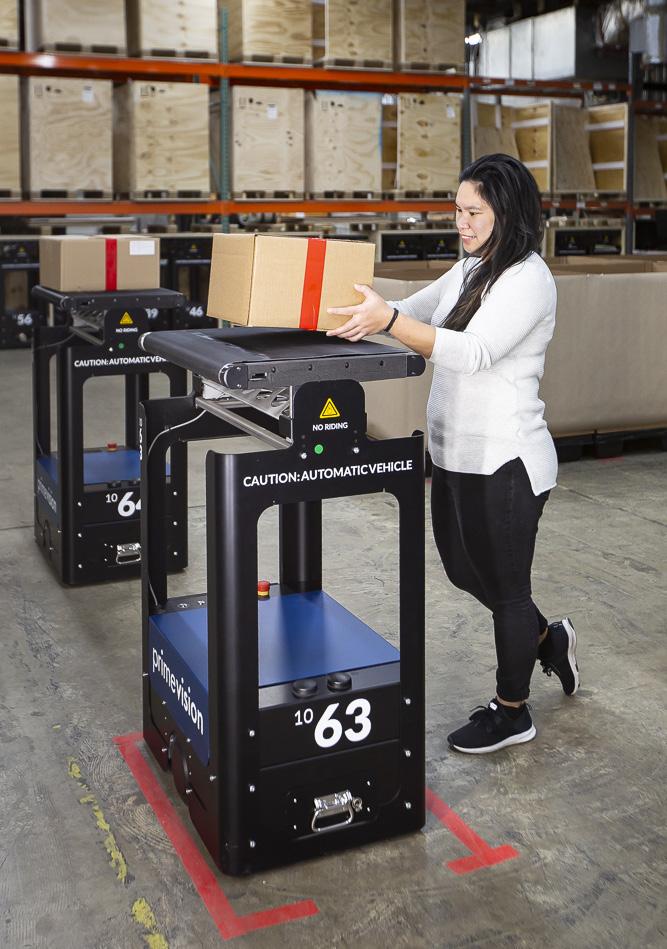
From a narrative where automation would cost people their livelihoods, the real story is how automation is providing people with new opportunities. Technical, supervisory or managerial roles that would’ve been inaccessible in a traditional warehouse are now more readily available. People are needed to supervise and service warehouse automation systems, and these are far more safe, skilled and fulfilling jobs than moving heavy items from A to B.
Existing warehouse employees are beginning to show this change in attitudes. A global study recently found that 60% of warehouse workers thought that the adoption of new technology is a change for the good4. More than improving efficiency and meeting higher volumes with less resource, automation is revolutionising warehouse work to the point where fulfilment goes beyond the orders
With labour hard to find and performance at peak under scrutiny, businesses may be tempted to opt for a complete, turnkey warehouse automation project to solve all their problems in one move. But might a stepped approach make more sense? Dan Migliozzi, Head of Sales at independent systems integrator, Invar Group, considers the options.
There can be little doubt that automation is the future for all but the smallest of warehouse operations. New affordable technologies are now within reach of most small to medium sized businesses (SMEs) and these technologies, often involving robotics and AI, are transforming performance across intralogistics processes.

Driven by poor labour availability and increasing customer demands, many businesses will be thinking about a comprehensive review of their operations, and may be tempted to go for a full turnkey approach –introducing a whole raft of systems at the same time. However, whilst this may be appropriate for some companies, others may be exposing themselves to unnecessary levels of risk, and a more considered approach could yield greater gains.
For a major corporation with the luxury of multiple warehouses or distribution centres, and facing challenges or changes to their current operational model, it may be practical, even desirable, to take facilities off-line one by one and rebuild them. For smaller businesses though, this could be a highly risky strategy and may be unviable – a considered, step-by-step approach to the end goal of significant automation may be preferable, both financially and operationally.
Financially, moving towards automation in planned stages limits the need for often significant up-front capital expenditure, a particular concern for start-ups and other companies in a phase of rapid growth when other demands on working capital can be considerable. A stepped approach that quickly takes advantage of ‘low hanging fruit’ can achieve an early Return on Investment and bring many other benefits – potentially helping to fund subsequent phases of automation.
But even if capital funding isn’t an issue, the risks of an ‘all-in’ approach are significant. Some degree of disruption is inevitable during installation, and even with the most careful planning, highest quality equipment and dedicated vendors and integrators, it’s rare for everything to work straight out of the box. The risk of a major delay or disruption could have a far-reaching impact on the business and may lead to lost sales and reputational damage.
A further consideration is, with a complete turnkey approach it’s usually not possible to revert to the old ways of working while the fixes are actioned. There is no redundancy in this situation.
So rather than playing with the entire operation in a giant sandbox, better by far to identify and address the most urgent or compelling challenges and opportunities as they arise. That way, processes can be better defined and understood, employees at all levels trained and other necessary capabilities – maintenance, for example – built up at a manageable pace.
‘Step-by-step’, however, does not mean ‘piecemeal’. The planning for a stepped migration to more automated operations is just the same as it would be for a turnkey project – indeed the ultimate goals will be just the same – it’s merely a question of how to get there.
Firstly, and obviously, the company needs to know its objectives and requirements. Is automation needed because the business is in, or is anticipating, a period of rapid growth? Growth is good, but for many companies, perhaps in a mature or niche market, higher volumes and throughputs may not be the issue – greater efficiencies, lower costs and perhaps particularly better use of scarce labour may be the imperatives.
The company needs to map and understand its processes from cradle to grave, including processes which are unlikely to be directly addressed by automation. Where are the biggest wins, the greatest challenges, the most acute pain points? Address these first – paradoxically, trying to optimise a process that you know to be already very good often carries a larger downside risk.
But the automation plan can’t just address short term issues. The business may need to consider the extent to which the automation is scaleable – can a robotic installation, for example, be scaled up for future growth just by leasing more units, or will there be a point at which the racking and other physical attributes of the warehouse require major change? And if so, should that be done now, even though it may not be needed for some years?
The plan also needs to consider the pace of technological change. Evolution in fields such as robotics is lightning-fast. There is no shame in buying last year’s model if it does the job, but there are risks that equipment and systems may become ‘obsolete’, or worse, unsupported, much quicker than expected. This means that some of the steps in the automation road map may need to cover replacing or upgrading earlier and relatively recent investment steps. Robust continuity planning, in partnership with reputable vendors and integrators, is key.

Planning a stepped approach to warehouse automation cannot be just a top down, or a bottom up, process. It really does require the involvement of every stakeholder in the business. Clearly it needs high level strategic direction to ensure that the plan is aligned with the company’s goals, its financial capacity, and its appetite for risk. Operational input – will the proposals actually meet the requirements of, for example, seasonal peaks. Engineering – does the business have, or can it expect to establish, an adequate maintenance capability or will this have to be outsourced. HR may have views on how staff can be trained, and whether new staff with new skills need to be hired.
And then there is installation. Even quite modest steps in automation are likely to involve systems and equipment from multiple manufacturers and vendors and will require some level of integration, both with each other and with existing equipment and systems. ‘Plug and play’ is a much-vaunted term, but it’s hard to find evidence that it really exists in the modern warehouse!
Therefore, it’s important to find a reliable, independent integrator that has the necessary technical capability and in-house software skills to deliver a project successfully over several planned stages – an integrator that supports you every step of the journey.
Further independent advice on transforming operational performance in the warehouse can be found at: www.Invargroup.com
Webfleet, Bridgestone’s globally trusted fleet management solution, has entered into a partnership with new e-fleet solutions provider VEV to accelerate commercial EV fleet adoption.
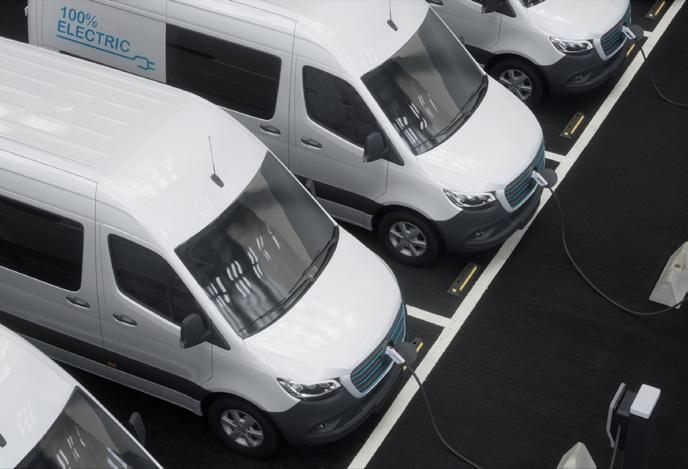
VEV provides a unique end-to end EV transition solution from EV fleet strategy through site design to operation.
As well as initial site electrification, charge point infrastructure installation and electric vehicle sourcing and financing, the company also supports ongoing EV fleet operations. Effective EV fleet management is as much about energy management and charge scheduling as managing vehicles, journeys and drivers.
Webfleet is a critical component of the electrification journey, from initial planning to in-service operational optimisation. The data is vital for VEV to optimise the design of the EV transition to avoid costly over-specification of vehicles, chargers and depot energy infrastructure. When used in-service, telematics helps fleet managers understand vehicle, driver and energy patterns to bring data-driven intelligence and ensure the most cost-effective use of energy back at the depot.
Mike Nakrani, CEO, VEVOur globally trusted fleet management solution, Webfleet, is helping businesses worldwide to achieve their sustainability ambitions, but we recognise that the solutions needed by fleets to successfully transition to zero emission vehicles come from collaboration. A spirit of teamwork is a prerequisite to a net zero future. Bridgestone Mobility Solutions is delighted to announce this agreement with VEV, a natural partnership to help meet fleet decarbonisation needs with an extended ecosystem
of data, hardware, infrastructure and services. This partnership demonstrates how much the role of the fleet manager is changing. In addition to managing vehicle operations, EV fleet managers must be able to optimise energy consumption to minimise downtime, cut charge times and optimise battery health as a critical asset.
Taco van der Leij, Vice President Webfleet Europe at Bridgestone Mobility SolutionsWebfleet telematics data will play a pivotal role in shaping initial EV strategy by confirming vehicle journey times, duration, frequency and ‘return to depot’ behaviour. It will then enable fleet managers to track range, energy consumption and mechanical status in real time.
Fleet electrification becomes exponentially more complex, so an integrator partnership is essential to cover all aspects and ensure costeffective operations across mission-critical fleets, explains Nakrani. We regularly see clients that have been upsold charge points and energy supply which they don’t need. Charge efficiency is not necessarily about the biggest battery, it’s about finding the best operational options for a particular fleet’s routes. Accurate telematics data and holistic decision-making across vehicles, charging and energy are the critical success factors.
The partnership aligns with Bridgestone’s E8 Commitment and its eight values – Energy, Ecology, Efficiency, Extension, Economy, Emotion, Ease and Empowerment – which serves as a guide for Bridgestone’s transformation into a sustainable solutions company.
alcon Tag and Innovate UK have partnered to offer supply chain businesses a comprehensive solution combining smart labels technology and AI to optimize operations, reduce costs, minimize waste, and provide real-time data-driven insights for smarter decision-making.
Technology is already helping to rapidly change the sector, with recent insight from Statista predicting the supply chain industry is set to grow to $62 billion by 2030, an annual growth rate of 12.09%. Yet despite this growth, a study in 2022 by SAP found that nearly all UK organisations acknowledged the need for improvement within their supply chain, with a staggering 58% deeming these significant. However, such improvements would be fraught with unreliability without robust data collection.
Falcon Tag is a pioneering organization formed through a joint venture led by Project Leader Emmanuel Tchombe in partnership with AI specialists, Numvio.

Falcon Tag addresses this gap by offering companies:
• Improved operational efficiency: Reduce manual efforts and operations, streamline workflows, and eliminate time-consuming asset search processes.
• Faster Decision-Making: AI can process vast amounts of data quickly, enabling faster and more informed decision-making, which can lead to cost-effective responses to supply chain disruptions.
• Cost savings: Eliminate unnecessary purchases with stockouts or excess inventory by forecasting demand.
FFalcon Tag offers the following features:
• AI powered tracking and predictive analytics: visibility into the location and status of assets with our asset tracking technology, enables businesses to make informed decisions and optimize workflows
• Enhanced Accuracy: Automation and AI-driven processes will minimize human errors in order processing, reducing the costs associated with delays and waste
• Analytics and insights: our technology leverages powerful analytics tools to gain valuable insights, identify patterns, and streamline operations
Further improvements and features are currently under consideration based on industry feedback.
We're committed to making the transition to Falcon Tag as smooth and cost-efficient as possible, notes Emmanuel Tchombe. Our solution is designed to provide businesses the data-driven insights they need to optimize costs, minimize waste, and streamline processes. We want to make adopting our solution as simple and as efficient as possible, it is clear businesses want to enhance their efficiency and gain better insight for supply chain operations which is why we have developed Falcon Tag to ensure they gain the clarity and data-driven insights they need to save costs, reduce wastage, and increase revenue. AI is going to reshape the future of the supply chain management industry and incorporating it into our software and smart labels offers unprecedented insight and recommendations to ensure users have the tools they need to make data-driven decisions.
Organisations eager to learn about Falcon Tag or become part of this exciting project with innovate UK can contact Emmanuel at emmanuel.louis@tchombent.com
Opportunities to network and promote your services.

Related topics
Conferences
Expositions
Networking
Sponsored by
The conference at AntwerpXL, the world’s only event dedicated exclusively to breakbulk, project cargo and heavy lift, and is fast becoming a must-attend for industry professionals.
Returning to Belgium this November, AntwerpXL’s conference will cover the most pressing global themes with talks from the industry’s leading lights.

• Project Cargo – Managing the offshore renewable boom.
• Ports – Being a one-stop-shop for breakbulk.
• Sustainability – Decarbonising heavy lift.
• Current Market – How geopolitics is impacting the supply chain.
On the panel discussing the management of offshore renewables will be Neil Golding, Head of Market Intelligence at Energy Industries Council, alongside Thomas Mehl, Board Member at Claviate. Meanwhile Linda Jacques, Partner, and Lawyer at LA Marine, is set to offer deep insight on the panel examining state of the Current Market.
• Digitalisation & AI – How will AI impact the supply chain.
• Recruitment
– Making breakbulk an attractive career for new generations.
• Sustainability
– How stakeholders collaborate for supply chain sustainability.
Co-founder and COO of Voyager Portal, Bret Smart is a confirmed panellist on the session for Digitalisation and AI. The Recruitment panel includes input from previous AntwerpXL 40 Under 40 Winner and Managing Director at Trans Coral Shipping, Mahesh Singh. Panel members for Sustainability include Inge Taillieu, BDM at DP World, and Jessica Slater, Solicitor at LA Marine.
The Collins English Dictionary chose ‘permacrisis’ as the most recent Word of the Year. Every breakbulk professional can relate; the external pressure on industries like ours is immense. But necessity is the mother of innovation, both in terms of technology, but also in thinking. The AntwerpXL conference offers insight and new ideas, bringing everyone together to enhance our collective knowledge so we can tackle the challenges of the present and future. It will be utterly unmissable!
Margaret Dunn, Portfolio Director, AntwerpXL
AntwerpXL returns to the Antwerp Expo, Belgium, on 28–30 Nov.
AntwerpXL is once again looking for the top forty breakbulk, project cargo and heavy lift professionals under the age of 40
XL 40 Under 40 celebrates the young professionals who have either achieved greatness already or have the potential to become the next generation of industry leaders.
Breakbulk and heavy lift pros are encouraged to nominate themselves, their colleagues and their peers if they are under the age of 40 and have made, or will make, significant contributions to the sector.
Nominations will be open throughout the summer, then a panel of industry experts will decide who will make AntwerpXL’s official 40 Under 40. Winners will receive VIP status at AntwerpXL in November where a special drinks reception and networking event will be held in their honour.

AntwerpXL is a forward-looking event, showcasing the latest innovations and new ideas that will help the industry navigate the challenges of tomorrow. But tech and talk mean nothing without people to lead the industry. The continued success of the sector is dependent on the next generation of talented professionals. XL 40 Under 40 is designed to identify and celebrate the young professionals who are sure to steer the ship from critical leadership roles in the near future. The judges will be looking for people who, thanks to their excellence and commitment, are making a real difference to their organisation or to the wider industry. If this sounds like you, nominate yourself. If this sounds like a friend or colleague of yours, nominate them.
Margaret Dunn, Portfolio Director, AntwerpXLTo find out more about Antwerp XL or to nominate yourself or a colleague, visit www.antwerpxl.com/visit/whats-on/40-under-40
Palletline, the UK’s leading palletised freight distribution network, celebrated the outstanding achievements of its members during its Annual Awards Dinner at The Belfry Hotel & Resort in Sutton Coldfield. The event saw seven prestigious awards presented to deserving Palletline members, recognising their success throughout 2022.
The Palletline Annual Awards highlight the network's dedication to excellence and celebrate members which have gone above and beyond in their respective categories. The winners not only demonstrated unparalleled dedication but have also significantly contributed to elevating standards within the logistics sector.
Palletline’s headline category, Member of the Year – voted for by members – went to Stephen Sanderson Transport. Sanderson was praised for encompassing all the principles of partnership as detailed in the Palletline Charter, providing honest and respectful communication and demonstrating accountability for service and quality. Above all, providing support to the membership and offering a genuine partnership.
Bradford-based Expect Distribution was this year’s winner of the Health and Safety Award. Operating from four sites across West Yorkshire, incorporating over 600,000 ft2, Expect employs more than 350 staff and operates a 140-strong fleet. A shareholding founder member of Palletline and one of the largest inputting and outputting members, its directors and management team pride themselves on outstanding operations, with the safety of all employees, customers and the general public paramount.
Miniclipper Logistics won the network’s first CSR Champion Award in recognition of the company’s efforts to reduce its impact on the environment, support its local community and give back to local charities. Miniclipper’s award entry detailed its approach to reducing CO2 emissions and fuel consumption, reducing energy usage and waste, improving driver recruitment and retention, ensuring diversity and maintaining ethical standards across its partnerships.
The company also supports a wealth of charities, local sports clubs and community organisations, taking an active role in its local community.
This year’s Outstanding Commitment Award went to Shepherd Distribution. Over the decades Shepherd has been a large inputter into the network and its customer services team has built excellent relationships with other members. Last year Shepherd became an employee ownership trust company, giving an already dedicated team even more of an interest in the business.
London Pallet Logistics was the winner of the Commercial Brilliance Award for its robust commercial strategy which has enabled the company to not only to proactively identify and convert new prospects but to nurture existing customers.
Axtra Expert Logistics won the highly coveted Service Excellence Award from Palletline, for the second year running, after it achieved the highest annual delivery performance results from January through to December 2022.
Palletline’s own Head of Business Information, Harpreet Sohal, and his team of data analysts won the Team of the Year Award. With their expertise the company was able to successfully plan for the post-pandemic reduction in volumes, which they forecast six months in advance. The team also worked on an extensive review of Palletline’s hub strategy, mapping out 80 to 90 different scenarios of how the business might look over the next 10 years. They are also able to predict volumes and trends and the data they provide is the drive behind the key decisions made by the company’s board of directors. Palletline is believed to be the only business in the pallet sector able to utilise such data in this way.
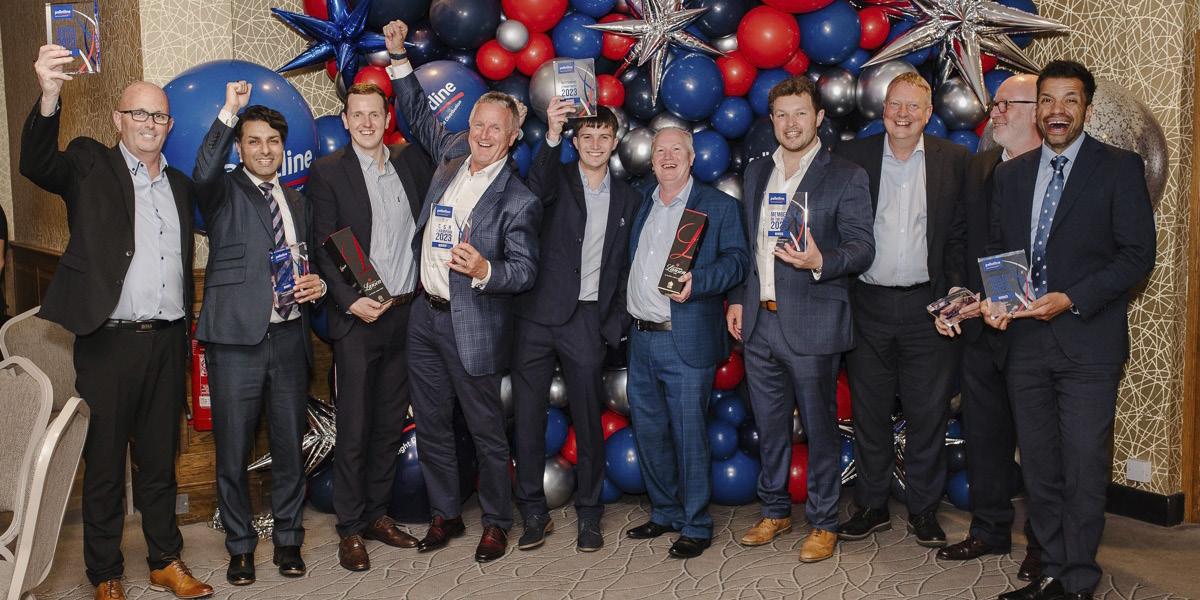
FORWARDER events, the renowned networking and business growth platform, is thrilled to announce its upcoming event at the Delta Marriott Hotel, Windsor Heathrow on October 5th, 2023. In association with Altus Group, this event is set to be the largest and most captivating FORWARDER gathering yet.
Subsequently, a delightful drinks reception accompanied by Rosie on Piano will invigorate attendees, followed by live music from Cut Throat Francis. Participants will then have the opportunity to enjoy dinner while further networking, with the evening's entertainment generously sponsored by SGS Ltd.
Kicking off promptly at 11:00 a.m., the event begins with registration, sponsored by CDN Consular, and a refreshing array of welcome refreshments, sponsored by Sarah Darby from Intercarry. At 11:45 a.m., our esteemed host will introduce key personalities, followed by Saul Campbell from Altus Group, who will commence proceedings with a thought-provoking talk on Business Rate savings.
Following this engaging session, participants will have the opportunity to engage in the first networking event of the day at 12:20 p.m., where tables will be organized around various Business Growth topics. After a brief intermission, attendees will experience the excitement of Speed Networking. The event will then break for lunch, after which Michelle Meleskie, the keynote speaker from Pledge, will share insights on Emission Tracking. The day will continue with an enlightening discussion by Nik Nicholas on The Importance of Data in the Marketing Strategy.
The business-focused portion of the event will culminate with a dynamic Panel of Business Growth experts featuring Richard Lowe from Hewlett Rand, Yafit Davies from Your Biz Dev Team, Laura Aiken of Thrive Leadership, Daniella Goodwin from Headford Group, and Nik Nicholas of Covelent.
Key sponsors at the event include Gaston Schul as Table Sponsors, Pledge as Multi-Event Sponsors, Simply Cargo as Venue Sponsors, and Macbeth Insurance as Merchandise Sponsor, providing attendees with stylish tote bags to hold their collected business cards.
Event Manager, Paul Stoneman, expressed his excitement, stating, This will be the biggest FORWARDER event yet, with an impressive lineup of speakers, exciting entertainment, esteemed sponsors, an increased number of attendees, and, most importantly, exceptional networking opportunities. I cannot wait for the event to unfold!
To secure your place at this remarkable occasion, please visit the FORWARDER events website at www.forwarder.events/tickets/ or contact the event organisers directly on 01454 275 946.
FORWARDER Events is a leading networking and business growth platform that brings together professionals from the forwarding and logistics industry. With a commitment to fostering connections, exchanging industry knowledge, and encouraging growth, FORWARDER Events hosts impactful and memorable events throughout the year.





The highly anticipated FORWARDER events LOCAL took place on 14th September 2023 at the swanky Shirehampton Golf Club in Bristol. This freight and supply chain event drew in over 40 enthusiastic delegates from various businesses across the UK, with some folks even jetting in from as far as Manchester, Basildon, and Milton Keynes.
First up was Ben Sayer, representing sponsors Commercial Property Advisors. Ben gave his take on the impact of rising business rates in the freight and supply chain sector. Next was Sanj Matharu, the Head of Partnerships at Pledge, a renowned sustainability platform. Sanj highlighted

the importance of incorporating sustainable practices into the industry. But the real showstopper was Chris Ganley, the inspirational daredevil and the UK's first upper limb amputee to race at British Superbikes. Chris shared his incredible journey, leaving everyone in awe.
Now, nestled between the speeches, FORWARDER events LOCAL cranked up the excitement with its signature Speed Networking event. Picture this: 30 meetings in 30 minutes - a whirlwind of networking magic. Alice Day from Forwardingjobs.com flawlessly ran the show, ensuring everyone had a chance to connect and swap ideas in record time. It was like speed dating, but for business!
After the networking frenzy, it was time to let loose and unwind at the drinks reception and pizza buffet. Delicious food, refreshing drinks, and a relaxed vibe set the stage for bonding and making new connections. And get this— the incredibly hospitable Forwarder team even treated six lucky clients to a post-event curry. Now that's what we call extending the fun!
We can't forget the fantastic support from Commercial Property Advisors and Sentinel Group Security, who played an instrumental role in making this event a roaring success. And let's give a shoutout to Forwarder Events Heathrow Sponsors, including the rockstars at Simplycargo Wholesale, CDN Consular, and Pledge, for amplifying the event's impact.
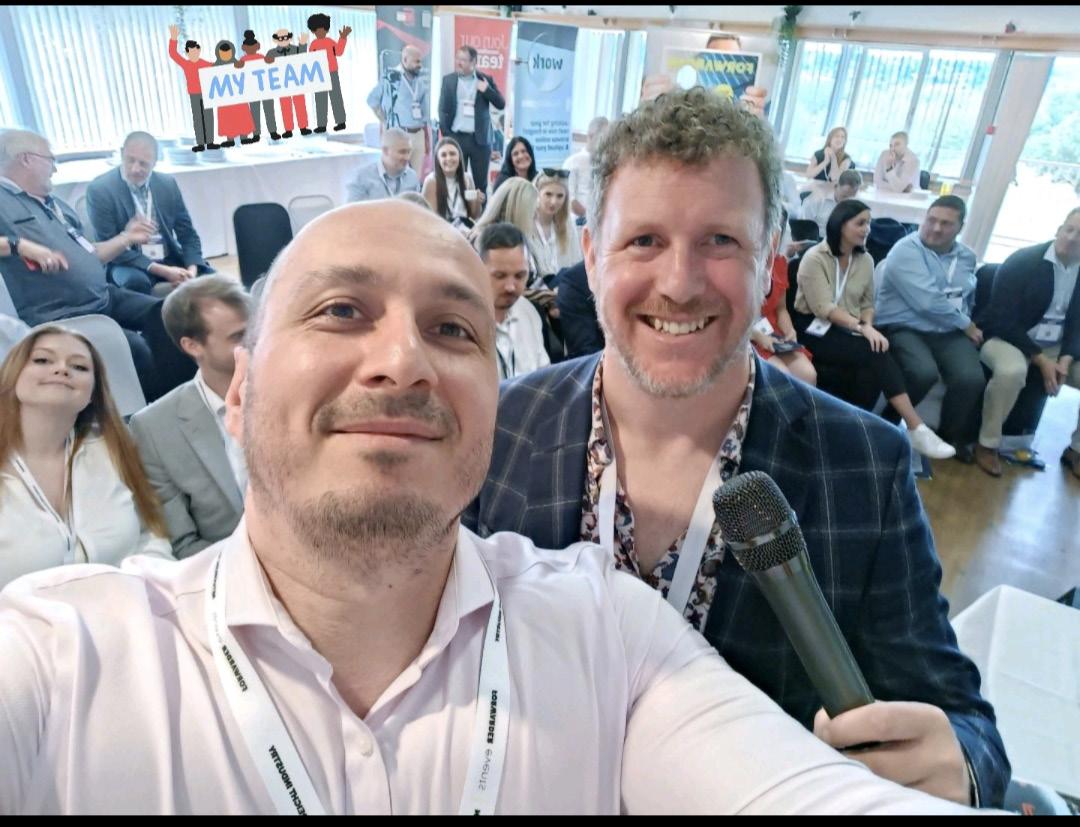
Behind the scenes, a dynamic team made sure everything ran like clockwork. Event director Paul Stoneman kept the energy high and the event smooth sailing. Antoniu Serb and Laila Goode, the Front of House dream team, welcomed guests with open arms and created an atmosphere that fostered connections. Kudos to Mohit Jitendra, the talented photographer who captured all the magical moments of the evening!
Overall, FORWARDER events LOCAL in Bristol surpassed expectations and cemented its position as an unmissable event for the freight and supply chain industry. The captivating keynote speeches, lightning-fast Speed Networking, and unforgettable bonding experiences at Shirehampton Golf Club left attendees inspired, motivated, and hungry for more in the future.

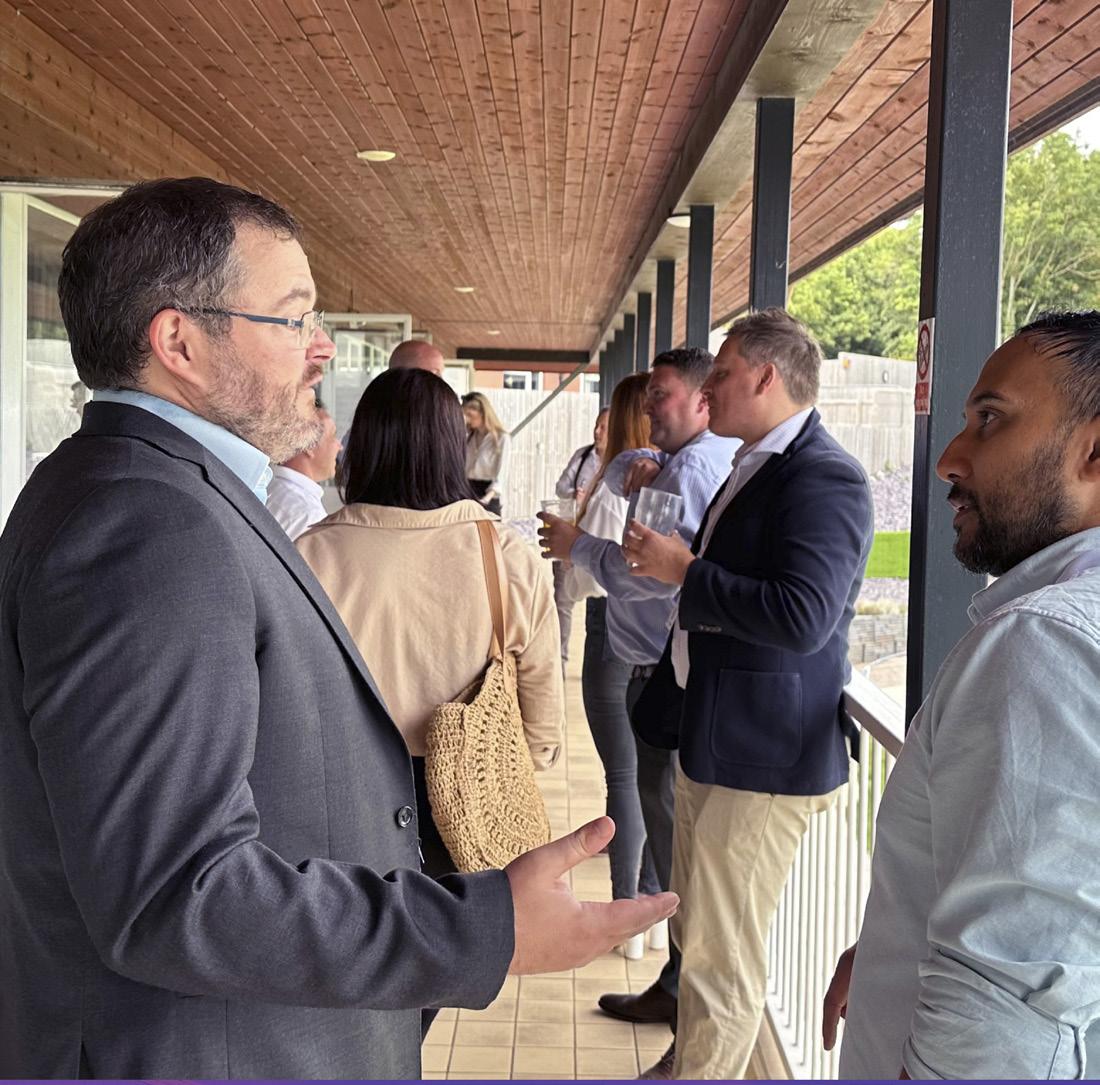
Altus Group is a respected global leader in the provision of software, data solutions, and independent advisory services to the commercial real estate industry. With a focus on empowering clients to make informed business decisions, Altus Group brings expertise and innovation to the table. As the main event sponsor for FORWARDER events , Altus Group demonstrates its commitment to supporting networking and business growth opportunities within the forwarding and logistics industry.
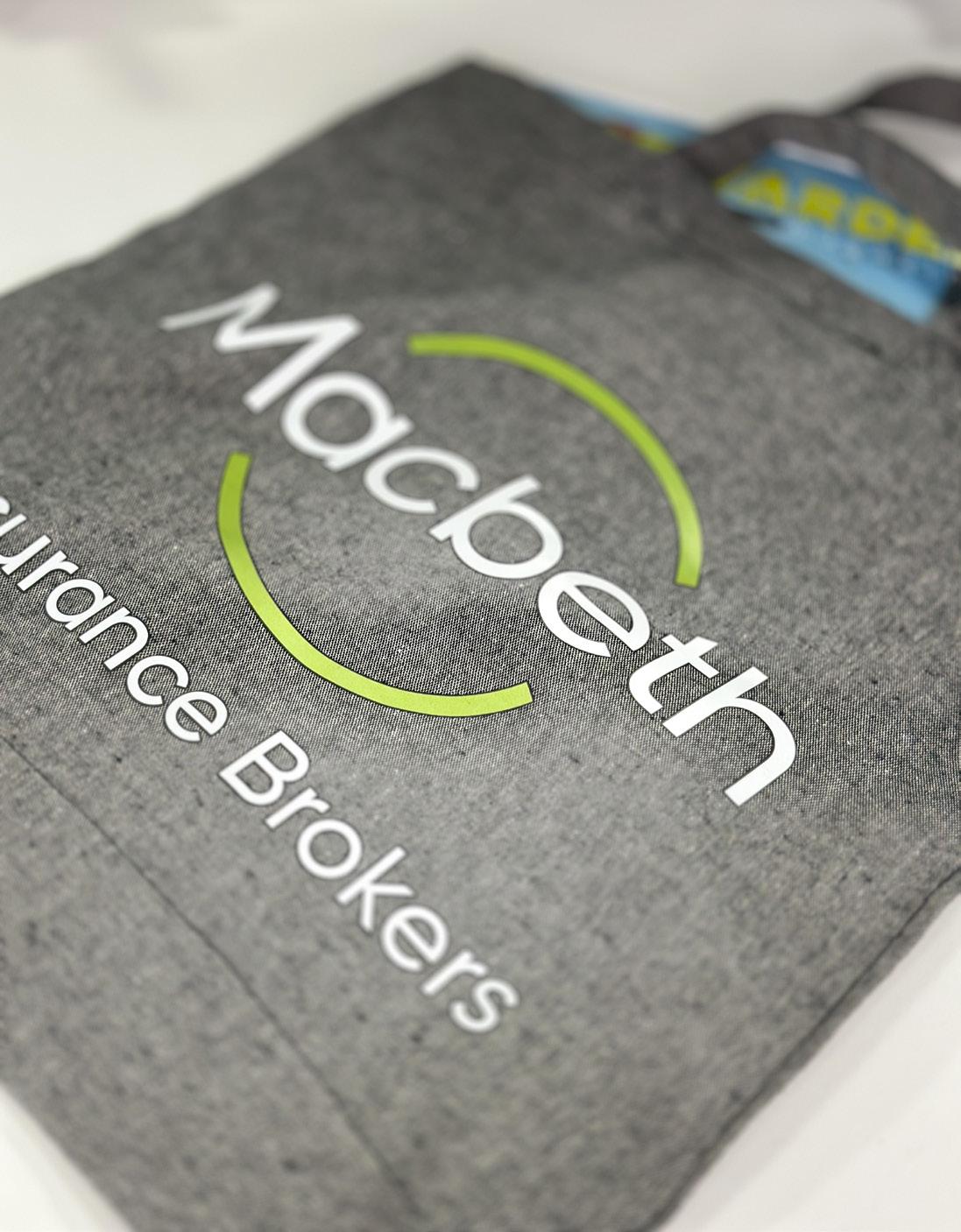
CDN Consular is a trusted provider of consular services, specializing in visa processing, document legalization, and authentication. With a reputation for efficiency and reliability, CDN Consular ensures smooth and hassle-free registration processes for travelers and event participants. As the registration sponsor for FORWARDER events , CDN Consular showcases its dedication to facilitating seamless event experiences.
What a great event & good to see old & new faces.The panel discussion about women in freight was particularly enlightening but enjoyed the whole event & can't wait for the next one. CDN Consular Services Ltd were proud to sponsor this event.
Paul Lee, CDN Consular Services Ltd, following the April 2023 event


Intercarry Customs Clearance is a leading customs clearance specialist, providing efficient and compliant customs solutions to businesses involved in international trade. With a strong commitment to customs expertise and customer satisfaction, Intercarry Customs Clearance simplifies the complex customs processes for its clients. As the refreshment sponsor for FORWARDER events , Intercarry Customs Clearance ensures attendees have access to refreshing beverages, keeping them energized and hydrated throughout the event.
Gaston Schul Customs and Trade Services is a renowned customs and trade service provider with decades of expertise in global logistics and customs compliance. With a focus on delivering tailored customs solutions and optimizing supply chains, Gaston Schul Customs and Trade Services helps businesses navigate the complexities of international trade seamlessly. As the table sponsor for FORWARDER events , Gaston Schul Customs and Trade Services contributes to facilitating meaningful conversations and connections among attendees.


Simply Cargo is a forward-thinking logistics company that combines advanced technology with sustainable practices to offer efficient, eco-friendly delivery solutions. By utilizing electric vehicles and optimizing route planning, Simply Cargo reduces carbon emissions while ensuring prompt and reliable deliveries. As the venue sponsor for FORWARDER events , Simply Cargo provides a world-class setting where attendees can connect, engage, and thrive.
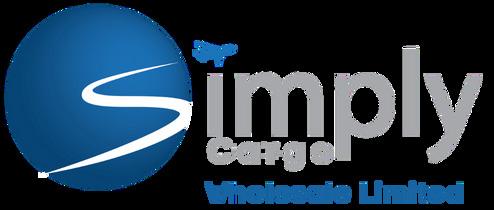
Macbeth Insurance is a leading independent insurance broker specializing in bespoke insurance solutions for businesses and individuals. With a team of expert advisors, Macbeth Insurance ensures comprehensive coverage and tailored protection against risks. As the merchandise sponsor for FORWARDER events , Macbeth Insurance adds a touch of sophistication by providing stylish tote bags for attendees to store their collected business cards.

Pledge is an industry-leading provider of carbon footprint tracking and sustainability solutions. Their innovative software empowers businesses to measure, reduce, and offset their environmental impact. Pledge plays a vital role in environmental stewardship by enabling organizations to make meaningful contributions to a greener future. As the speaking sponsor for FORWARDER events, Pledge brings valuable insights and expertise in emission tracking and environmental sustainability to the attendees.

Sentinel Group Security is a trusted provider of comprehensive security services, specializing in protecting people, property, and assets. With a team of highly trained professionals, Sentinel Group Security ensures a safe and secure environment for businesses and events. As the entertainment sponsor for FORWARDER events , Sentinel Group Security adds an extra layer of excitement and peace of mind, ensuring participants can enjoy the event to the fullest.
Logistics companies nationwide are celebrating after being shortlisted for Logistics UK's prestigious Logistics Awards 2023 Logistics UK’s Board – consisting of representatives from some of the country’s most influential logistics businesses – will now complete the final round of independent judging before winners are announced at the celebratory event, which will take place at the Park Plaza Westminster Bridge on the evening of Thursday 7 December 2023. Highlighting the achievements of companies and individuals that have made a significant contribution to the logistics and supply industry in the past 12 months, the awards event – sponsored by supply chain and logistics specialists, Bis Henderson Group – will include a glittering champagne reception and three course meal, with entertainment to be provided by award winning stand-up comedian Milton Jones.
David Wells, Chief Executive of Logistics
UK, comments: Our industry has seen off a number of key challenges in the past year to continue to deliver for customers and the work of our dedicated sector is reflected in this year’s awards shortlist. Narrowing down the entries from the high-quality submissions has been incredibly difficult, and I don’t envy those selecting the final winners. I would like personally to thank all those who entered and congratulate all our finalists. We are set for a thrilling night of celebration in December.
The shortlisted entrants for Logistics
UK’s Logistics Awards 2023 are...
the
Aramex
Bleckmann
DFDS Logistics
Kerry Logistics UK
Norfolk Logistics Ltd
ShipBob
Public Services Operator of the Year
ABS TRANSPORT LTD
LibertyBus
Metropolitan Police
– Commercial Vehicle Unit
Norse Group
Most Innovative
of the Year
Sponsored by Brigade Electronics
Bridgestone Mobility Solutions
Kinaxia Logistics
Prohire Limited
Varamis Rail
Wise
XPO Logistics
in partnership with British Gypsum
Water Business of the Year
Freightlink Solutions
Peel Ports Group
Port of Tyne
Robert Wynn & Sons Ltd
Decarbonisation Champion of the Year
Sponsored by Logistics UK Fuel Solutions
DFDS Logistics
DHL Express
DP World
Howard Tenens Logistics
John Lewis Partnership
PD Ports
Peel Ports Group
XPO Logistics
in partnership with British Gypsum
Logistics Technology Provider of the Year
Sponsored by Port of Dover
Microlise
ProvisionAI
SNAP
Volvo Trucks UK & Ireland
what3words
XPO Logistics
in partnership with British Gypsum
Van Business of the Year
Sponsored by Logistics UK Recovery
The winners of each award category from Logistics UK's Van Awards 2023 will form the shortlist for Van Business of the Year. For more information on Logistics
UK's Van Awards 2023, please visit logistics.org.uk/vanawards23
Logistics Partner of the Year
Innovation Gateway
Menzies Distribution & TIP Group
Metro
Uniserve
Wincanton and EDF Energy
XPO Logistics & Saint-Gobain
Air Business of the Year
AIPUT
(Airport Industrial Property Unit Trust)
Chapman Freeborn
Diversity & Inclusion Champion of the Year
Brigade Electronics plc
DFDS Logistics
J Murphy and Sons Ltd
Maersk
UPS
Wincanton – Karen Govier
Rail Business of the Year
Freightliner
GB Railfreight
Orange Train Wash
Tesco
People Champion of the Year
Carnell
CEVA Logistics
DFDS Logistics
DHL Supply Chain - Driver
Ambassador Programme
DHL Supply Chain
– Wellbeing Programme
Reflex Vehicle Hire
Last Mile Delivery Business of the Year
Sponsored by Endava
I ONA
Rhenus Home Delivery UK
SMS Ecofleet Limited
Speedy Asset Services
Vision Logistics
Yodel
Most Innovative Product of the Year
Dawsongroup plc
Evri
IONA
Lindum Packaging
Orange Train Wash
Volta Trucks
Zenobe Energy
Rising Star of the Year
Aris Stefanou, General Manager – Dover Customs, DFDS Logistics
Chloe Wyatt, DHL Supply Chain
Evie Vincent, Fleet & Innovation Support Manager, Tesco PLC
Jamie Sands, Group Operational Support Manager, Welch’s Transport Ltd
Katherine Owens, Management Accountant Apprentice, Abbey Logistics Group
Pasqualino Vaccarella, Yodel
Logistics Leader of the Year
Sponsored by DHL Supply Chain
ABS TRANSPORT LTD
Chris Welch – Welch’s Transport Ltd
Daniel Carrera, President, UPS Europe
David Patten, Managing Director, Abbey Logistics Group
Farah Asemi, Founder & CEO, SMS
Eco Fleet Limited
Tony Prescott, GTS Logistics UK
Road Transport Operator of the Year
Sponsored by Bis Henderson
Abbey Logistics Group
Collett & Sons Ltd
Miniclipper Logistics
Tesco
Wincanton and Primark
XPO Logistics & Saint-Gobain
We now look forward to celebrating all finalists, and winners, at our awards event, which is now established as the celebration night of the year for our industry, continues Wells.
Book your place now and join leaders from across the sector, including some of the UK’s biggest brands, in celebrating the very best of our sector – it’s sure to be a night to remember.
Documented permission to pass that a national customs authority grants to imported/exported goods so that they can enter/leave the country.
Related topics
Bonded warehousing
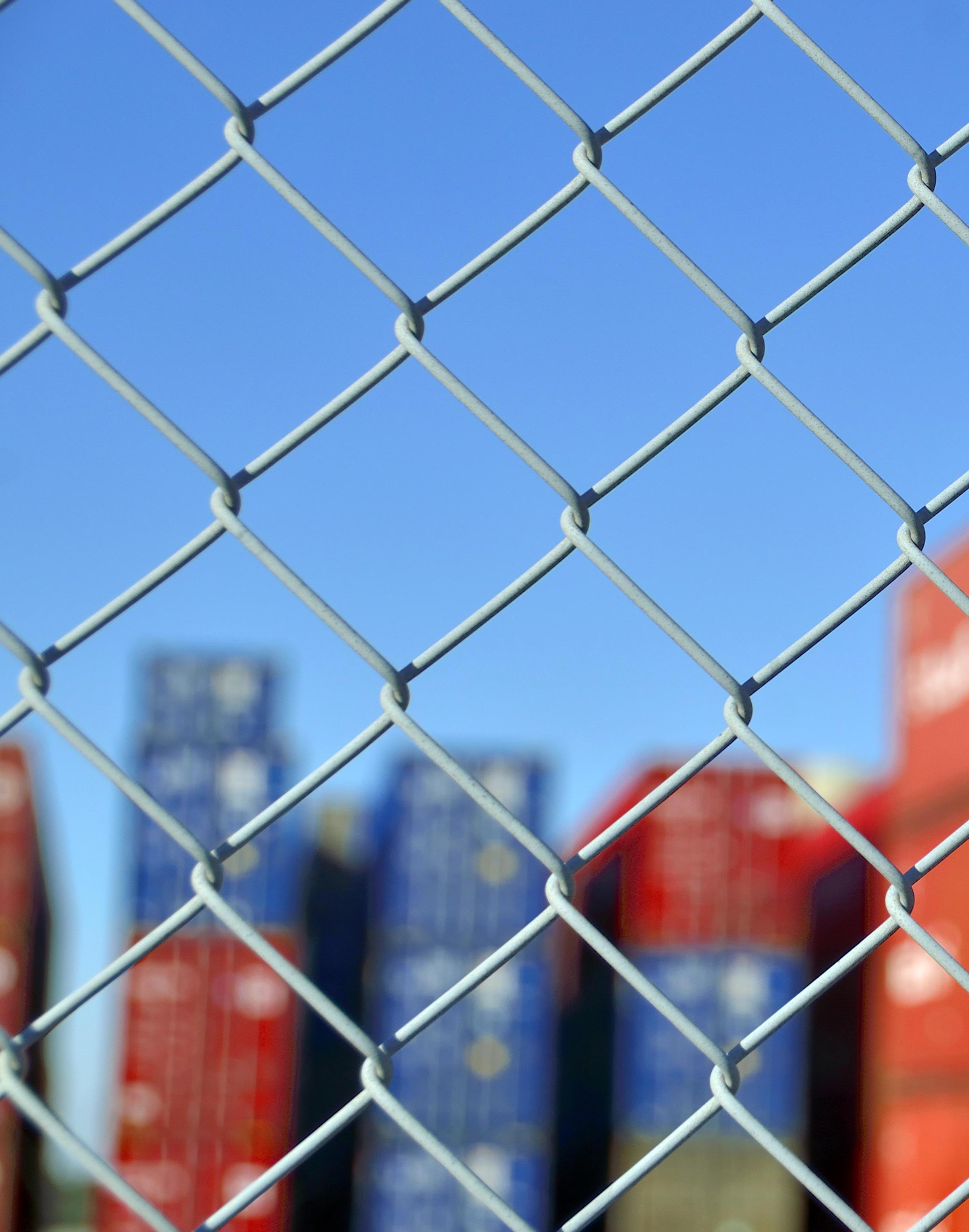
Customs brokerage
Duties & taxes
Sponsored by
In just three months, the UK's legacy customs platform, CHIEF (Cargo Handling of Import and Export Freight), will be replaced by the Customs Declaration Service (CDS). Rhenus UK is encouraging exporters to take prompt steps to transition to the new system before the late 2023 deadline.
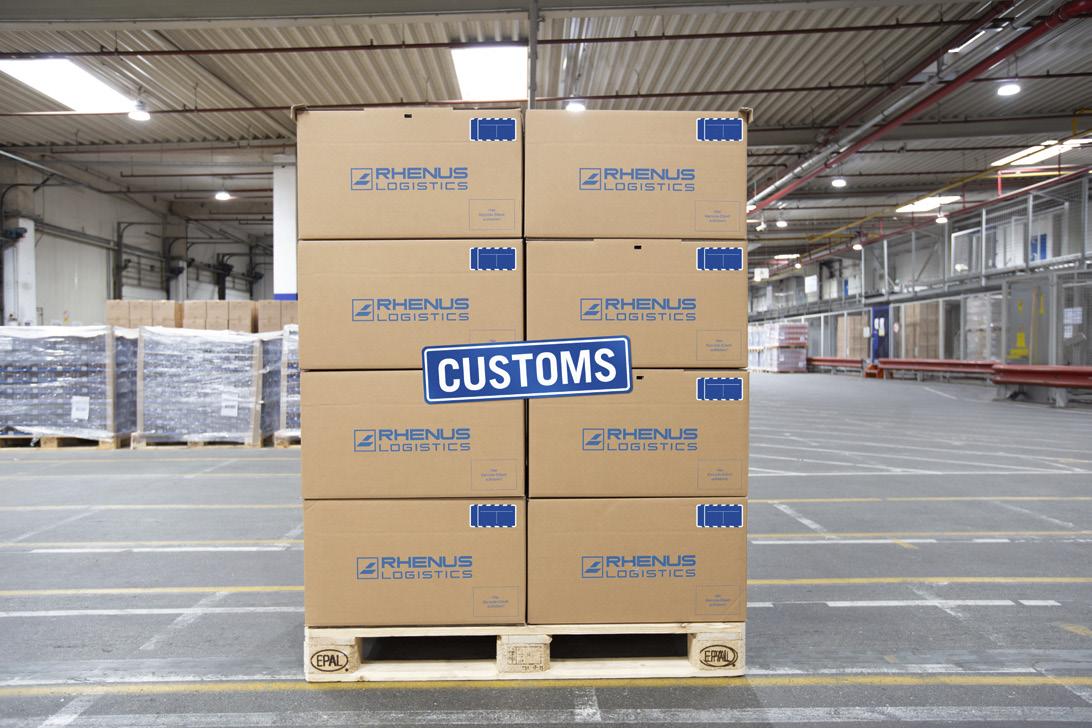
While import declarations shifted to CDS on 1st October 2022, the switchover for export declarations is scheduled for 30th November 2023.
Rhenus UK is advising exporters to prepare for the November switchover now to avoid costly delays.
While not obligatory, we recommend that businesses register with CDS, if they have not already done so, as part of the CDS Import Full Trader Roll-Out. Additionally, traders must ensure that any authorisations and easements they hold, and which are applied to CHIEF declarations currently, are compatible with CDS, taking outward processing as one example.
Rob Mulligan, UK Customs Manager, Rhenus UKTo ease the transition process, exporters should understand their obligations when engaging an agent to complete an export declaration on their behalf, and familiarise themselves with the UK Trade Tariff (Volume III for CDS) to provide agents with the required information for declarations.
With the clock ticking, Mulligan advises exporters to take the necessary steps: register, authorise, and prepare to ensure success in the transfer process. Rhenus UK is ready to support its customers, but businesses must act promptly to safeguard their future exporting plans. While the transfer process is expected to be straightforward for most businesses, proactive measures are essential to prevent future delays.
A Hot Topic that's been discussed recently on several webinars, and certainly with the Bonded Warehousekeepers Association (BWA) members, is the issue of due diligence within a supply chain
This is an issue that is also under review by HMRC and was emphasised in a recent meeting with them regarding their simplification and modernisation project.
Due diligence is very much at the core of that project, so it is imperative that the warehouse industry addresses due diligence, understands due diligence and puts in place the appropriate measures and not just to 'tick the box.'

BWA Chairman, Clive Brady, recently spoke to BWA Company Secretary, Graham Sheen, saying...

What we don't want is warehouse industry professionals, including our BWA members, thinking that they have got to do this to tick a HMRC box. Businesses should be undertaking due diligence because it is in their businesses best interest.
As a business, you should be checking and validating who you are engaging with, and who you are wanting and wishing to do business with.
By doing that you then 'effectively' comply with the HMRC requirements of due diligence. It is important that you know who you are trading.
Clive also said, Businesses also need to look at this from another perspective. It's not just a HMRC requirement, but should look at it as their own business risk requirement. If they do that, then they should satisfy themselves that they are either happy to do business with a prospective company or decide that they are not happy to do business with the company because they represent an undue risk.
If a business is not certain about, where either their suppliers or customers products are being sourced or sold then they should avoid the risk to themselves by not engaging with that company or companies.
As an Association, the BWA support members that are going through the HMRC application process for becoming either a Customs or an Excise warehouse. We emphasise that the businesses should have the appropriate due diligence processes and procedures in place to satisfy the HMRC application conditions.
The due diligence process is becoming more and more critical these application processes, but it needs to go beyond that, it needs to be critical to your business risk reviews.
The industry needs further guidance and support from HMRC around that but to put it simply, make sure that you get to know your customers and suppliers. Ultimately, try to get complete visibility of their supply chains.

For example, if you are a buyer of alcohol then you need to know where that product has come from and who supplied it. This also applies if you're a 3PL.
You don't want your business to be dragged into an illicit supply chain and therefore potentially at risk of fines and penalties, from HMRC, because you didn't identify issues when you onboarded a customer or supplier.
Having a due diligence policy in place means that we want to ensure that our own businesses are protected, and we don't engage with people that we should not be, or do not want to be engaging with.
As an association, we are pushing HMRC to be more collaborative, feeding back information to businesses and informing us which traders our members shouldn't be engaging with.
There are fraudsters out there and HMRC know who those fraudsters are. If HMRC are prepared to share this information that will help our members us to make informed decisions.
All genuine businesses should be trying to achieve the same thing, which is to remove the fraudster from the supply chain. This maybe over optimistic but that is the objective.
Businesses also need to work together, work with HMRC and equally HMRC have got to work with us and our members to achieve a common goal.
The key piece of guidance is to make sure that you understand the supply chain of your customers and your suppliers.
At the end of the day, you have got to protect your own business. You need to be satisfied that it's right company, or individuals, that you want to do business with.
Clive said, We're all chasing business, I get that, and we are all keen to secure as much business as we can, but you do need to be seriously careful in terms of who you engage with, within this C&E arena.
We (the BWA) will certainly continue to engage with HMRC and secure clarity on what is considered to be good due diligence This will help our members meet with the HMRC due diligence obligations as well as reducing their business risk.


...THE BWA EXPLAINS WHAT TRADERS NEED TO CONSIDER
Commenting on yesterday's publication of the Border Target Operating Model (BTOM), setting out new controls to protect the UK against security and biosecurity threats and create a world-class border system for trade in goods, the British International Trade Association says it will mean a very hectic start to the new year for its members.
Our members will already be in the process of moving all export declarations from CHIEF to CDS by 30 March 2024 and will now need to make sure they are ready for the delayed introduction of remaining sanitary and phytosanitary controls, as well as full customs controls for non-qualifying Northern Ireland goods, which will now be introduced from January 2024. Then from April 2024, will also have to implement checks on medium risk animal products, plants, plant products and high risk food (and feed) of non-animal origin from the EU.
This further delay to the overall timetable is actually relatively short. Those BIFA members that are actively involved in handling the movement of the types of products imported into the UK for which Sanitary and Phytosanitary (SPS) checks; safety and security declarations; and health certifications are required will be hoping that they will see a return on the time and money that they have invested in staff and resources to meet the original and five times revised implementation timetable.
Those members, along with the trade association, have been cautious with any government announcements setting out new dates and an implementation timetable for the BTOM, and will continue to be so, as uncertainties remain.
Whilst we need to thoroughly review the document in order to gain a comprehensive understanding of how it will impact on the work of the freight forwarding and logistics companies that BIFA represents, a few things are clear.
The BTOM does not address fundamental concerns raised by BIFA with DEFRA regarding the suitability of using the present Port Health Authorities to handle international trade.
Whilst certain parts of the August 2023 version of the BTOM are an improvement over its previous incarnation, the trade association notes that that there are references to the Single Trade Window (STW) which is still very much under development. It is important to emphasise that the implementation of the BTOM is reliant on the implementation of a workable STW, as the two programmes are dependent on one another. After the STW has been developed additional time will be needed to link commercial IT systems to the STW.
In view of the fact that large IT projects are often delayed there has to be concerns regarding the envisaged timetable.
Some comments in the document state that certain elements of the BTOM have not been finalised and that the timetable may be changed at a later date. In Kent, for example, clarity is essential for traders of SPS goods, but the document states that: 'The provision of Inland Border Control facilities in Kent for goods entering the UK through the Short Straits (Port of Dover and Eurotunnel) is being reviewed.' This uncertainty is not helpful for traders involved in this particular trade and makes it difficult to finalise decisions on routing and ensuring regulatory controls are complied with on such shipments.
The CNS suite of products is designed to provide users with the most efficient and robust technology, combined with a world-class support helpdesk.



Simple, intuitive, and easy to use cloud-based platform to submit CDS, CHIEF and UK transit declarations. Our technology allows users to submit declarations for CNS, Pentant and MCP ports, with CCS-UK integration on the roadmap.

Our suite of Cross-border Management products, BEEMS, has been developed to remove complexity and reduce paperwork, saving significant time and offering reassurance that movements are complying with relevant regulations.






BEEMS Border Management products support businesses managing movements across borders on RORO pre-lodgement routes between the UK and EU, providing direct access to all the relevant customs systems.










HMRC-approved port community system that supports many of the largest maritime ports in the UK, enabling business and government stakeholders to securely and reliable exchange information and collaboratively manage cargo movements.
The system is fully approved by HMRC for imports, exports and transhipments at temporary storage locations, and provides users with real-time visibility of unit and cargo status as cargo moves through the port environment.


An essential facet of warehouse security is maintaining a safe workplace environment. Adequate lighting, both inside and outside the warehouse, acts as a deterrent to potential criminals and ensures clear visibility for surveillance cameras. Motion-activated lighting serves as an effective tool for alerting security personnel to unauthorised activity.
The integration of warehouse management systems facilitates efficient operations while contributing to security. These systems enable real-time monitoring of inventory, tracking shipments, and managing personnel access.
CCTV surveillance forms a cornerstone of warehouse security strategies. Cameras continuously record activities, aiding investigations and providing crucial evidence. This technology is pivotal in deterring

Understanding crime statistics and trends is instrumental in adapting security measures to prevalent risks. Recent reports emphasise the persistent threat of theft in UK warehouses, with theft offenses on the rise. This underscores the need for proactive security measures.

Additionally, the digital landscape introduces new challenges. The increasing adoption of technology, such as warehouse management systems, exposes warehouses to cyber threats. Robust cybersecurity measures, including firewalls, secure networks, and regular employee training, are essential to safeguarding digital assets.
The emergence of drone technology introduces both opportunities and challenges to warehouse security. Drones have the potential to enhance surveillance capabilities, but they can also be exploited by criminals for illicit purposes, such as scouting vulnerable entry points. Warehouse operators must evaluate potential risks and implement appropriate
Ensuring the security of UK warehouses requires ongoing vigilance and proactive measures. By incorporating security services and security guards, as well as embracing advanced technologies such as CCTV surveillance and warehouse management systems, operators can significantly mitigate risks. Staying informed about crime statistics and trends empowers warehouse operators to adapt their security strategies effectively. By prioritising security, UK warehouses can uphold operational integrity, protect assets, and provide a secure environment for their workforce.
SGSMore targeted government investment – combined with action to improve the flow of goods across borders and a commitment to work in closer partnership with the logistics sector – could boost GDP by £3.9 billion per annum by 2030, and generate enough revenue to finance the salaries of 20,000 nurses according to a new independent report by Oxford Economics on behalf of business group Logistics UK. ‘Logistics: Delivering a solution to the UK’s productivity puzzle’ outlines how the ability of UK’s logistics system to support greater competition and efficiency in the UK economy is being held back by challenges caused by border friction and a lack of investment in national infrastructure, innovation and skills – which, if addressed, could also result in an increase in annual household disposable income.
The UK’s economy faces a productivity challenge at present, but logistics can be a big part of the solution. This report, conducted on our behalf by Oxford Economics, emphasises how improving the productivity of the logistics sector, one of the UK’s most significant economic contributors, would have a positive impact on the whole economy. However, the findings also suggest that reversing the UK’s decline in productivity and delivering these gains is beyond the control of industry operators alone and will take concerted effort and investment by government. To ensure that the nation’s decline in productivity is addressed, it is imperative that government works with the sector to establish a cross-Whitehall Logistics Productivity Forum, to maximise the benefits that this sector
David Wells, Chief Executive, Logistics UKWith the UK currently in joint 19th position in the World Bank logistics rankings – a substantial drop from an average ranking of 6th between 2012 and 2018 – the report, sponsored by Amazon and Volvo Trucks,
outlines how a return to the top ten would unlock a significant boost in GDP through productivity gains. As Mr Wells continues, this would not only result in an approximate £80 per annum increase to the annual income of the UK’s 30 million households – a £2.3 billion boost to domestic budgets by 2030 - but could also raise enough in additional taxation to finance the annual salaries of more than 20,000 nurses. If the UK was to become a global leader in logistics, this benefit would be doubled to £7.9 billion a year.
To deliver the gains outlined in this report, the logistics sector requires government to work in strategic partnership with the private sector to deliver improved infrastructure, reduce friction at the country’s borders to boost trade, resolve skills gaps and invest in innovation to drive efficiency.
The new analysis also highlights that, while there would be a significant economic benefit for the UK from addressing these challenges to close the gap with other nations, this must be achieved alongside delivering the transition to a green economy.
If the UK gets the transition to net zero right, it will align with long term higher productivity. In the short-term, significant levels of investment are required to make the necessary switch efficiently. Both public and private investment needs to avoid stranded assets. The logistics sector and government must work in partnership ensure that taxpayer and private investment in the transition delivers value for money and supports, rather than hinders, economic growth. Government support is vital to support the pace of change required, to prevent a loss in private sector efficiency, and ensure a smooth transition for all sectors of the economy.
can deliver to the whole economy.
Following the recent end-of-life announcement for Microsoft SharePoint 2013, any transportation or logistics business still actively using the platform could be placing the security of sensitive information and documents at risk
The announcement, which came earlier this year, means that Microsoft will no longer provide technical support for any problems that occur on the platform, including bug or security fixes for any vulnerabilities that are discovered.
For those businesses that use SharePoint and haven’t yet upgraded from the out-of-support version, they risk leaving themselves vulnerable to security breaches, which could be financially and reputationally damaging given the strict GDPR and data protection laws.
To mitigate these risks, organisations are being urged to migrate to SharePoint Online – a supported alternative with enhanced functionality compared to its predecessors.
Jason Betteridge, Managing Director at business intelligence and productivity solutions provider Circyl, commented...Many of the transportation or logistics firms that utilise this technology remain unaware of the recent announcement and what it could mean for their long-term security.
Whilst it may still run properly and perform the required tasks as it always has, its end-of-life status means that any future issues will not be addressed, regardless of how damaging they may be. This also applies to SharePoint 2010, where the end of extended support was announced back in 2021.

Given the significant amount of damage and negative media attention that high-profile security breaches can attract, it is absolutely essential that businesses ensure their solutions are up to date, so they can provide adequate support and protection.
Aside from the obvious security benefits, a modern SharePoint platform is also much more cost-effective than an on-premises or hosted solution and it allows users to access information and collaborate from any location during an era of hybrid working.
For many businesses, the most off-putting aspect of the process is the migration itself, as they sometimes feel overwhelmed by the prospect of moving documents and adjusting to a brand new solution that employees are not accustomed to.
If this is the case, then businesses should engage a team of experienced technical consultants who will manage the SharePoint migration, delivering a solution that has been tailored to meet their needs and requirements.
Organisations and bodies that provide essential support to the freight and logistics industries.

Related topics
Warehousing
Insurance & legal
Vehicles & equipment
Sponsored by
AWest Midlands-based transport and logistics company which formed during the height of the global Coronavirus pandemic has paid tribute to its accountants group for their support as the business formed.
Prime Accountants were appointed by 24/7 Worldwide Exhibitions shortly after the company began trading in 2020 to provide a full-service package of accounts, tax and payroll to keep everything ‘under one roof’, playing to the strengths of the Midlands-based accountants which offers a wider range of services than its competitors.
After an expectedly difficult first year, heightened by the threat of the pandemic, 24/7 Worldwide is now experiencing significant year-on-year growth, and so remains as grateful as ever for its dedicated accounting services provided by Prime.
When we started the business during the pandemic, in order to create long-term success we knew we needed to make several key decisions and make sure they were spot-on, and so I’m very pleased to report that choosing to work with Prime was absolutely the right thing for us as a business. Especially in the early days, knowing that Prime would be on-hand to talk us through everything from private tax to payroll was a huge relief, providing a seamless service and talking to us on a human level, never accusing us of asking a silly question and making us feel like a really important client to them. We like to keep things simple, so having our business ethos matched by Prime was a huge benefit to us, with all their services offered as a one-stop shop for all our accounting
needs. We meet with Jamie (Skelding) two or three times a year and we are always grateful of his time and his knowledge and experience of the industry and our needs as a business. 24/7 Worldwide has experienced significant growth over the past two years and we’re set to continue that trend thanks to all our staff and our esteemed business partners, of which Prime play an important role. We look forward to continuing our relationship with the Prime team as we carry on growing as a company into the future.
Colin Stone, co-owner, 24/7 Worldwide Exhibitions
Located at its offices in Birmingham, Solihull and Coventry, Prime Accountants proudly service its clients with a mission statement to cut through the jargon to help achieve long-term financial prosperity.
We hugely appreciate the working relationship we have with Colin and the team at 24/7 Worldwide, who have become a key client with Prime over the past three years. During that time, we’ve seen their growth from a start-up during the Coronavirus pandemic, at a time where our advice had to be put under particular scrutiny, so we’re delighted to have witnessed their progress since then. Our aim with 24/7 Worldwide, as with so many of our clients, is to provide a sounding board to their accounting questions and/or concerns, and offer our advice in a digestible manner to help guide their business decisions for the long-term benefit of the company. We’re grateful to know we’re achieving that thus far, and remain committed to doing so for as long as we’re able to.
Jamie Skelding, Finance Director, Prime Accountants
Cost-To-Serve analysis is key to overcoming future supply chain disruptions in the military and defence sector, according to the latest insight from a global supply chain consultancy.
New thinking from Bis Henderson Consulting suggests Cost-To-Serve analysis should be adopted to help adapt procurement processes when faced with major supply chain disruptions caused by war, pandemic, Brexit or other significant global events.
Cost-To-Serve is the measurement of the true costs required to produce a product or meet a customer’s requirements.
The firm’s latest whitepaper reveals that Cost-To-Serve is a core, business-critical initiative for informing future decisions and direction, but it can also support the development of agile supply chains, ensuring resilience in the event of disruption.
Most importantly, having greater sight and understanding of Cost-ToServe within the supply chain can enable organisations to pivot more quickly when disruption occurs.
While Cost-To-Serve is predominantly utilised to increase profitability throughout the supply chain, Bis Henderson Consulting is underlining its value as a tool for efficiency in the defence sector.
The firm’s analysis and experience shows that it can be used to improve cost transparency and highlight opportunities to boost productivity, leading to greater efficiencies across the whole supply chain.
Cost-To-Serve is primarily viewed as a profitability tool, particularly in ecommerce and healthcare markets, but its function provides wider benefits. In-depth analysis of this metric should be used to inform business strategy and performance optimisation across all sectors, but through our work we find that it isn’t being utilised in this way within defence and security. By applying Cost-To-Serve analysis to the defence sector, organisations can gain greater insight into the whole supply chain and use it to introduce greater transparency. This transparency is key to not only finding efficiencies, but also for identifying ways to adapt and pivot in the event of global disruption. The events of recent years have underlined the fact that cross-border supply chains are always at risk of disruption, but understanding where efficiencies can be made gives organisations full visibility and more control. By transferring industry best practice to manufacturing and procurement in the defence sector, we can ensure all angles and possibilities are considered, so clients get supply chains fit for the future and resilient to global events.
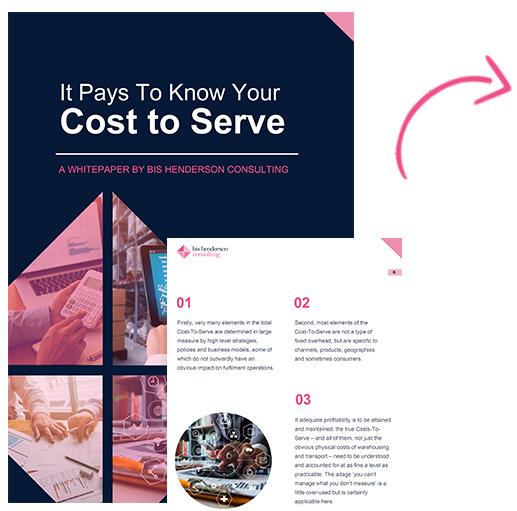
Bis Henderson Consulting will be sharing advice on how Cost-To-Serve can be applied to defence and security supply chains at DSEi 2023 from September 12 to 15. To book an appointment to speak to a specialist at DSEi visit Pod 16 in the Manufacturing Hall.
Download the ‘It Pays To Know Your Cost-To-Serve’ whitepaper
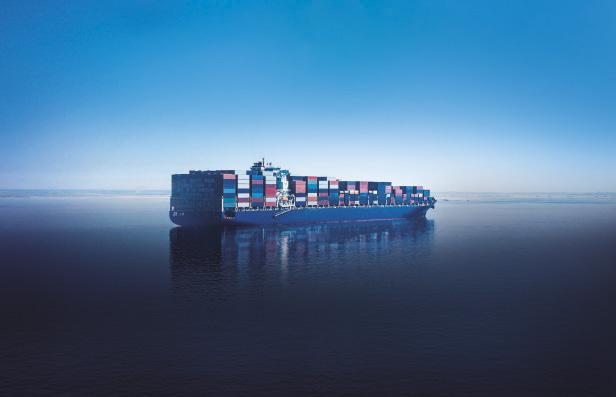
Join 5000+ members across 190+ countries of trusted partners and customers.

Key Benefits:
ColliCare has established its own sales and operations office in Erith, London. Services will focus on international freight by sea, air and road to/from Scandinavia, Turkey, Poland, Baltic States, Benelux and Asia. Local services; customs, warehousing and distribution will be in the portfolio.
ColliCare is focused on the total supply chain and has 16 years of experience in delivering smarter logistics solutions. Through their presence in 13 countries in Europe and Asia, the company has already succeeded in standing out by developing more sustainable logistics solutions for their customers – choosing the greener option.
A new team is in place in the UK to take care of new and existing businesses. Cem Turkdonmez has extensive experience in international logistics, and will be the Managing Director for ColliCare in the UK.
As a challenger in the market, competing with the major players, ColliCare will focus on a high level of quality and service. The vision is to improve customers' competitiveness through innovative and integrated logistics services of high quality and flexibility.
Ecovadis – for sustainability. ColliCare was awarded the EcoVadis gold medal for sustainable development in both 2021 and 2022 and has committed to set a science-based target, through the Science Based Target Initiative.
ColliCare is a privately owned Norwegian logistics company with a focus on the total supply chain, from manufacturer to end-user.
Fast-moving consumer goods (FMCGs) have particular logistical requirements, especially those that are highly perishable. And as consumer behaviour shifts, so too does that of manufacturers, retailers and the supply chain that serves them
In 2021, the size of the UK grocery market stood at around £212 billion. The market has been steadily growing since 2004 and is forecast to reach over £241 billion by 2027.

It is estimated that in 2027, supermarkets will be the largest sales channel for grocery retail, with a value of almost £97 billion. In the UK, German discounter Aldi has seen rapid growth and has proven to be a significant disruptive force on the market.
Another disruptor is the increase of tailored D2C (direct to consumer) solutions in this sector. The value of online grocery channels is expected to amount to £26.9 billion by 2027.
Boosted by Covid lockdowns, this trend is changing last-mile delivery strategies: more and more vans are delivering food to customers’ doors, alongside continuing bulk deliveries via lorry to supermarkets.
Tim Dabbs, Head of Contract Logistics at NNR Global Logistics, pointed out that whatever the channel, the movement of foodstuffs must meet high standards.
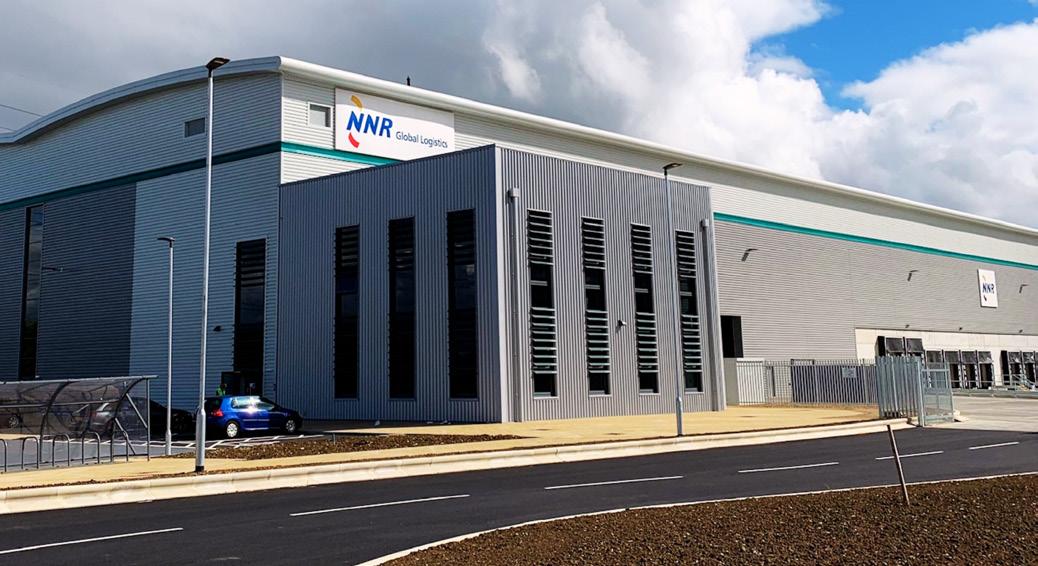
Regulatory compliance associated with hygiene, labelling and handling must be at the highest standards. Adhering to these standards ensures the safety and quality of food products throughout the logistics process.
1. Temperature control to avoid product spoilage or degradation
2. Inventory management and systems to maintain correct product levels and product rotation
3. Transportation expertise
4. Highly efficient and compliant storage facilities with temperature control, adequate space and suitable storage racks.
5. Supply chain management and expertise that ensures high levels of service with minimal margin erosion to the customer
There is also a growing consideration of environmental performance throughout the supply chain, including warehousing. New brands are challenging dominant players in the market, Dabbs said. One example is the drinks segment within grocery.
Flavoured drinks and non-alcoholic drinks are making their way onto the shelves alongside traditional brands. These brands bring new flavours with strong, bold branding – heavily marketed and with social responsibility and environmental values at their core. Such fast-moving brands require a complete logistics partner to assist in their rapid expansion and offering – covering the major retailers, to the wholesale market, to pubs and restaurants and D2C.
He said a flexible supply chain is essential to meet the demands of fast, organic growth – as is finding the right provider to provide complete transport solutions, from courier deliveries to consumers’ doors through to full-load deliveries to major retailer distribution centres.
NNR has developed its operational expertise in the fast-moving food sector over the last decade and is driving SME businesses forward, Dabbs said, by providing the expertise highlighted above and investing heavily in food-grade facilities, systems and people.

For example, 18 months ago Jubel Beer made NNR its logistics partner of choice. The company has experienced significant growth in the UK beer market since launching in 2018. The brand is known for its “dangerously refreshing” beers cut with fruit, which are also gluten free, vegan and certified carbon neutral.
Jubel started off by targeting small, independent pubs and bars, but has expanded into the retail and wholesale sectors having secured partnerships with major supermarkets and drinks distributors. This has significantly increased its visibility and accessibility to consumers across the UK – and its supply chain needs have changed accordingly.
NNR has supported this growth by providing a cost-effective, highlevel service through its contract logistics division in the UK, which recently moved to a new distribution centre (DC) in Wellingborough.
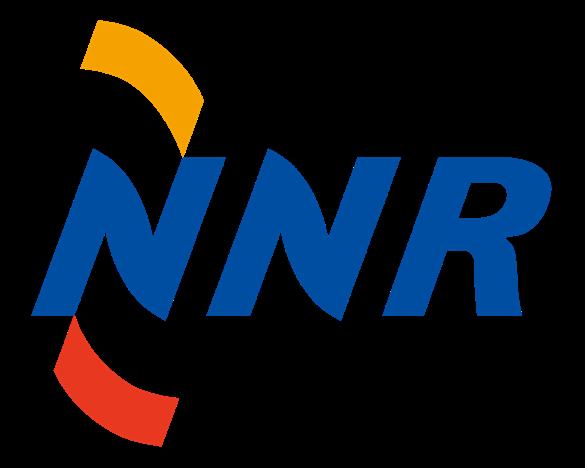
The new, 130,000ft2 DC is a modern high-bay facility that offers both traditional warehousing and distribution, and the sort of value-added services essential to thrive in today’s competitive FMCG environment, such as e-commerce fulfilment with EDI/API integration, pick and pack, re-work and labelling.
With the new DC and its long-established expertise, NNR is truly partnering to drive its customers’ growth, Dabbs said.
BUT FIRMS HAVE RECOURSE TO CHECK & CHALLENGE THEIR ASSESSMENTS

Every business rates revaluation period creates ‘winners’ and ‘losers’ but the latest, which came into effect on 1st April this year, hit the industrial sector hardest.
When an assessment takes place, it is based on an estimate of the open market rental value of a property on a single date, which is the same for all properties in England and Wales. This year’s revaluation date, known as the Antecedent Valuation Date (AVD), was set at 1st April 2021, an extraordinarily uncertain time for the commercial property market.

Due to the pressures national lockdowns brought to bear on this industry, certain types of property, for instance in the retail or office sectors, have been provided with a variety of support, such as reliefs or valuation downgrades. However, the industrial sector is the only sector where no automatic right to support has been offered.
Primarily this is due to the fact that during the pandemic, industrial property was experiencing unprecedented levels of demand owing to a rapid expansion in ecommerce as consumers stayed at home. During 2020 therefore, more than 50.5 million square feet of additional space was leased in the warehouse sector – 12 million more than the previous record year in 2012, according to property consultancy Savills.
The resultant rise in rents for these properties has meant that large distribution warehouses were stung with the largest hit in the 2023 cycle, an increase in rateable value over 27% according to Altus Group. While in some instances those increases in rates will be fair and justified, it won’t be true in every case.
Every business has the right to appeal their annual business rate assessment. The basis of a challenge is whether the bill is consistent, uniform and fair and this is no different for the industrial sector, despite recent history. Indeed, there are specific avenues of appeal for businesses operating from these properties, and savings to be made.
When rates are calculated by the Valuation Office Agency (VOA), they are based on the building type and the space that is occupied, not the business itself. However, depending on the type of business in operation and its unique circumstances, a rates reduction might be appropriate.
Another fact to consider is that following the pandemic surge businesses have been sloughing what is now excess space, the highest profile case being US ecommerce giant Amazon, which has made tens of thousands of job cuts and reduced its operating facilities by millions of square feet in a bid to cut costs. Like Amazon, many companies may now be finding themselves in that situation, using less space than they occupy.
Of course, if a property is not being used then an empty rates application could be applicable but an appeal is also possible in a scenario where there are partial operations – when, for example, a unit once filled to the rafters with packages is now only a quarter full. A valuation surveyor can assist in this case by liaising with the relevant local authority and VOA for relief on the rate, based on the proportion of the building that is being used. There are also avenues of appeal where a business is phasing operations from one larger building to a smaller one and finding itself paying two sets of business rates.
As valuation surveyors, our job at Altus is to explore the details of a bill, understand if an appeal is appropriate and if so, build a case. We have done this successfully across multinational companies to private industrials, large portfolios to single properties, helping UK businesses reduce their rates bills by over £2 billion across both the 2010 and 2017 rating lists, and well-understand the nuances that may allow businesses to make savings.
We always recommend that acting fast is not the best way forward. With only one opportunity to appeal, the evidence needed to challenge a bill must be solid. For our clients, the first and perhaps only step they need to make towards managing business rates bills is understanding that the bill received in black and white is not a fait accomplis. Rates can be challenged further, potentially resulting in significant savings at a time when businesses need it the most.
Request a free business rates review at info.altusgroup.com/challenge-business-rates-fw
Altus
GroupThe Corporate Sustainability Reporting Directive (CSRD) has come into force in the EU, potentially impacting over 50,000 businesses inside and outside the bloc
If you’re a freight forwarder, this regulation will affect you and your customers, so you’ll need to start planning now to ensure you’re prepared for its impact. In this blog post, we’ll tell you everything you need to know about how CSRD will concern you as a freight forwarder, your customers and other players in the supply chain so you can best prepare for upcoming emissions reporting requirements in the EU.
The CSRD is a significant regulatory framework enacted by the European Union Council at the end of 2022 that supersedes the existing Non-Financial Reporting Directive (NFRD). The first set of businesses impacted by the CSRD will be those currently covered by the NFRD (large enterprises), with small and medium enterprises (SMEs) as well as non-EU companies requiring participation at later dates (2026 and 2028, with reporting due in 2027 and 2029).
In force in the EU since the start of 2023, the CSRD is designed to enhance corporate sustainability reporting in general, but this will also have significant knock-on effects for freight forwarders and their customers.
One of the primary objectives of the CSRD is to streamline and standardise sustainability reporting for all companies that meet the reporting criteria. Many large corporations will need to report their scope 3 emissions — including emissions generated from both upstream and downstream transportation and distribution of goods (scope 3 categories 4 and 9 of the Greenhouse Gas Protocol) — for 2024, from 2025 onwards. The requirement to include scope 3 emissions in CSRD reporting is a new addition when compared to NFRD and other sustainability regulations, requiring further organisation and preparation from qualifying businesses.
In order to meet the requirement to report scope 3 categories 4 and 9, corporations that rely on the movement of goods will need their shippers and distributors to report the emissions generated from shipping their goods.
As a freight forwarder, you have access to valuable shipment data that’s key to calculating shippers’ freight emissions for scope 3 categories 4 and 9. The CSRD means shippers will be dependent on you to calculate these emissions that their customers are required to report.
As the responsibility for reporting scope 3 categories 4 and 9 emissions moves down the supply chain, freight forwarders will hold the responsibility for ensuring that shippers and their customers are supplied with accurate, accredited and timely emissions reports. From now, you can expect to see a significant rise in sustainability reporting being included in RFPs from shippers that operate in or serve customers that have a presence in the EU.
Below, we’ve highlighted everything you need to know about CSRD so you can prepare for the impending requests from shippers and other LSPs.
The CSRD aims to establish common, consistent and standardised reporting practices for environmental, social and governance (ESG) factors within the EU, much like existing financial accounting and reporting standards. Companies that meet the following criteria will need to start reporting under the CSRD:
• Have over 250 employees.
• Generate annual revenues exceeding €40 million.
• Possess total assets surpassing €20 million.
• Publicly-listed entities with more than 10 employees or generating more than €20 million in revenue.
• International or non-EU entities that generate annual revenues surpassing €150 million within the EU and have at least one subsidiary or branch in the EU meeting specific thresholds.
Companies meeting these criteria will need to submit an annual report addressing how sustainability influences their business operations and their environmental and social impact — including their scope 3 emissions.
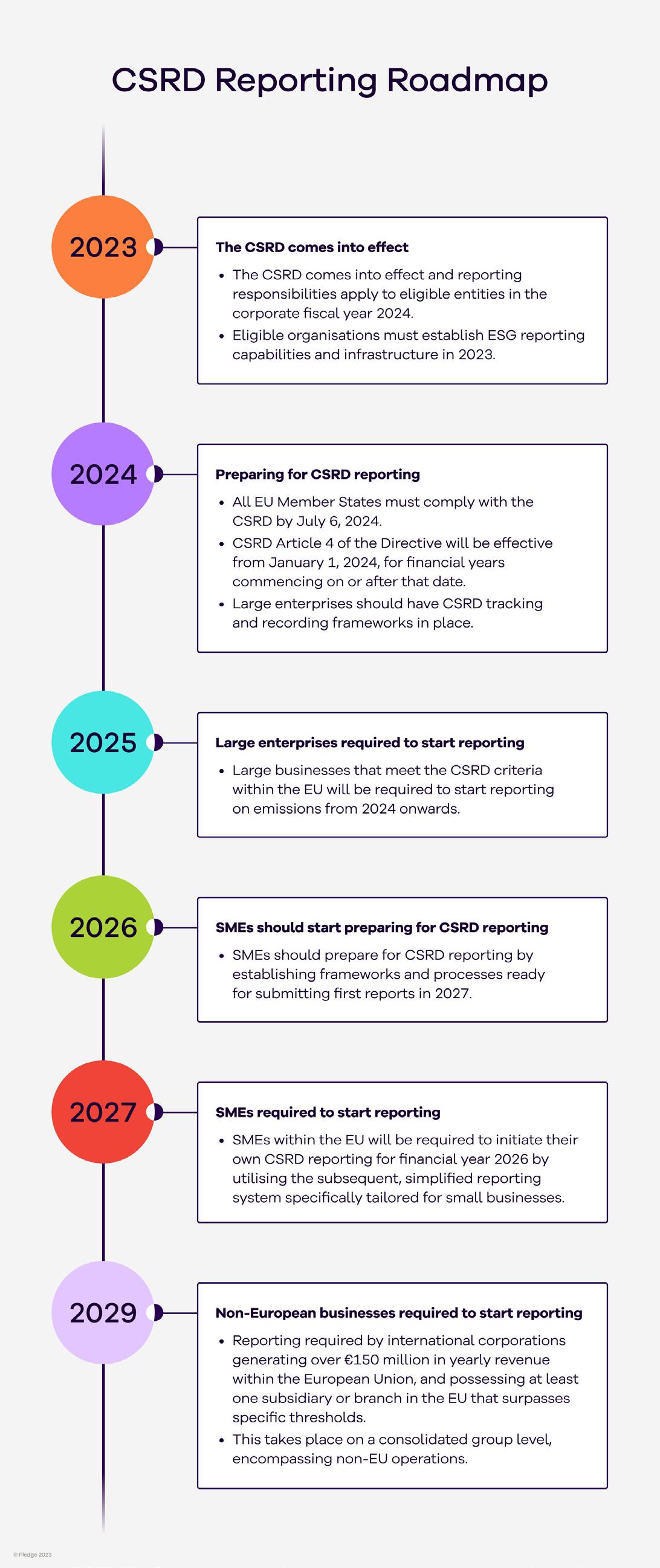
There are stringent requirements for how businesses should prepare reports for the CSRD. Below, we’ve outlined the main requirements so you know how to present and prepare reports for your customers.
• Large companies are required to submit their first CSRD report in early 2025, covering their environmental performance during the fiscal year 2024
• SMEs will begin reporting on 2026 emissions in 2027, following the streamlined SME guidelines outlined by the CSRD
• Non-European companies that operate and generate more than €150m in revenue within the EU will need to start reporting on 2028 emissions in 2029
Third-Party assurance. Companies that need to comply with CSRD will need to seek 'limited' assurance for the sustainability information they disclose. This involves engaging an independent and trusted thirdparty — such as an independent sustainability reporting company or auditor — to review the data.

While it’s not directly relevant to you as a freight forwarder, it’s important to be aware of the CSRD reporting requirements for businesses so you can understand why they’re making requests for emissions reports.
Here’s a short breakdown of what information businesses are required to disclose under the CSRD:
• The selection of ESG themes and risks
• Sustainability targets and progress
• Strategies for transitioning to a sustainable economy
• Identification of sustainability risks
• Evaluation of strategy resilience
• Disclosure of fossil fuel exposure
• Environmental protection policies
• Social responsibility initiatives
• Human rights respect
• Anti-corruption practices
• Corporate governance
• Stakeholder interests
Companies are also required to prepare their financial and management statements in an electronic format and digitally tag their sustainability information according to a specified categorisation system.
For freight forwarders that deal directly with shippers that serve large corporate entities based in the EU, the first round of required CSRD reports will need to be submitted in 2025, reporting on the emissions from 2024. For freight forwarders, this means that they will need to record and track the necessary shipment data from 2024 and have a reporting method in place by the beginning of 2025 if they are to meet the requirements of the shippers they work with.
To stay ahead, freight forwarders should start preparing for calculating and reporting scope 3 categories in 2023. Many companies are already looking for forwarders that provide sustainability services, and emissions measurement is likely to become an RFP requirement for shippers and a real differentiator for freight forwarders in the very near future.
There’s an opportunity to gain a significant competitive advantage by offering more than the bare minimum when it comes to sustainability requirements. By offering highly accurate, transparent and accredited emissions measurement and reporting, as well as ways for customers to reduce their carbon footprint through carbon reduction and removal methods, you can differentiate your business and turn regulatory changes, like CSRD, into opportunities for success.
At Pledge, our platform enables you to offer scope 3 emissions calculations and reporting directly to your customers. It’s simple to use, can be easily integrated and provides audit-ready reports that enable your customers to meet their CSRD requirements.
Sign up for a free trial of our emissions measurement platform to see how we can help you prepare for the impact of the CSRD regulations.
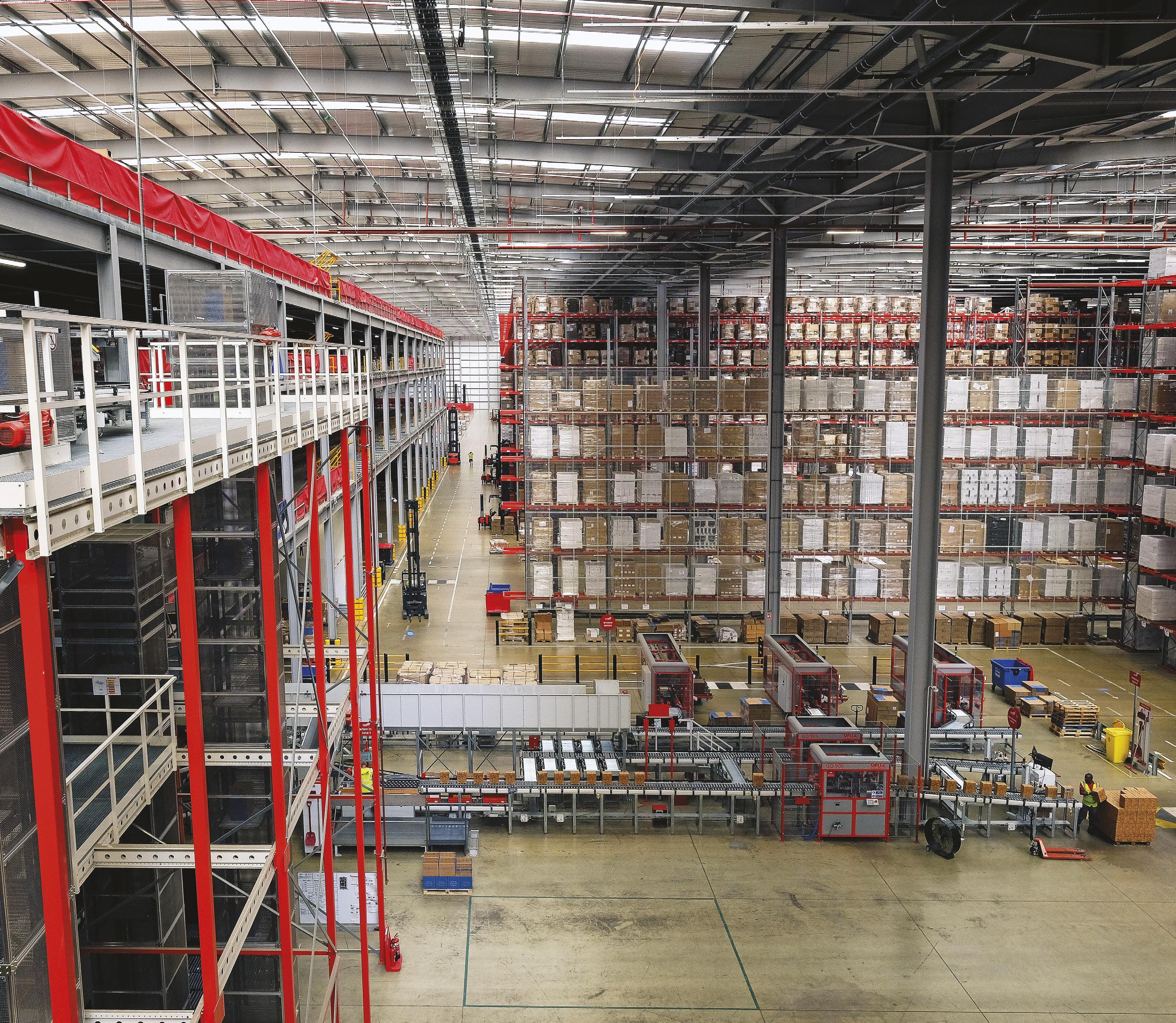
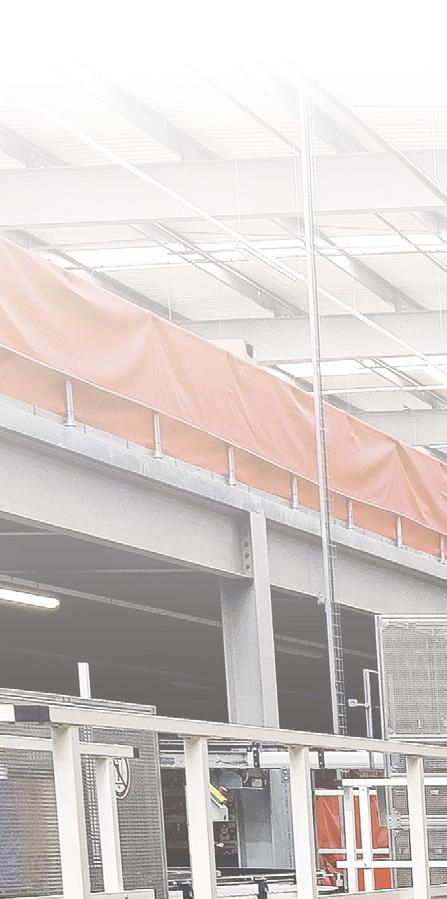
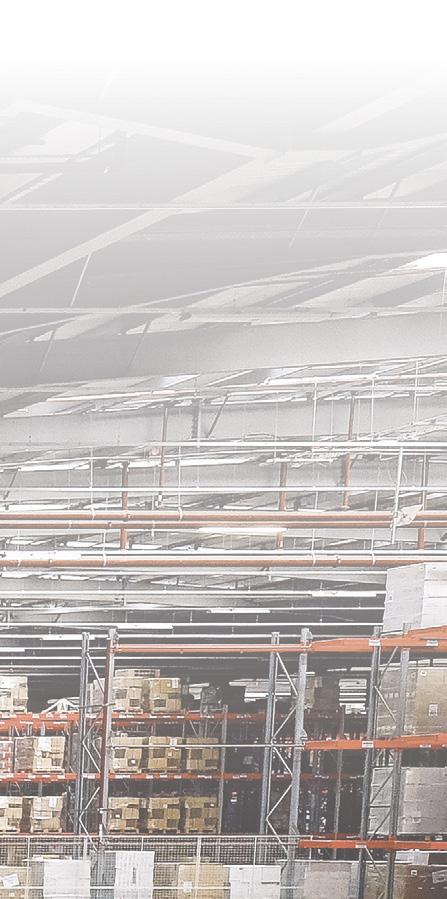
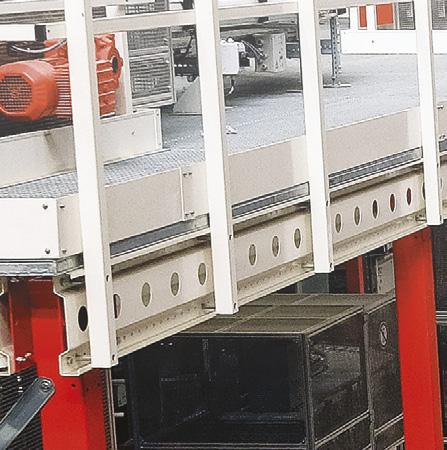
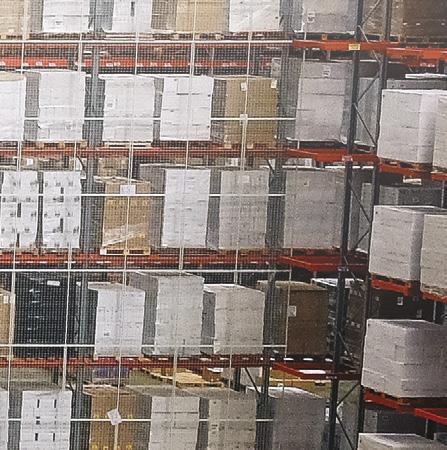

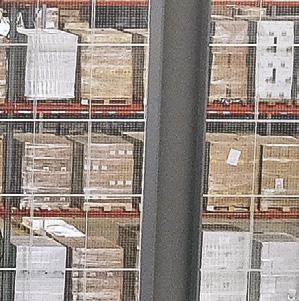
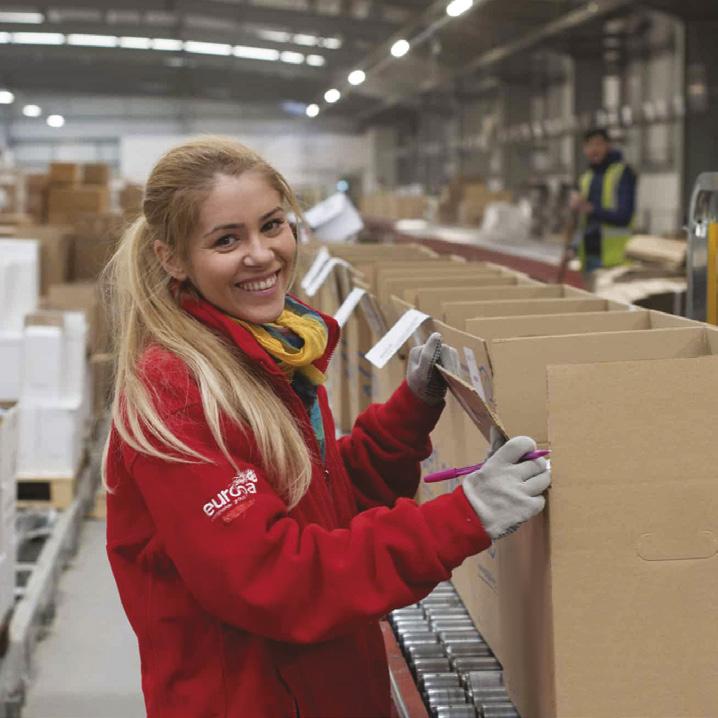







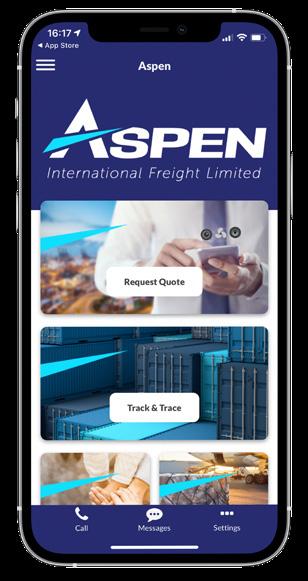
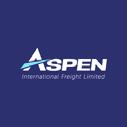


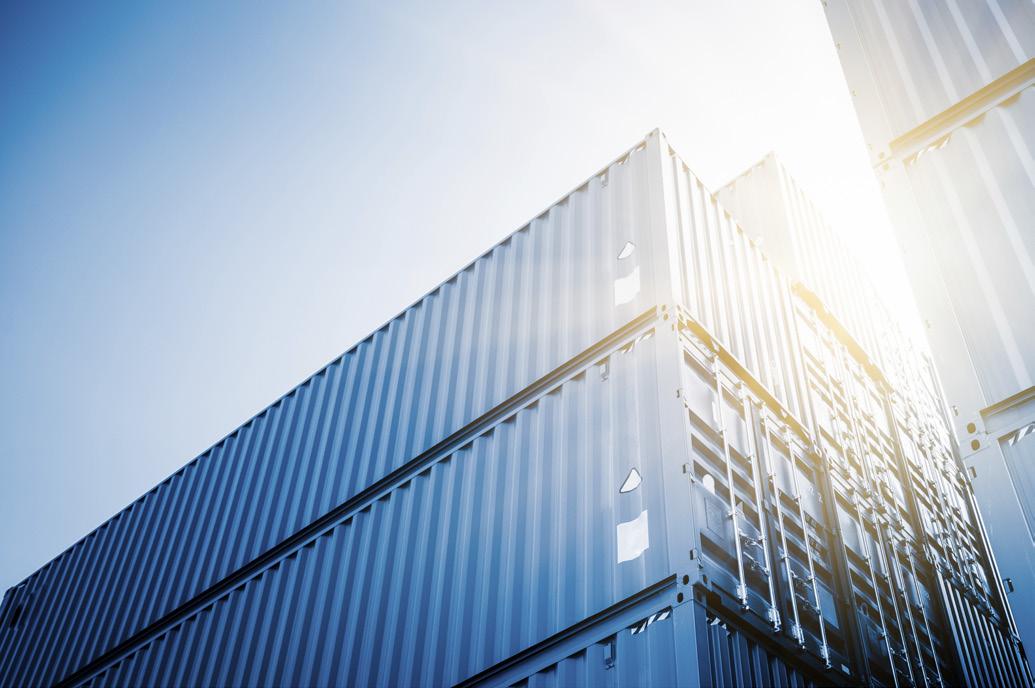





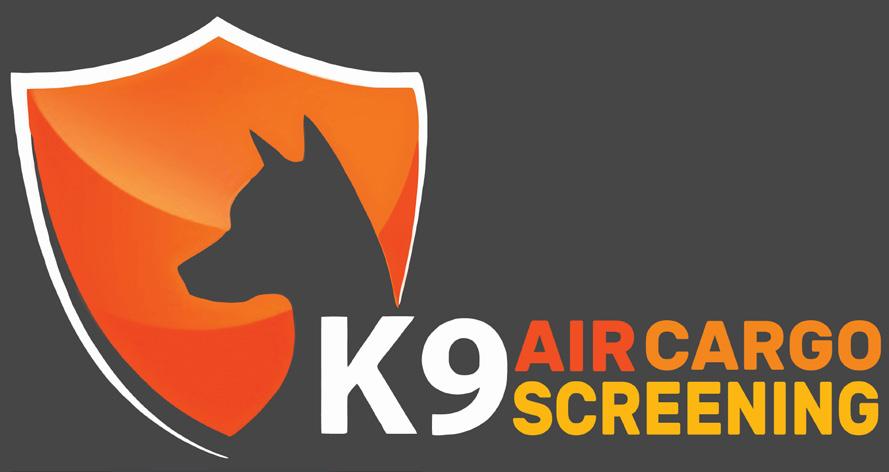
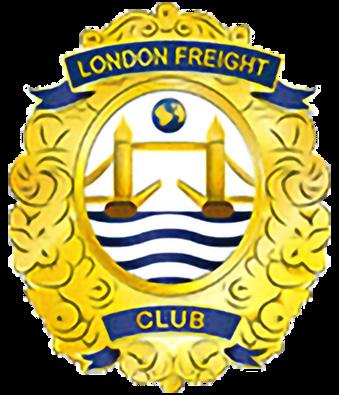




From money woes to monkeypox, from climate change to COVID, there's usually something going on that needs close monitoring. Here we'll report your stories about emergency management.

Related topics
COVID-19
Cost of living
Global warming
Flooding has a significant impact on the global freight and logistics industry, causing disruptions that ripple through supply chains worldwide. The industry has already seen massive disruptions due to various factors, including the pandemic and the Ever Given incident in the Suez Canal. Flooding adds another layer of complexity to these challenges.
In 2021, floods in Europe and China were described as 'another body blow' for global supply chains. The floods caused broken railway links in Europe, seriously disrupting cargo movements in and out of the German ports of Rotterdam and Hamburg. This had a knock-on effect on industries such as the motor industry and domestic appliances.
In China, flooding led to a shortfall of containers, creating delays and driving up prices. The floods strained transportation networks in both
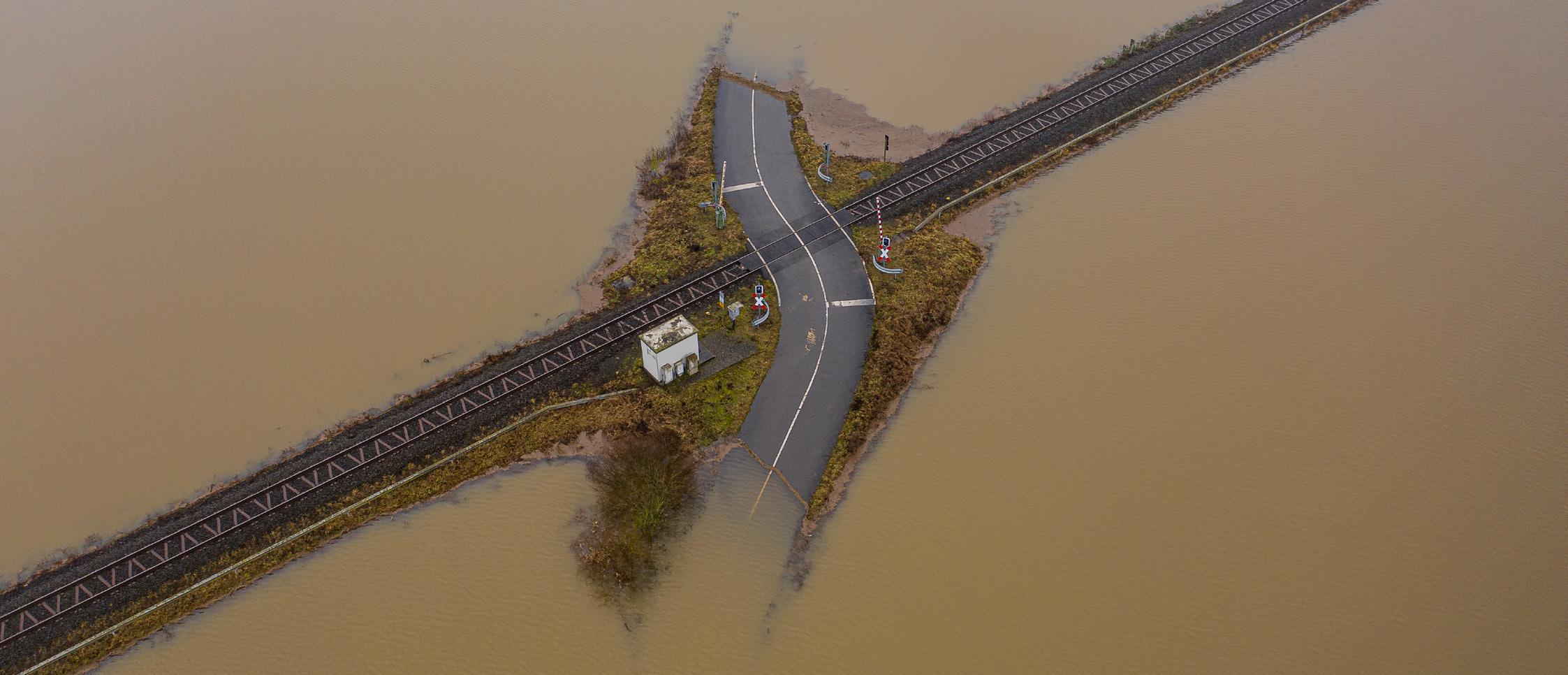
the short- and long-term through transportation delays, infrastructure damage, and recovery. These events can have adverse impacts on infrastructure function in the form of economic disruption and loss to social systems.
The costs of business interruption often approach or exceed physical damages, and global supply chains expose business activities to floods thousands of miles away. For instance, German steel making giant Thyssenkrupp could not get raw materials due to the flooding.
In conclusion, flooding poses a significant threat to the global freight and logistics industry. It disrupts supply chains, causes delays, damages infrastructure, and leads to increased costs. As climate change increases the frequency and intensity of such events, it's crucial for the industry to build resilience against these challenges.
This article was originally released shortly before UPS strikes were narrowly averted earlier in the year. However, the points remain valid and there have been various instances of strike action in the UK and abroad recently, so here it is again...
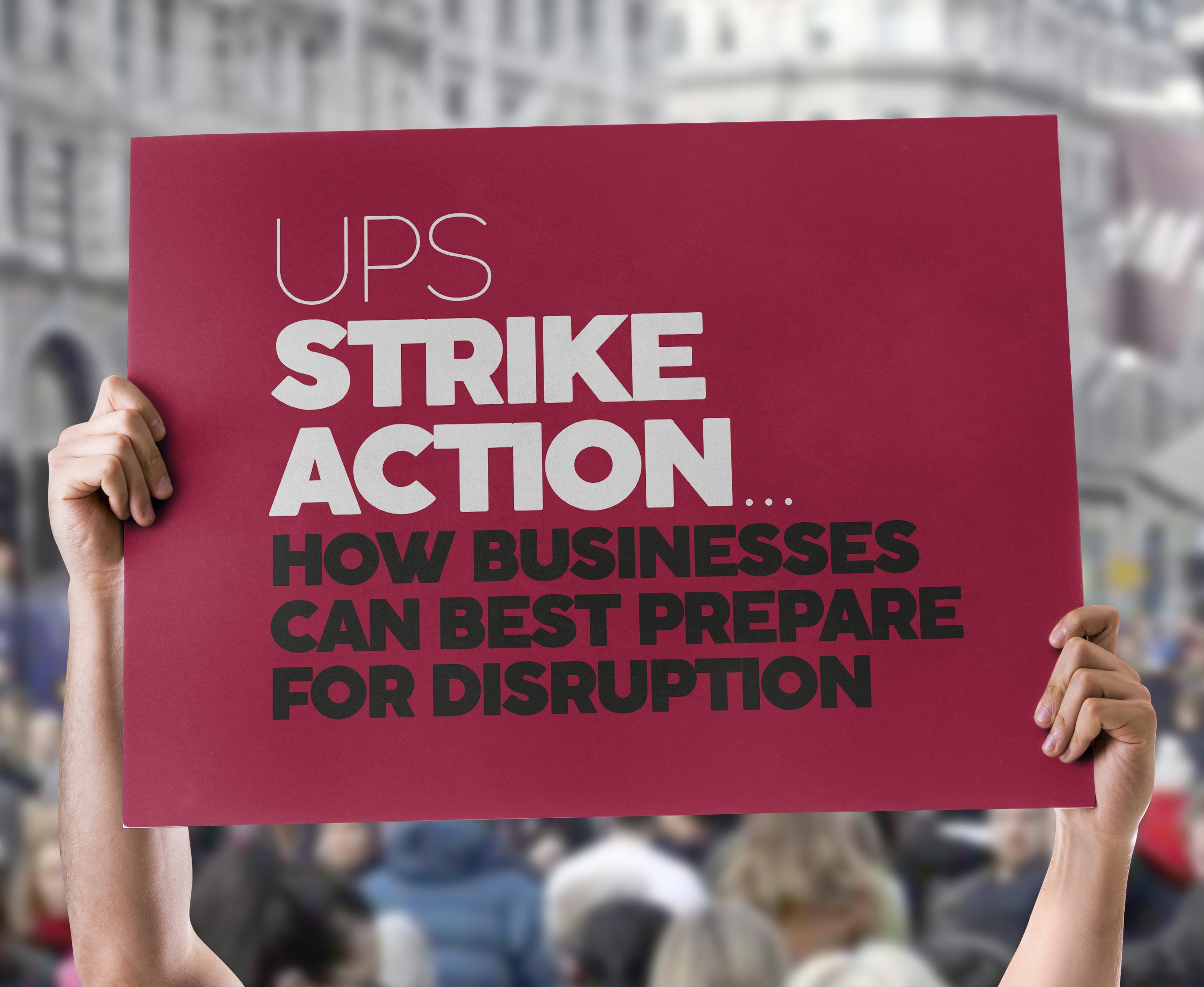
Last year saw UPS overtake FedEx as the world’s largest transportation company, according to an annual Forbes study. However, recent news of 340,000 UPS workers looking to strike at the end of this month could see the end of UPS’ prosperous year.
With the company estimated to transport 6 percent of the US gross domestic product in its trucks every day, a strike of this magnitude could have serious consequences for the US and global economies. From disrupted supply chains to driving up prices, a strike would see widespread impact across various industries that depend on timely deliveries.
In particular, e-commerce retailers are most at risk of negative fallout from a UPS strike. After several years of a turbulent economy, the rise of e-commerce has been credited with helping to mitigate the economic downturn caused by the pandemic. More consumers have looked to capitalize on the convenience and ease of online shopping and at-home delivery systems. Behaviors have shifted so much so, that e-commerce purchases are expected to account for 24.5 percent of all global retail sales by 2025.
With retailers more reliant on e-commerce than ever, how can businesses plan for the potential strike and mitigate disruption?
Businesses may wish to seek alternative shipping providers to tide them over while the strike is underway. FedEx, for example, will be accepting additional parcel volume for a limited time ahead of the strike.
However, finding a substitute carrier may be easier said than done. It’s estimated only 10 to 20 percent of UPS shipments could be picked up by other carriers in the event of a strike. Heightened pressure on competitor carriers means it’s likely the biggest companies won’t be able to fulfill all deliveries, leaving millions without their packages for days or weeks on end.
The best approach is for businesses to cast their net wide. Alongside the larger carriers, businesses should also forge relationships with smaller shipping companies. Having a diverse carrier strategy enable businesses to redirect shipments to other carriers if necessary.
Be sure to review the terms and conditions within your carrier contract regarding service disruptions and alternative arrangements first to identify any penalty clauses that may apply.
With mounting pressure on alternative carriers to fulfill orders, increased shipping rates should be expected.
This is particularly true if switching to smaller carriers, where consumers can’t benefit from economies of scale due to UPS’ unrivaled size and capacity, or no relationships have been built with carriers to secure discounted prices.
With fewer deliveries being made, businesses can expect production delays and inventory shortages caused by transportation disruptions, hindering the overall functioning of businesses.
Being proactive and ensuring stock levels are well-maintained ahead of the July 31 strike deadline could save a headache later on.
When disruptions occur, exceptional customer service can make all the difference in retaining customers and preserving brand trust. This means communicating openly so customers are not left in the dark about changes to products and services.
Make customers aware of any expected delays and provide reassurance. Email newsletters, updating websites and posting on social media can help get your message out quickly to customers.
The US narrowly escaped a recession in 2023, but severe supply chain disruptions and chaos to businesses could tip the economy. So, now is a good time to evaluate the resilience of supply chains and identify areas for improvement.
However, it’s important to keep in mind the impact of a UPS strike on the US economy would depend on the duration and severity of the strike, as well as the ability of alternative delivery services to absorb the increased demand.
Establishing contingency plans now can help prevent disruptions for any likely future strikes.
Charles Haverfield, CEO, US Packaging & Wrapping
Organisations and bodies that provide and train staff for the freight and logistics industries.
Related topics
Certification
Organic growth
Safety awareness
Sponsored by

Gebrüder Weiss starts the new training year with very pleasing numbers: 105 young people are starting their training at the international logistics group in Austria, Germany, and Switzerland (2022: 95), meaning that most of the available spots have been taken. The logistics company would be able to take on another 22 in the course of the training year.
We are proud to be able to welcome so many motivated and talented apprentices again this year; people who want to help shape the future of logistics, says Monika Mandl, Head of Human Resources Development at Gebrüder Weiss. While the work to find suitable apprentices has increased, in here opinion it is worth taking the time to contact potential applicants by means of many different communication channels, platforms and collaborations.
Career prospects at Gebrüder Weiss are very good as the company is on a steady path of growth, most recently in south Germany, but also internationally. The company’s employees are at the heart of its continued
success. This explains the particular importance attached by the logistics company to the in-depth training it gives to its apprentices. The aim is for them to remain at the company for a long time, where they can further develop in line with their interests and skills. An approach that has proven its worth and resulted in many blossoming careers in the company.
Personal attributes such as origin, age or the like are of no relevance when it comes to making an application. What’s important is that the person in question fits into our corporate culture and wants to shake things up with us. We see the diversity of our employees as the basis for the innovative power and performance of Gebrüder Weiss, Mandl states.
Gebrüder Weiss currently has a total of 320 apprentices at 39 locations in the D-A-CH region, training a further 32 young people in Bulgaria, Serbia and Hungary. The logistics company also offers fasttrack training following high-school graduation ('Matura') to become a freight forwarding agent or a company logistics agent through the Dual Academy. Five trainees are currently making use of this option.

6 SEPTEMBER 2023 | Source: WEFREIGHT WEFREIGHT
WeFreight, a leading emerging markets freight forwarder, is proud to announce that it has been certified as a Great Place to Work in four countries: India, UAE, Saudi Arabia, and Turkey. This recognition is a testament to the company's commitment to creating a positive and inclusive work environment for all employees.
At WeFreight, we believe that our people are our greatest asset. We strive to foster a culture of collaboration, innovation, and respect, where everyone can thrive and reach their full potential. Being recognized as a Great Place to Work® in these four countries is an incredible achievement and a reflection of our dedication to creating a great workplace.
Ingo Kloepper, Global Managing Director, WeFreightThe Great Place to Work ® certification is based on anonymous feedback from employees across various departments and levels within the organization. The survey assesses employee satisfaction and well-being, focusing on factors such as leadership, communication, teamwork, and opportunities for growth and development. Other countries in the WeFreight network were not considered for certification at this time due to their size.
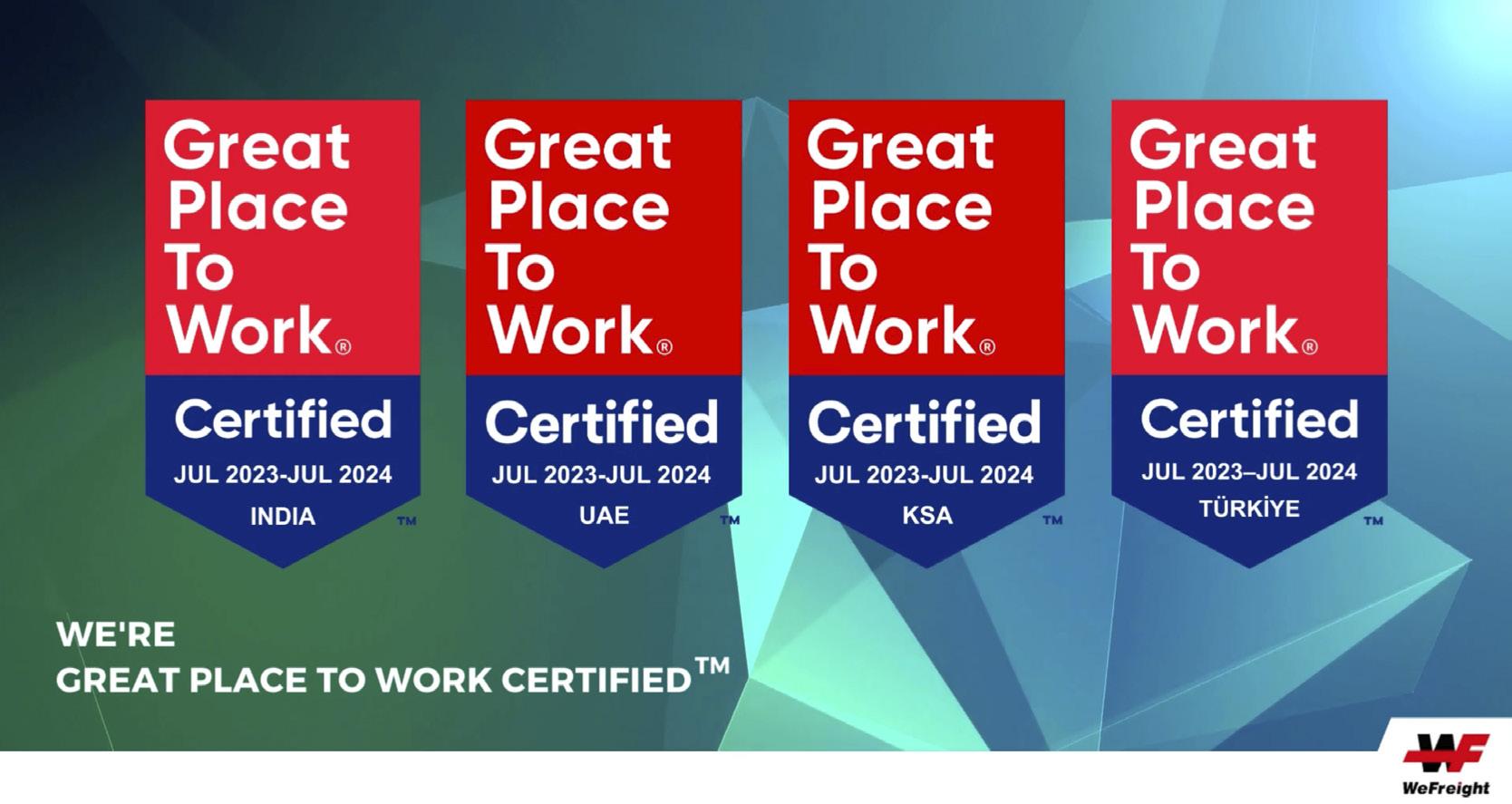
We are thrilled to receive this recognition, which would not have been possible without the collective efforts of our entire team. Our goal is to provide a supportive and inclusive environment where everyone feels valued, heard, and empowered to succeed. We will continue to prioritize our employees' well-being and engagement, ensuring that WeFreight remains a place where talented individuals can grow and thrive.
Gamze Bicil, Global Head of Human Resources, WeFreightGreat Place to Work ® Certification™ is the most definitive 'employerof-choice' recognition that companies aspire to achieve. It is the only recognition based entirely on what employees report about their workplace experience – specifically, how consistently they experience a high-trust workplace. The certification is recognized worldwide by employees and employers alike and is the global benchmark for identifying and recognizing outstanding employee experience. Every year, more than 10,000 companies across 60 countries apply to get Great Place to Work ® -Certified.
Leading freight distributor Pall-Ex Group is helping to improve road safety by being the first network to offer in-house CPC training to its members, and wider body of UK HGV drivers.
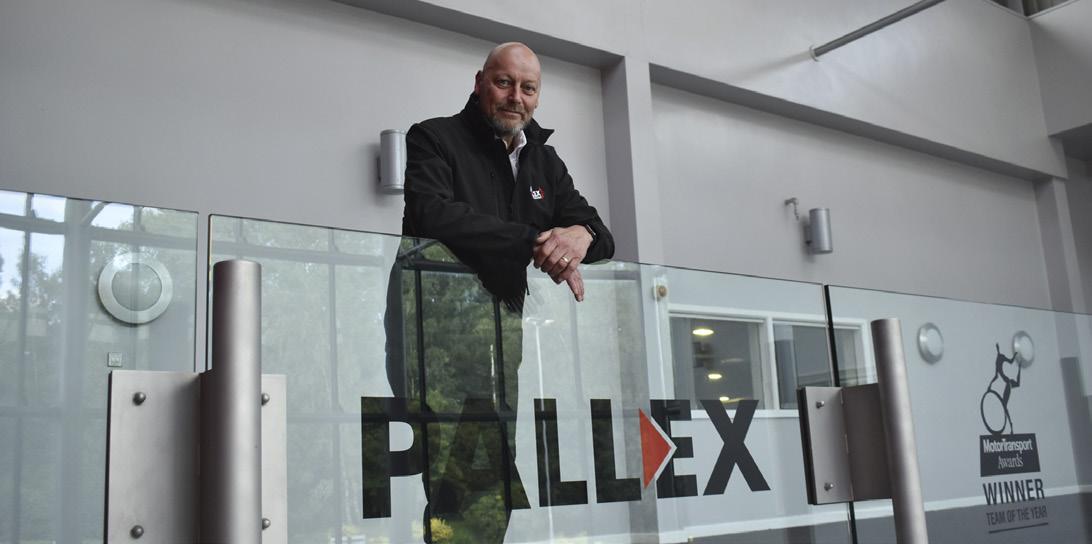
The industry-first initiative has been made possible by the awardwinning Group providing CPC training to one of its established driver instructors, who is now qualified to deliver the mandatory training remotely and across the country.
The Driver Certificate of Professional Competence, or CPC for short, is a statuary qualification needed by anyone who drive a larger vehicle professionally, such as a bus, coach or HGV. To maintain the CPC qualification, 35 hours of periodic training must be completed every five years, something that can now be achieved directly through Pall-Ex.
The Driver CPC qualification was introduced in 2009 to help improve road safety and driving standards, delivered through modules covering legal requirements for drivers and health and safety elements. All those with a Category C or D licence are required to complete the training, with fines of up to £1,000 for those who drive without it or do not renew their training.
Pall-Ex is offering the leading, nationally recognised RTITB approved course, which is either delivered at its central Leicestershire base, or remotely for groups of up to 16 people. It is managed by a fully qualified trainer from Pall-Ex with 25 years of driver training experience and will be tailored to the exact requirements of each depot or group of drivers attending.
Joe Murfitt, Pall-Ex’s Central Hub Manager is organising the training. He commented: Road safety is paramount to all commercial drivers and Pall-Ex is committed to helping keep standards high. By offering this training we are ensuring that commercial drivers in the Leicestershire area, and nationally, are qualified and therefore can legally drive on the UK’s Road network.
The course comprises of two modules which can be completed over eight hours in one day. There is an element of online training, but the bulk is done in person with a qualified trainer, or remotely. All sessions are held on a Saturday so no to disrupt general driver working patterns. Those attending the course need to provide a photocard driving licence; a valid passport; digital tachograph card or a Driver CPC card.
Each driver will receive a certificate of attendance upon completing the course, and there are no exams or tests during the session. All paperwork is completed by Pall-Ex, who will add the training session to each attendee’s Driver CPC training record within a few days of attending the course.
The programme of courses has already commenced, with slots for the remainder of the year filling up fast. Commenting on its initial success Joe Murfitt said: There is a real appetite amongst our members for the CPC training as they trust Pall-Ex's expertise and have welcomed the opportunity to upskill at their own depot. Feedback on the first session has been positive, and longer term we are looking to train more of our driver instructors to deliver the CPC qualification.
12 SEPTEMBER 2023 | Source: PALL-EX
Headford Group's client and candidate interactions are deeply rooted in a consultative approach. As we approach the culmination of a demanding year for businesses and employees, let's delve into the considerations and emerging trends for 2024 in employee engagement and recruitment.
As we enter the final quarter of 2023, individuals are eager to bring the year to a successful close by pursuing both personal and organizational objectives. However, we often overlook valuable lessons learned. Here are essential tips to optimize year-end reviews:
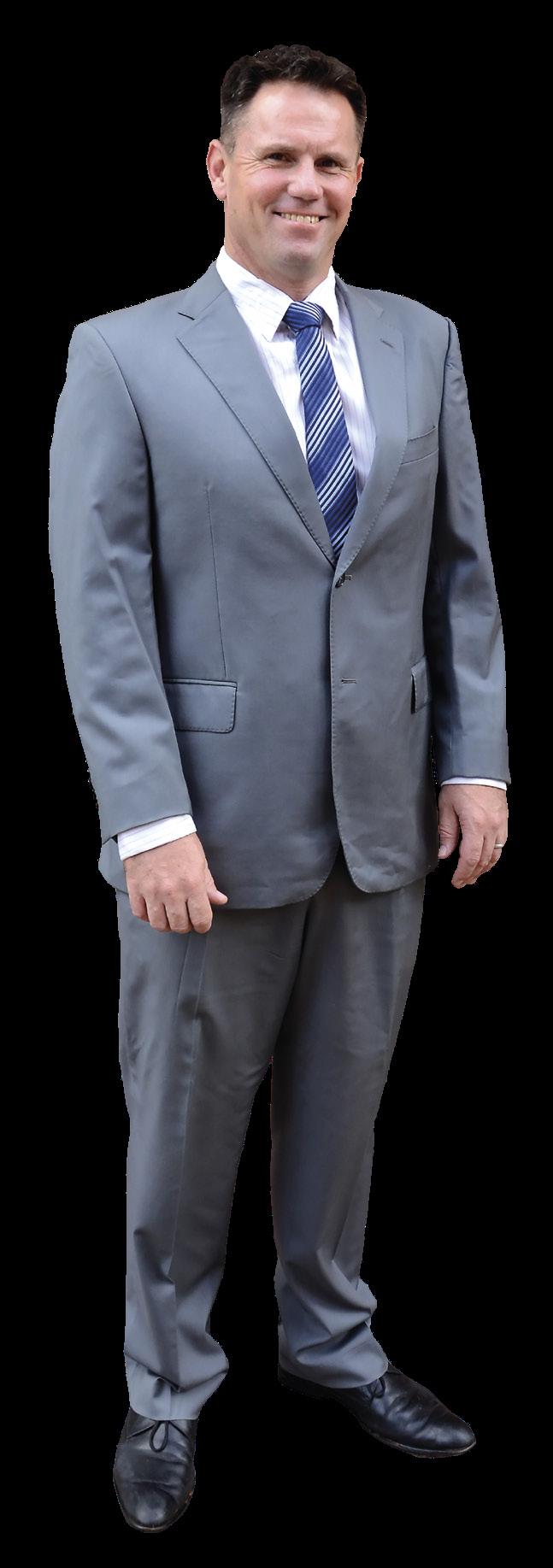
1 Reflect with Purpose: Before entering your year-end performance review, take a moment for thoughtful reflection on your accomplishments in the past year. Acknowledge your contributions to the organization and evaluate how they align with your initial goals. These achievements are instrumental in advancing the company towards its broader objectives. Be prepared to articulate these contributions to your manager.
2 Navigate Your Path to Progress: When you find yourself comfortably settled in your current role, seize the opportunity to inquire about your next career phase, provided you've earned it through hard work. Ensure your aspirations align with your current position and explore tangible steps to bring you closer to your ultimate career objectives. Express interest in potential openings within the company, showcasing your initiative and commitment to excellence.
3 Sustain Ongoing Communication: Consistent communication is pivotal during annual reviews. After discussing your professional goals, schedule follow-up discussions to monitor your progress. Suggest suitable intervals for these follow-ups, whether they occur monthly, quarterly, or during your regular one-on-one meetings. Aligning expectations allows ample time for achieving your goals.
4 Be Explicit: When presenting your goals, queries, recommendations, or ideas to your manager, clarity is paramount. Avoid ambiguity and request transparency in return. A direct and transparent approach provides invaluable guidance to help you achieve your aspirations.
5 Listen Actively: Engage actively during the conversation and consider documenting thoughts and suggestions offered. Keeping a record allows you to revisit specific, actionable feedback. Active listening enhances your ability to provide effective and timely solutions.
6 Maintain a Record: Recall key points from past discussions to keep year-end conversations focused on your future progress. Utilize tools like Fellow to facilitate this process.
1 Commence Positively: Initiate the year-end performance review by acknowledging your team member's accomplishments and strengths. Starting on a positive note sets a constructive tone for the discussion. Positive feedback reinforces desired behaviors and encourages their continuation.
2 Define Clear Goals and Challenges: Annual reviews offer an ideal platform to establish fresh goals and define new challenges for your team members. Ensure that these goals are specific, achievable, and communicated clearly to prevent misunderstandings. Approach goal-setting with enthusiasm to inspire motivation in your employees.
3 Cultivate a Growth Mindset: Promote a growth mindset among your team members by inspiring them to actively seek development opportunities. As a manager, remain attentive to potential professional growth prospects. Emphasize that growth is a dynamic learning journey, which may involve lateral moves and skill diversification, not just vertical promotions.
4 Focus Feedback: Avoid overwhelming employees with excessive feedback; instead, concentrate on one or two critical areas at a time. This prevents negativity and confusion, allowing employees to absorb and act on feedback effectively.
5 Collaborate on Solutions: Empower your employees by involving them in finding solutions during the review. This participatory approach encourages them to take ownership of their development. Listen empathetically to their perspectives and provide guidance while emphasizing their role in shaping their careers.
6 Embrace 360-Degree Feedback: Consider incorporating 360-degree feedback into the review process. This valuable tool provides a holistic view of an employee's performance and aids in identifying strengths and areas for improvement.
Based on insights from these discussions, let's explore how these considerations will shape recruitment strategies for 2024:
1 Balancing AI and Human Involvement: Striking the right balance between AI-driven automation and human intervention in the recruitment process is crucial. AI can streamline candidate sourcing and screening while eliminating biases, provided it's implemented correctly.
2 Evolution of Remote Work: Remote work is here to stay, necessitating the adoption of hybrid models. Expanding the talent pool beyond geographic boundaries is essential to access diverse and top-notch candidates.
3 Diversity, Equity, and Inclusion (DEI): DEI remains a cornerstone for holistic organizational growth. Actively seeking diverse perspectives and investing in inclusivity training is vital.
4 Upskilling and Reskilling: In a competitive talent market, upskilling and reskilling are essential for retaining top talent and attracting new hires.
5 Employer Branding: A strong employer brand is critical in attracting top talent. Investing in employer branding initiatives helps differentiate your organization and appeal to ideal candidates.
6 Emphasis on Soft Skills: Soft skills like emotional intelligence, critical thinking, and communication are gaining importance alongside technical competencies.
7 Employee Well-being: Promoting employee well-being through wellness programs, mental health support, and flexible working conditions is essential for attracting and retaining top talent.
In conclusion, 2024 promises to be an exciting year for recruitment, marked by transformative trends that redefine how organizations engage and retain talent. By understanding and embracing these trends, recruiters and HR professionals can position themselves ahead of the curve and secure the best talent for their organizations.
Robert Nel, Principal Management Consultant, Headford UK/EU


























With limited options for where to buy food, drink and supplies whilst on shift, HGV drivers have traditionally often been forced to pay higher prices at expensive service stations or truck stops, pushing personal costs up.
With the current cost-of-living crisis and food costs remaining high, HGV drivers are being hit even harder when it comes to costs on the road.
To help support drivers in reducing the burden of these additional costs, HGV training experts, Driver Hire Training, have put together some expert tips for keeping spend down when working as a HGV driver.

Meal prepping can not only save you money but often leads to healthier meals as you have more control over what you are cooking, at more affordable price points.
Deciding what to eat in the moment during a shift often leads to buying overpriced meals, and fast food is frequently the quickest, cheapest option. From a health perspective, fast food will give you immediate energy, but will often see you crash and feel tired much sooner than when eating a healthier meal[1]. This can lead to buying more snacks to keep you going, which in turn will cost even more money. In the current economic climate, this is something we all want to avoid.
Meal prepping can seem tedious and time consuming in the moment, however, it doesn’t have to be complicated. There are lots of simple batch cooking recipes out there, and it will save time in the long run.
Thinking through the working week in advance and planning meals is a great way to save money on food on the road. You can batch cook simple, high energy and high protein meals such as pasta dishes or curries. Salads, fruit and even sandwiches made in advance are also good options . Forward planning can really help you to stay healthy while keeping costs down.
Richard Owen Hughes, Marketing Director, Driver Hire2
Especially during the hot summer months, drinking plenty of water when driving is imperative. Whilst you can buy bottled water at service stations when you stop, doing this each day will soon start to add up.
Take a couple of full reusable water bottles with you on your shift. If the place you stop has a water refill station, you can use this to top up if you run out. This way, you’re saving money, keeping adequately hydrated and helping reduce plastic waste throughout the day, says Richard.
Even with nutritious meals, it’s normal to feel like snacking during the day. Especially whilst doing a job with high concentration, you want to feel energised and ready for anything on the road, and a snack, especially late morning and mid-afternoon can give you the boost you need.
Bulk buying snacks such as fruit, nuts, protein bars and yoghurts are a great way to stay energised and keep costs low. Buying snacks individually at service stations or truck stops costs more, and the temptation in the moment will likely be something unhealthy, as it’s cheaper and more instantly satisfying. Buying multipacks from supermarkets and having slow-release energy snacks at the ready will lead to healthier and cheaper choices throughout your shift.
Other sources of unnecessary costs whilst on shift are forgetting things like phone chargers, sun cream, and bathroom supplies. Being disorganised and forgetting the essential items you need can lead to having to pick up these items at higher prices whilst on the road. This hurts all the more if you have these items already at home, and could have brought them along for free.

Create a checklist or even a prepared kit bag of things which are essential to your shift, in summer or winter, and make sure you have everything ready before you start on the road. That way, you will never leave without them, and can ensure you won’t face unnecessary costs whilst working. Essential items vary from personal hygiene items, like flip flops for the shower, to sun cream
for those hot summer days. Either way, you don’t want to be paying more for these items at service stations, so make sure you pack everything you need before you go.
Driver HireTO
WELCOMING IN THE POSITION OF
TRANSLAND GROUP
GARY OWEN COMMERCIAL DIRECTOR

Transland Group has appointed a new commercial director.
Gary Owen moves from Palletways’ UK network, where he spent four years as European Product Manager before his promotion to Head of Commercial, to Transland Group. As part of his new role he will head up Transland’s commercial team in the UK to focus on international business development.

We are delighted to have Gary on board. His experience with Palletways means that he is already familiar with how we operate so he can hit the ground running. I believe he’ll be a massive addition to the company.
Kieran Conlon, Managing Director, Transland GroupWANT
Get
Gary added: Transland has been one of Palletways’ strongest members for the past 15 years. I’m looking forward to taking the business to the next level in terms of new global opportunities.
Transland Group is one of Ireland and the UK’s most reputable and innovative transport and logistics companies, with offices in Dublin and Fradley, where Gary is based. It has operated as Palletways’ Southern Ireland member since 2008 and since Brexit, the company has emerged as a leading Customs Clearance expert in the movement of goods between the UK, Ireland and mainland Europe.
It’s one of over 120 independent transport providers that are part of the Palletways UK network, belonging to Imperial, a DP World company. They benefit from shared expertise and resources from within the group to deliver consignments of palletised freight to market faster and more cost-effectively than ever before. The Palletways Group, renowned for its industryleading IT developments and operational systems, comprises 450+ depots and 20 hub operations, through which it provides collection and distribution services across 24 European countries, including the UK.
WELCOMING IN THE POSITION OF
FLEET OPERATIONS APPOINTS NEW COMMERCIAL DIRECTOR TO ACCELERATE GROWTH AMBITIONS

Drawing upon more than 20 years of fleet experience –from a leasing and manufacturer perspective – Hyett will oversee the commercial development of the business, growing its UK customer base and offering, while driving cost-efficiency savings for fleets on their net zero journeys.
Responsibilities for the former National Fleet Sales Manager at Volkswagen UK and Head of Mega Fleets and Sales Director at Lex Autolease will also extend to enhancing the skills and capabilities of the company’s sales team.

ABOUT FLEET OPERATIONS
Doug’s appointment marks the latest step in an exciting chapter for Fleet Operations, as we continue our rapid growth trajectory, injecting fresh thinking, innovation and energy into the fleet automotive sector. He shares our values, customer-first mentality and longterm strategic vision. His extensive leadership experience and impressive in-depth knowledge of the industry will make him an invaluable addition to our team.
Richard Hipkiss, Managing Director, Fleet Operations
Hyett added: I’m delighted to join Fleet Operations, an agile, innovative company with an enviable heritage of independence and unrivalled expertise in delivering tailor-made solutions to meet clients’ needs. I am confident I can help the company to continue to raise the fleet management bar, supporting and cost optimising fleet businesses as they navigate a period of considerable change for industry.Fleet Operations’ services include strategic consultancy, multi-bid leasing, supply chain management, policy creation and risk management, data consolidation, outsourcing and vendor management.
TO FORWARDER magazine Issue 83 107
Iam an extremely enthusiastic and dedicated member of a team, who is passionately driven by the client-centric and partnership approach.

I have 24 years of experience in client/customer service & operational management, in both the public & private sectors.
Sports generalist with the standard love of football and rugby; however, my real passion is spearfishing (Google it); it’s not like Tom Hanks in Castaway, it’s way cooler. Outside of sports it's spending QT with my fiancée, 4 kids and our dog...doh! should have said them first, really...
FAVOURITE ANIMAL
Our Shelby the 4yr old 'Frug' (French bulldog, pug cross)
INTERESTING FACT
A human body is composed of many elements. One of the lesser known elements is actually gold. An average person's body of 70 kilograms would contain a total mass of 0.2 milligrams of gold.
GET IN TOUCH...
+44 (0)1454 275933


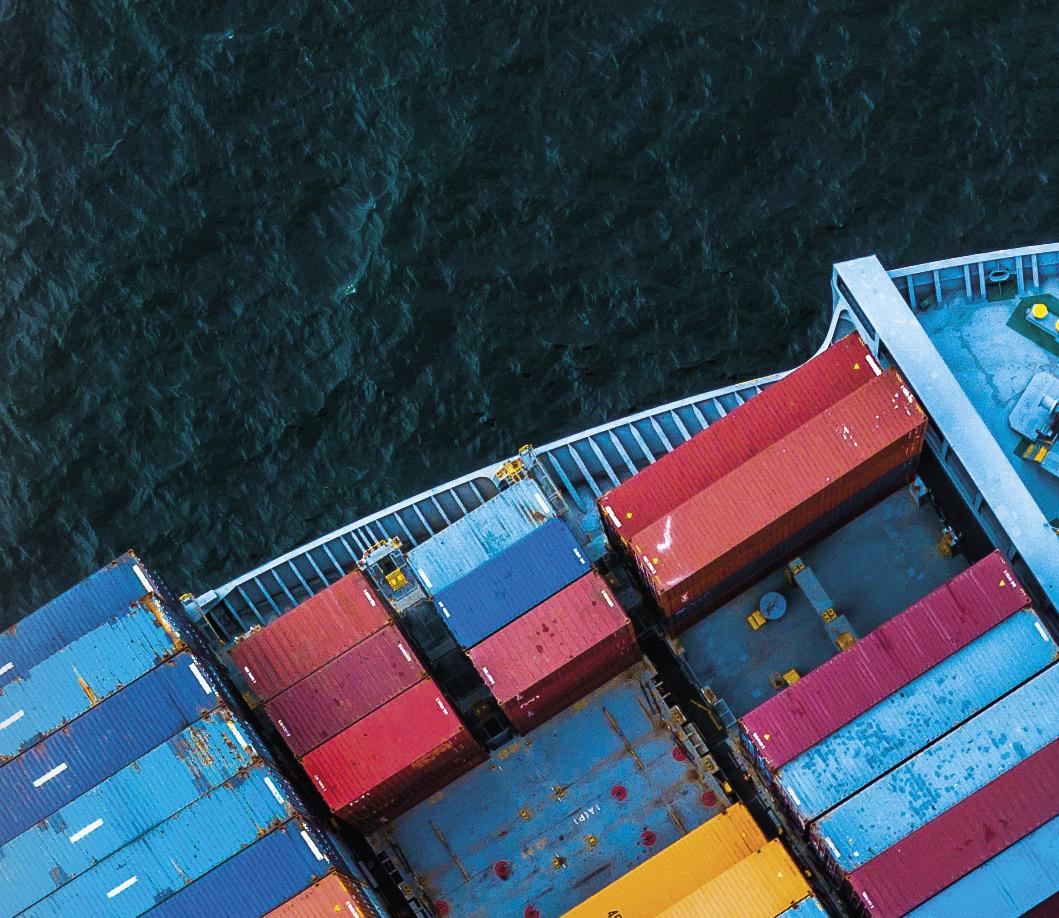
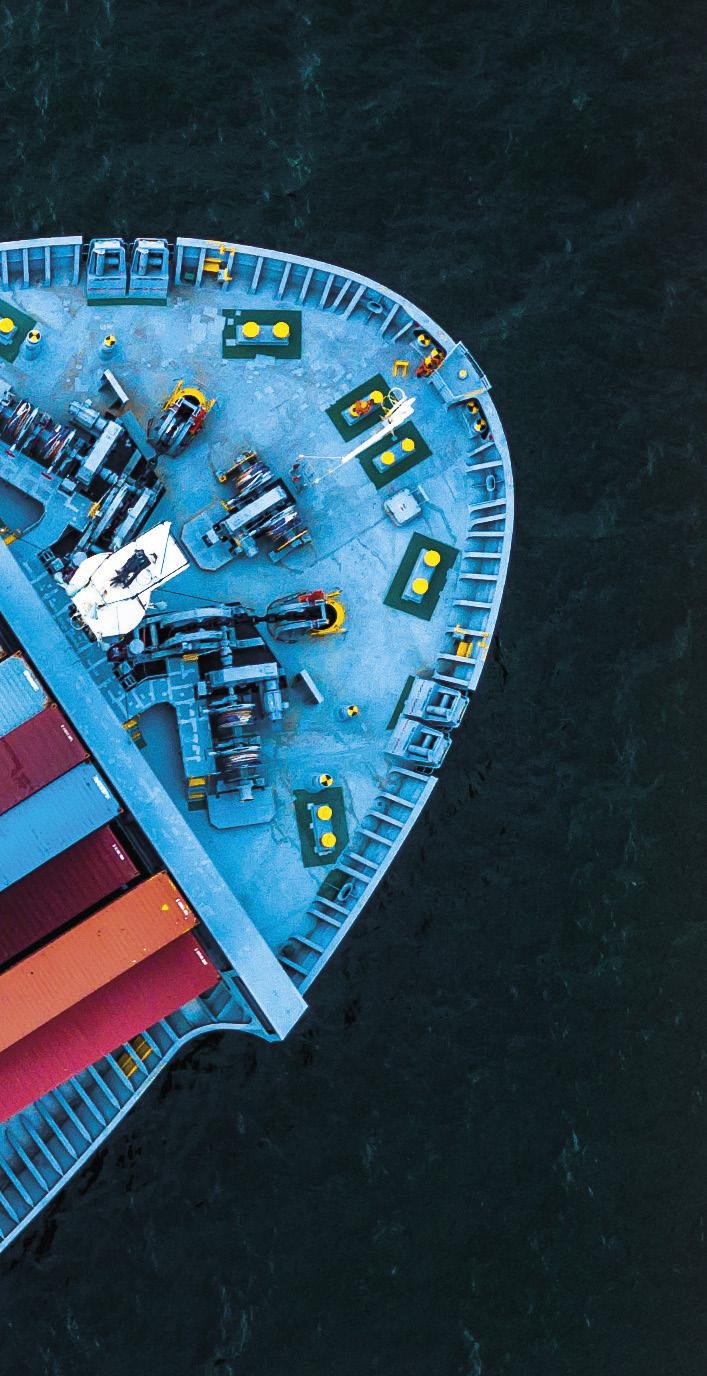


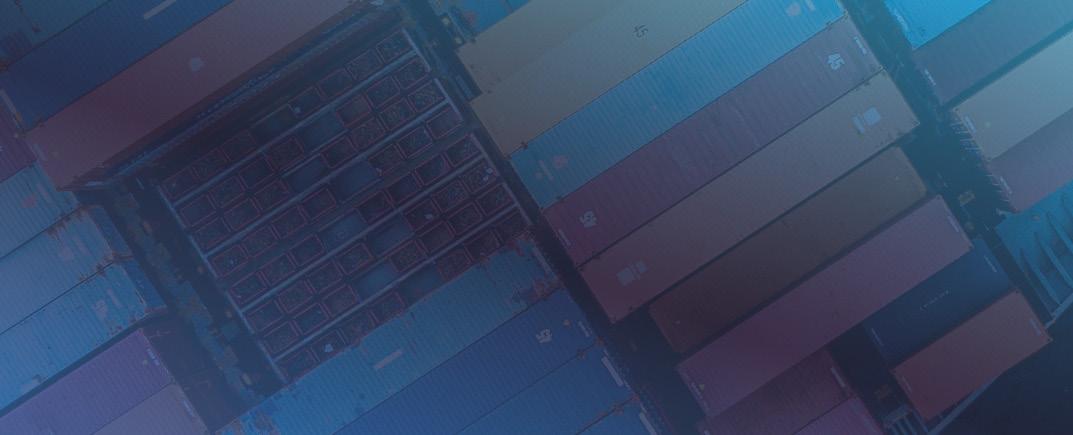


HAMBURG, GERMANY
Salary: €80,000–€90,000
• Builds successful partnerships with key stakeholders at all levels of customers’ organizations to cultivate relationships and generate revenue opportunities across all FF product and service lines.
• Presents solutions to customers to gain approval of proposals and move forward with the sales process.
• Sells technology solutions (Flex Global View) to customers to secure their business, provide added value to proposals and satisfy business needs.
FRANKFURT, GERMANY
Salary: €50,000–€64,000
Financial analyzes & action plans:
• Accounts payable control and coding
• CASS difference report
• Cost development analyzes
• Statistical reports for management
Drive Operational excellence:
• Process optimization (LOP/SOP adjustments)
• Quality Management (KPI performance)
• Compliance
• Performance reports
• Support to identify training needs and develop training plans
• Development of action plans
Customer Service:
• Coordination between gateway and service centers
• Support Implementation of new customers
• Handling of Customer Complaints
• Develop and promote use of CEP
BIRMINGHAM, UK
• To provide shipping, transport and forwarding expertise across Ocean movements, to build and develop relationships with customers, understanding their needs and requirements. To provide service information, quotations, take bookings and champion the needs of the customer.
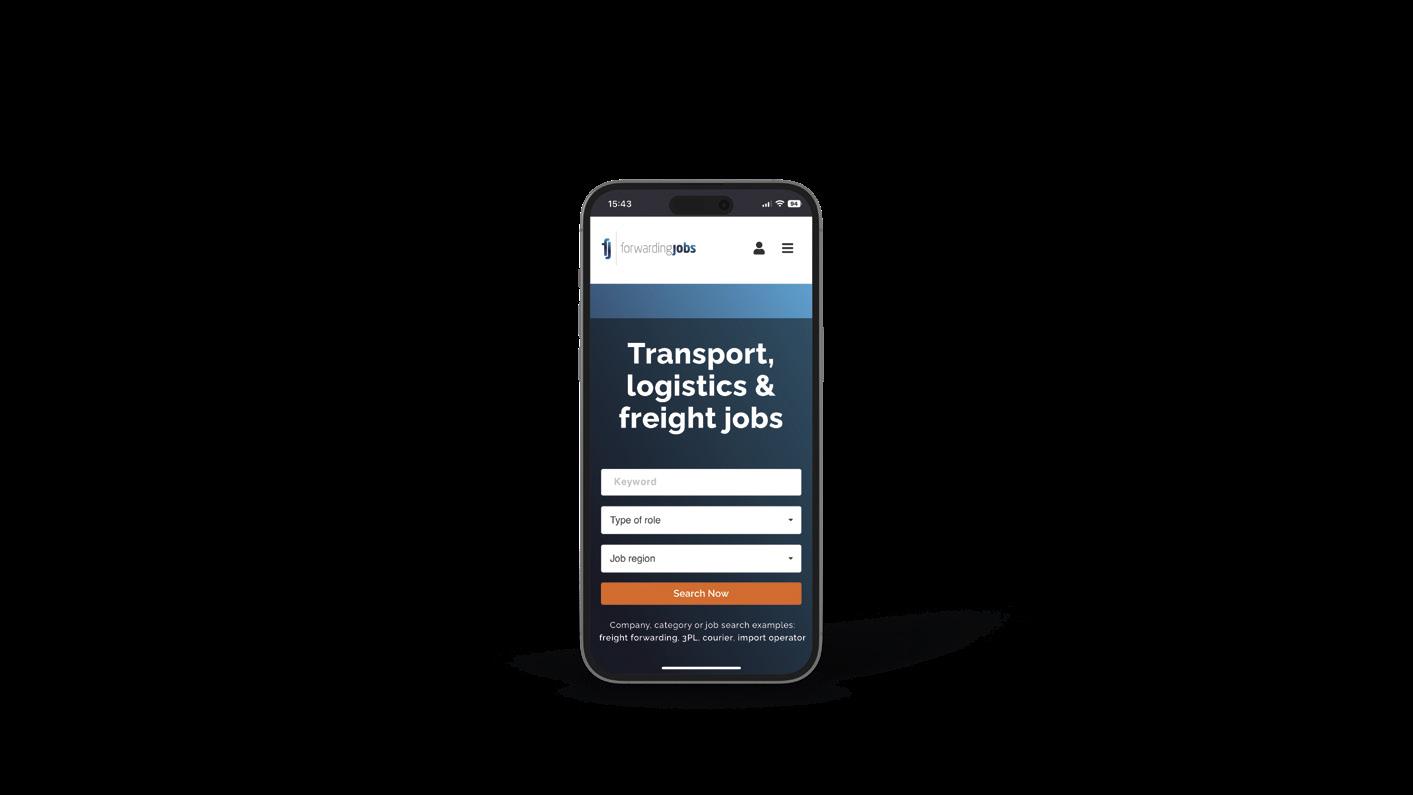
• To operate, provide service information, quotations, take bookings and champion the needs of the customer.
• To offer a high standard of customer service, by providing accurate and appropriate information and demonstrating a professional, helpful and positive manner.
COLNBROOK, UK
• Assist in defining and creating process maps & standard operating procedures
• Update & manage controlled documents
• Carry out various ad hoc project related tasks
• Maintain & update project plans
• Issue & log non-conformance reports
MIDLANDS, UK
SALARY: £ 45 ,000
• This is a fantastic opportunity to join a company committed to providing quality, innovation, and value-added logistics services.
• Based at DSV Road Tamworth the successful candidate will cover a designated set of postal codes across either the East or West Midlands region of the UK
ATLANTA, GA
SALARY: CIRCA $45 ,000 - $55 ,000
• Provide accurate, timely, and proactive customer service to the Company’s customers as well as effectively communicating and coordinating with internal departments and third parties to meet customer requirements
• Process simple and complex freight forwarding services, while following all government regulations and abiding by company policies and procedures
• Maintains thorough understanding of regulations and laws affecting international transport of cargo
MIAMI, FL
SALARY: CIRCA $38, 400
• Obtain all necessary information from the customer including weight, dims, container size, temperature, etc. to plan the best and most efficient routing for the shipment via LCL of FCL
• Book the cargo with ocean carrier, trucking companies, warehouse companies, cold storage, etc. as needed for the shipment
• Capable of finding solutions for the customers to their satisfaction, while earning profit for the company
REMOTE – EAST COAST/CENTRAL TIME ZONE
HOURS
SALARY: CIRCA $ 80,000 - $ 95 ,000
• Seek the most profitable mode of transportation while meeting the customer’s requirements for the movement of their cargo.
• Proactively identify gaps and contribute to the process of establishing controls resulting in zero compliance issues
• On-board new team members providing them with the proper resources including training on our SOP’s and software tools/systems
TORONTO, ON
SALARY: CIRCA $55,000 - $65,000
• Leading the Domestic & International Ocean, Air, Inland Freight Forwarding services, you will have responsibility for managing all Ocean, Air and Inland operations and pricing activities. Operations Manager provides planning for, direction to, and controls available resources associated with the timely, damage-free movement of cargo.
• Work closely and support sales and pricing teams, customers and vendors to develop the freight forwarding products Ocean, Air, Inland.
• Monitor company’s or department’s performance, prepare periodically reports for senior management, ensuring compliance with the company’s partner/vendor/country/ government standards and regulations
FOR MORE INFORMATION & TO APPLY, PLEASE FIND THESE ROLES ON
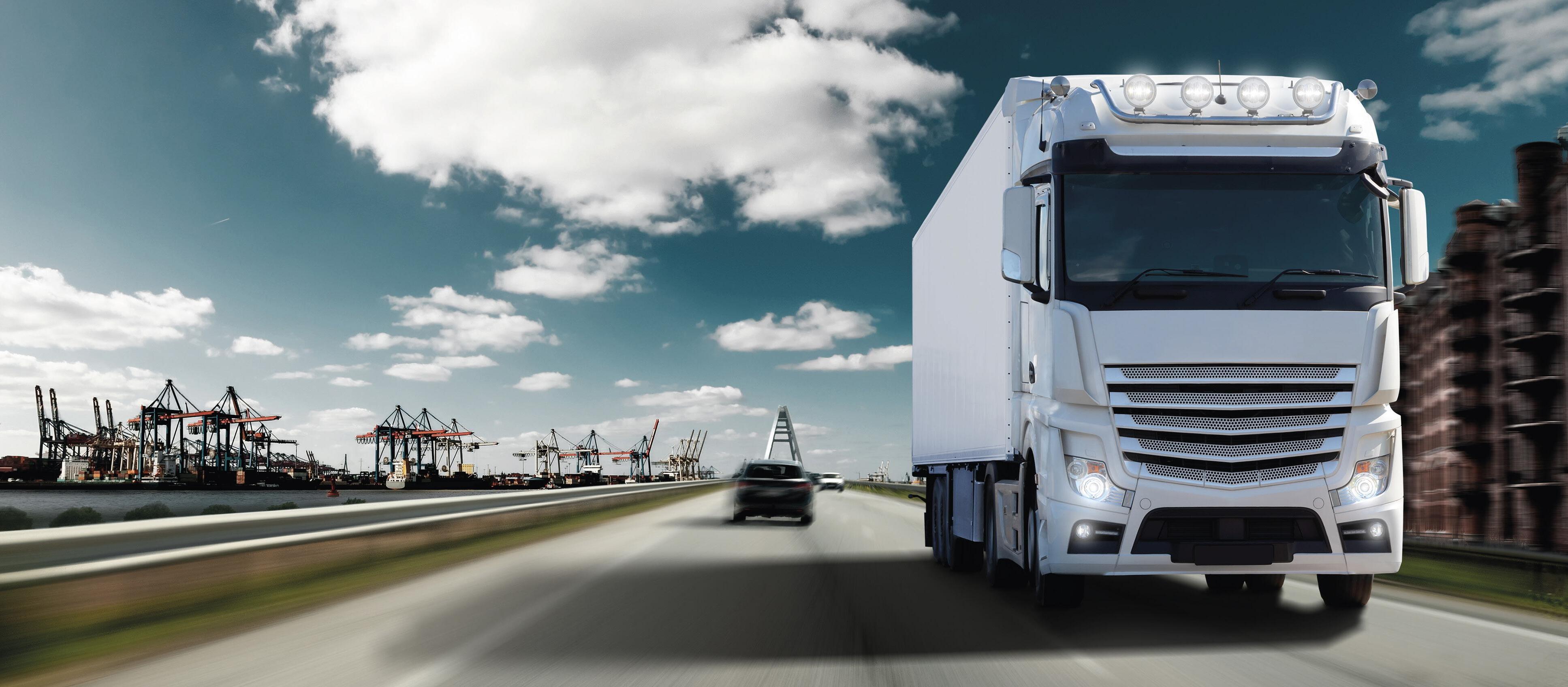














The consolidation of companies or assets through various types of financial transactions.
Related topics
Contracted partnerships
Management buyouts
Valuation
Sponsored by F REIGHT
Logility, Inc., a leader in prescriptive supply chain planning solutions, today announced it has signed a definitive agreement to acquire Garvis, a visionary SaaS startup that combines large language models (ChatGPT) with AI-native demand forecasting. The combined organization will enable a new supply chain planning paradigm with DemandAI+ that moves beyond conventional methods to plan demand and inventory at the speed of the market.
Instead of relying on traditional models, Garvis designed from the ground up an AI-first forecasting solution now called DemandAI+. Fusing Generative AI with machine learning algorithms, DemandAI+ creates a modern, more inclusive, and intuitive planning paradigm that quickly digitizes supply chain relationships and exposes that data to any stakeholder across the organization. By simply asking questions planners, executives, and non-planners alike get answers to unanticipated queries in real-time, providing transparency for more informed decisions that saves precious planning time.
Digital Supply Chain Platform as the solution for demand forecasting. The acquisition, which is expected to be accretive within 12 months, advances Logility as the only supply chain planning platform leveraging Generative AI, advanced AI-driven algorithms, and machine learning. This innovative approach addresses base demand, promotional lift, causal forecasts, external data, and user insights within a single solution improving forecast accuracy and aligning organizations in today’s dynamic market.
We are at the precipice of a significant transformation in supply chain planning with advancements in technology, generational shifts of planners, and the significant speed of market changes and disruptions. With an AI-driven approach at their core, Garvis revolutionized the way companies forecast demand in very dynamic markets. We’re bringing them into Logility’s portfolio to accelerate our shared vision to break the boundaries of traditional myopic supply chain planning solutions.
Allan Dow, President, Logility
Proven over 70 implementations, clients have been translating buying behavior, market dynamics, and other events into forecasts across products, locations, and customers. DemandAI+ allows companies to understand how to react to changes as they happen – ultimately improving forecast accuracy and service levels, even for heavily promoted, highly seasonal, or intermittent products.
Our clients have realized epic results by using AI-driven algorithms and natural language interfaces to gain insights into the peaks and troughs of demand and quickly communicate that knowledge to the rest of the organization. Results have included a 70% savings of weekly planning time, 15-30% reduction in forecast error and improved inventory management – all with ridiculously fast implementation times.
Piet Buyck, CEO, Garvis
The Rhenus Group is acquiring BLU Logistics, a leading LATAM freight forwarder present in Argentina, Colombia, Ecuador, Mexico, Paraguay and Uruguay as well as in Mainland China and Hong Kong with more than 180,000 TEUs of ocean freight volume.

Additionally, Rhenus is securing a majority share of 51 percent in LBH Group, which operates in more than 30 countries worldwide, including six in the LATAM region, and has additional alliances in several Central American countries.
Combining the BLU and LBH teams will result in the Rhenus Group growing its LATAM workforce by 2,200 employees, reinforcing Rhenus dedication to the region by enhancing its local capabilities and contributing to its global expansion efforts.
These strategic actions aim to bolster Rhenus presence in LATAM to accelerate further growth in global trade and enhance its Asia-LATAM trade lane, nearshoring capabilities, and service options in light of the industry trend to diversify sourcing and supply chains.
Rhenus, a leading global logistics specialist, is further expanding its existing presence in the Latin America (LATAM) market through strategic initiatives designed to enhance its service portfolio and capitalize on the region’s growing potential for globally connected supply chains. The company has announced its acquisition of Colombia-based BLU Logistics and a majority shareholding of LBH Group, bolstering its capabilities in the region and reinforcing its commitment to global supply chain connectivity.
Our strategic acquisitions allow us to further strengthen our global network and service portfolio in the LATAM region, where we see increasing demand for logistics services, especially for the e-commerce industry. In addition, the region’s proximity to the North American market fosters a robust environment for nearshoring, which aligns perfectly with our growth strategy. Together with BLU and LBH, we create a unique position with the value of a family-business for our customers and people by offering a strong footprint in key markets to secure more robust supply chains globally.
Tobias Bartz , CEO & Chairman, the Rhenus Group.The Rhenus Group has a strong foundation in LATAM, with established operations across Argentina, Brazil, Chile, Colombia, and Mexico. Their recent acquisitions have paved the way for even broader geographical coverage including BLU Logistics' additional presence in Uruguay, Paraguay, and Ecuador, as well as port agency services in Latin America, among others in Colombia, Brazil, Panama, Curacao and in several Central American countries from LBH. This expansion complements Rhenus leading position in the Asia-LATAM corridor, leveraging BLU's robust trans-Pacific freight forwarding network. This strategic move not only allows Rhenus to expand its activities in the region seamlessly but enables BLU to extend its reach to European and Indian trade lanes, leading to significant growth in its existing customer offerings and crossselling opportunities. David Kassin, previously associated with BLU Logistics, will assume the role of CEO for Rhenus Air & Ocean LATAM.
This is a win-win-win for BLU Logistics, Rhenus, and above all, our customers. The global Rhenus network gives us the possibility to further explore other regions and to expand our client base to new segments and geographies, especially to India and the Middle East, as well as Southeast Asia, Europe, and North America. The synergy between BLU and Rhenus, driven by our shared commitment to customer-centricity, team cohesion, and entrepreneurial spirit, will propel us to even greater heights.
David Kassin, CEO of Rhenus Air & Ocean LATAMThe acquisition of a majority share in the LBH Group enables Rhenus to enter and cover the Latin American, Asian, Australian, and African markets as a globally oriented port agency with business sites in 24 countries worldwide as well as alliances in 7 additional countries. As part of the acquisition, the logistics specialist is taking over all the employees at the globally active maritime shipping agency, which includes processing incoming and outgoing vessels – regardless of whether they carry bulk goods, liquid cargo, containers, or general cargo. Rhenus is aiming to extend the takeover to include 100 percent of the shares during the next few years. Both parties have been cooperating in a relationship of trust for many years.
We’re looking forward to successfully pressing ahead to grow our business together, with our trusted partner Rhenus becoming a permanent feature in our future orientation.
 Bert Lagendijk, Managing Partner, the LBH Group
Bert Lagendijk, Managing Partner, the LBH Group
Together with his brother Jan Lagendijk, both co-founders of LBH will initially remain active on board to tap into future growth opportunities.
Following the recent announcement that PML is now part of the Seafrigo Group, Seafrigo Regional CEO Jason Spencer-Knox and PML Seafrigo Director Mike Parr shed more light on the acquisition and its significance for clients seeking a global logistics chain solution for perishable goods.
With Seafrigo enjoying a 47-year heritage, and PML celebrating its 20th anniversary in 2023, the combined knowledge and expertise of both companies within the temperature-controlled goods sector is impressive, and reinforces the Seafrigo ‘world-leading specialist in temperature controlled logistics’ proposition. For PML Seafrigo customers, the move provides clear opportunities to capitalise upon Seafrigo’s extensive geographic reach to deliver a truly global, secure end-to-end solution.
In line with Seafrigo making a conscious decision to be asset heavy to enable complete control of the entire cold chain and avoid reliance on third parties, acquiring PML provides ownership of the company’s HMRC / DEFRA approved Border Control Posts and ERTS bonded warehouse facilities in Kent and Heathrow – in addition to expanding its superior UK customs handling service. It also represents an opportunity to grow its European road freight offering, increasing its HGV fleet by a further 30 Euro 6 compliant lorries, six of which feature the pioneering powered roller bed floor system representing a UK first.
PML Seafrigo customers will now benefit from seamless access to new supply chain routes all over the world, across air, ocean and road, which includes an exciting new product for ocean freight customers.
These are exciting times for Seafrigo and PML Seafrigo. Not only do the two businesses align in terms of their product offering and dedication to offering an exceptional service which ensures the transfer of temperature controlled goods with no break in the cold chain, they also share a similar ethos in terms of an overriding commitment to always place the needs of the customer at the heart of any corporate decision making, choosing to remain autonomous rather than developing reliance on services controlled by third parties. The sensitive nature of the freight that we both specialise in requires the utmost attention to detail to guarantee an efficient and speedy transfer to maximise shelf life, the ‘golden mile’ is a major hurdle for growers, producers and manufacturers especially in light of the additional challenges presented by Brexit, PML Seafrigo represents a safe and reliable partner to complete the journey. Bringing PML into the Seafrigo fold brings us one step closer to realising our ambition to become the fastest and largest integrated perishable supply chain provider in the UK and globally.
Jason Spencer-Knox, Regional CEO, SeafrigoAs a business we’ve always taken pride in being ahead of the curve, constantly innovating our product offering and adapting to the everchanging needs of the industry. Our priority remains to offer a bestin-class service for perishable goods and by providing our customers with a direct route to the global infrastructure available via Seafrigo, we can continue to grow our operations, supplying genuinely worldwide logistics and supply chain solutions delivered with the outstanding knowledgeable and highly personalised customer care for which PML is renowned. After 20 years’ in the industry, we are looking forward to embracing this new phase of growth and expansion whilst also providing our staff with excellent career development opportunities.
Mike Parr, Director, PML Seafrigo








This is a UK company based in the East, they have been established in excess of 20 years and run by two shareholders. The owners now want to become part of a larger group where they can expand and develop their resources. They are willing to stay with the business for period of two to five years to assist with the growth and ensure there is a clean transition.
• 2 shareholders
• Established 20+ years
VERTICALS
• Events
• Construction
• Food & drink (ambient)
2022 (forecast)
Revenue: £6,586,381
Gross Profit: £1,059,360
Net Profit: £418,777
2021
Revenue: £6,994,226
Gross Profit: £1,142,661
Net Profit: £317,910
• Manufacturing LOCATION
East, UK
• Europe -
CONTACT
Andy Dalton , Head of M&A enquiries@freightmergers.com
+44 (0)1454 275 933
SELLER
This is a well-established business based in the South East, UK. They have a strong reputation within the industry and cover a range of modes. The shareholders are looking to exit the business as they have been running the company for 15 plus years and they would like to do something different other than freight forwarding.
• 2 shareholders
• Est. 15+ years
• 20 staff (as of Feb-22)
• 3 offices
• Asset light
• No client over 20% of turnover
• 2nd tier management in place
• Membership/Accreditation: BIFA, IATA, FIATA
• Road: Import 11%, Export 30%, Domestic 1%
• Air : Import 9%, Export 11%
• Sea : Import 4%, Export 5%
• Courier : Import 7%, Export 10%, Domestic 1%
• EU customs clearance: Import 3%,Export 7%, Other 1%
*Year-end August
Feb 2022 (6 months)
Turnover: ~£2.4m
Gross Profit: ~£520k
Net Profit: ~£87k
Aug 2021
Turnover: ~£3.8m
Gross Profit: ~£850k
Net Profit: ~£215k
South East, UK
Aug 2020
Turnover: ~£2.8m
Gross Profit: ~£670k
Net Profit: ~£133k
AUG 2019
Turnover: ~£2.5m
Gross Profit: ~£610k
Net Profit: ~£28k
CONTACT
Andy Dalton , Head of M&A enquiries@freightmergers.com
+44 (0)1454 275 933
USA CUSTOMS BROKER & FREIGHT FORWARDER SEEKING ACTIVE BUYER
This US-based company is seeking an active and experienced buyer who is in the market for a well-known traditional customs broker and freight forwarder. They are involved in various aspects of international transportation, specialising in the handling of sensitive and ‘special needs’ cargo including time-sensitive shipments, perishables, heavily regulated commodities, government cargo, hazmat, oversized/overweight and highvalue merchandise.
• Est. 1982
• 2 shareholders
• A range of operating licences:
- IATA, CNS
- TSA/DOT/FAA
- Licensed customs broker
- Duty drawback specialists
- ISO 9002 – 1994
- C-TPAT
- SAM
• NVOCC (Including DoD)
• Warehousing: 3,000 sqft
• International transport
•
FINANCIALS
January to May 2021
Revenue: $10.8m
Gross profit: $1.9m
Net profit: $ 875k
Forecast full year 2021
Revenue: $ 30m
Gross profit: $ 4m
Profit before tax: $2m
2020
Revenue: $19.1m
Gross profit: $ 3.4m
Net profit: $ 634k
2019
Revenue: $12.5m
Gross profit: $2.6m
Net profit: $130k
•
LOCATION
USA
SELLER F REIGHT
CONTACT
Andy Dalton , Head of M&A enquiries@freightmergers.com
The two main shareholders, being in agreement, are looking for a retirement driven exit, with both having spent over 40+ years in the freight industry.
A second tier of directors/minority shareholders, have been put in place to continue and move the business forward. A niche market, single commodity-based forwarder, with active offices in the UK and USA, along with long term and established global partners. A strong and well respected reputation within the industry space, long standing established and focused specific trade lanes, together with additional global coverage.
• Est. 2005
• US Office opened 2008
• 2 Majority shareholders/ Directors
• 4 Newly appointed minority shareholders/Directors since 2022
• Locations: Essex, UK New Jersey, USA
• Members of staff: 26 across two sites
USA office
• Sea import: 40%
• Air import: 5%
• Domestic: 5%
• Far East to UK: 25%
• Far East to USA: 30%
• UK to USA: 25%
• USA to UK: 10%
• Other Business: 10%
All Services multiple LCL Loadings with additional FCL movements. On weekly basis. Business profile is based on customer control on FOB terms on all routes.
UK office
• Sea import: 30%
• Air import: 5%
• Domestic: 15%
2023 Q1
Revenue £ 2.2m
Gross Proft £ 684k
Profit before tax £ 369k
2022
Revenue: £12.2m
Gross Profit: £3.2m
Profit Before Tax: £1.7m
2021
Revenue: £ 9.1m
Gross Profit: £2.2m
Profit Before Tax: £963
2020
Revenue: £5.1m
Gross Profit: £1.4m
Profit Before Tax: £209k
Debt free, asset light, cash positive
Essex UK & New Jersey USA
Andy Dalton , Head of M&A enquiries@freightmergers.com
+44 (0)1454 275 933
The promotion and dissemination of knowledge and information about products and organisations both externally and internally.

Related topics
Website design
Social media
Promotional techniques
Sponsored by
Rugby World Cup 2023 runs from September 8 to October 28, 2023, in France. GEODIS has been chosen as Official Freight Carrier for the tournament. Behind this international sporting event lies a tailor-made logistics operation that will ensure the tournament runs smoothly.
The GEODIS group has assigned around 140 employees to the operational organization of this event. In all, some 80 tonnes of equipment essential to the teams will be airlifted to France, then transported between the teams’ hotels and the 10 host cities.
GEODIS is responsible for transporting equipment to and from the countries of origin of the various teams, located on five continents.
From the start of Rugby World Cup 2023 and throughout the 51 days of competition, more than 40 GEODIS drivers will be transporting equipment for the 20 participating teams, including players’ kit, as well as training and body-building equipment, between the teams’ base camps and the stadiums where the matches will be played. This represents an average of 4 tonnes of freight per team. For journeys of under 300 kilometers, road transport will be used with biogas-fueled vehicles.
To provide all these services in France and in the teams’ home countries, GEODIS is relying on both its Freight Forwarding and Distribution & Express Lines of Business, with coordination handled by a dedicated control center based in Brive-la-Gaillarde, in southwest France.
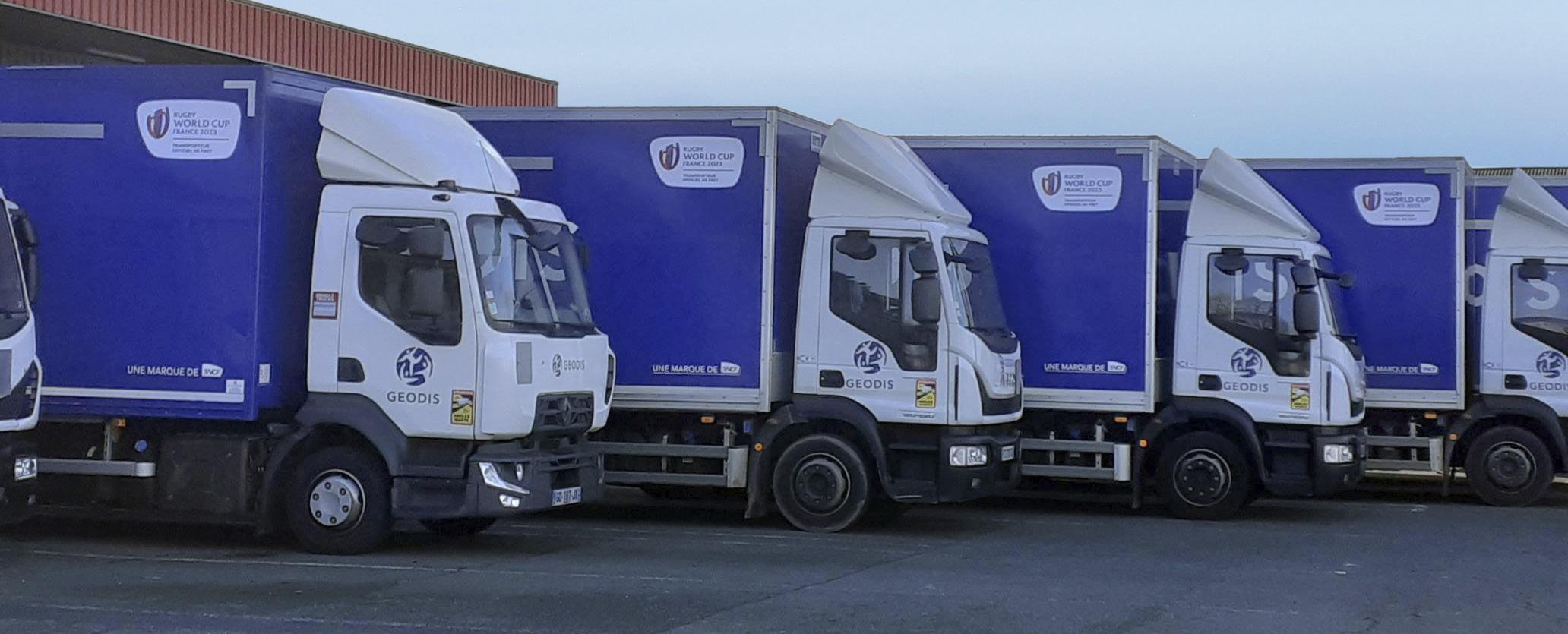
Transport and logistics are among the prerequisites of any successful sporting event. On the strength of our experience at Euro 2016 and the Women’s World Cup in 2019, we will be providing a robust, coordinated operational system for this prestigious sporting event, which embodies the values of commitment, trust and solidarity – values that mirror those of GEODIS. Our fast-acting, highly-skilled teams are capable of handling any contingency that may occur throughout the tournament, and thanks to them we are proud to be the Official Freight Carrier for Rugby World Cup France 2023.
Stéphane Cassagne, CEO France, GEODIS
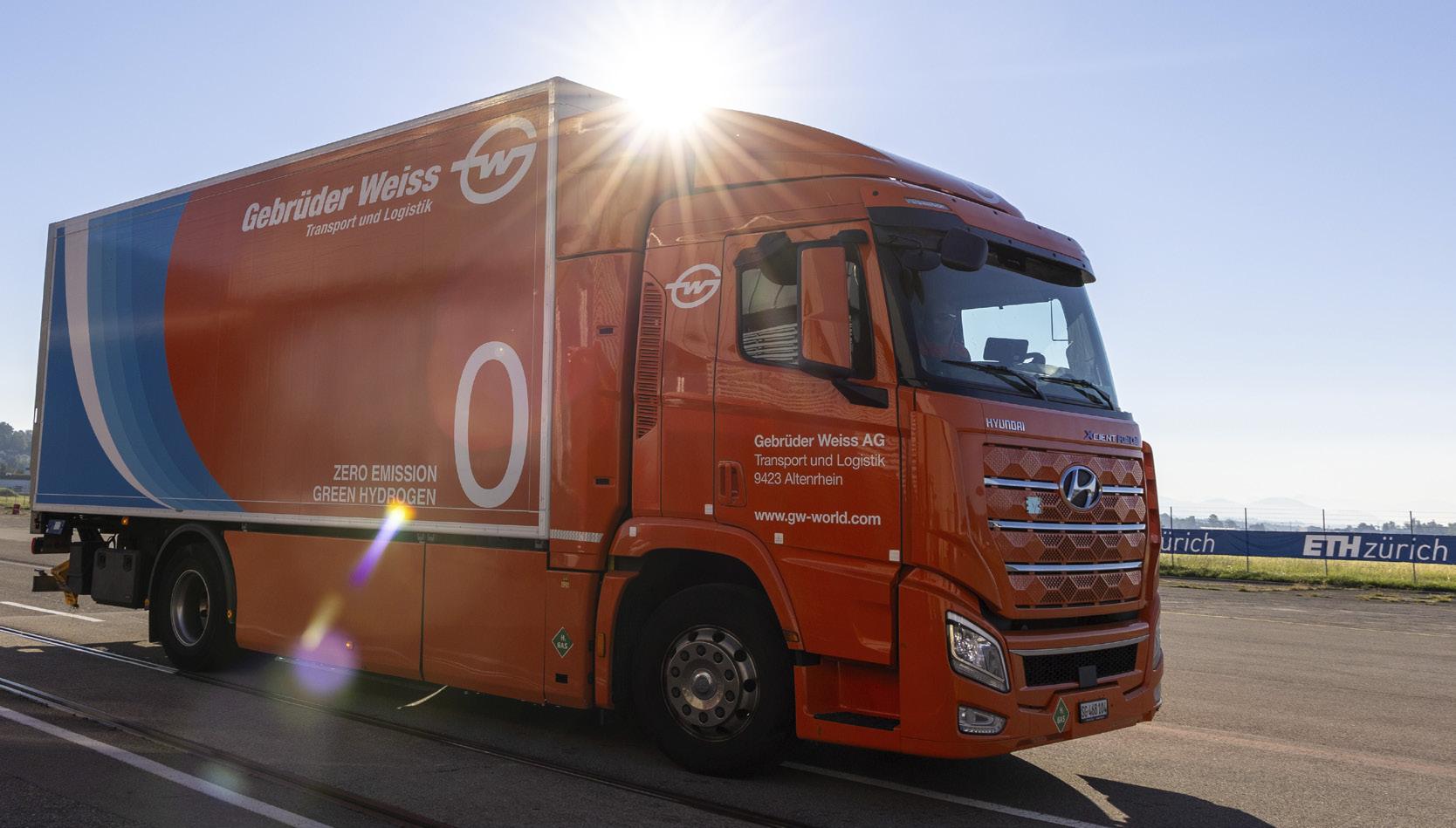
High-tech developers at ETH Zurich rely on orange expertise
Team aCentauri’s innovative solar car is on its way to the World Solar Challenge in Australia. The international transport service provider Gebrüder Weiss used its hydrogen truck on the first leg of the high-tech vehicle on September 05. With a comprehensive logistics solution comprising land transport, sea and air freight, the experts are ensuring that the vehicle developed by the students at ETH Zurich can be at the starting line in Darwin on time in October.
Katharina Zimmerling, Branch Manager Air & Sea Zurich is inspired by the innovation drivers at ETH Zurich: I was deeply impressed by the determination shown by the solar team in the work on developing mobility solutions of tomorrow. The alternative drive technology is also a good fit for Gebrüder Weiss. This motivates me all the more to ensure that aCentauri gets off to a good start in the race.
Over 8,000 hours of research, development, along with lots of blood, sweat and tears have gone into our solar car, pushing the boundaries of what is currently technically possible and showing how much potential there is in young people. The dedicated transport solution developed by Gebrüder Weiss demonstrates our supporters’ appreciation for our work.
Aaron Griesser, Drivetrain & Controls, aCentauriThe aCentauri team is particularly pleased that, with the hydrogen truck, two alternative drive systems are coming together to prove their work on the first transport leg: sustainable mobility is possible.
As a driver of intelligent transport solutions, Gebrüder Weiss helps young scientists to shape the mobility of the future together. The logistics experts showcases their extensive know-how and many years of experience, be it to start on time at the World Solar Challenge, or for a Mars or space mission.
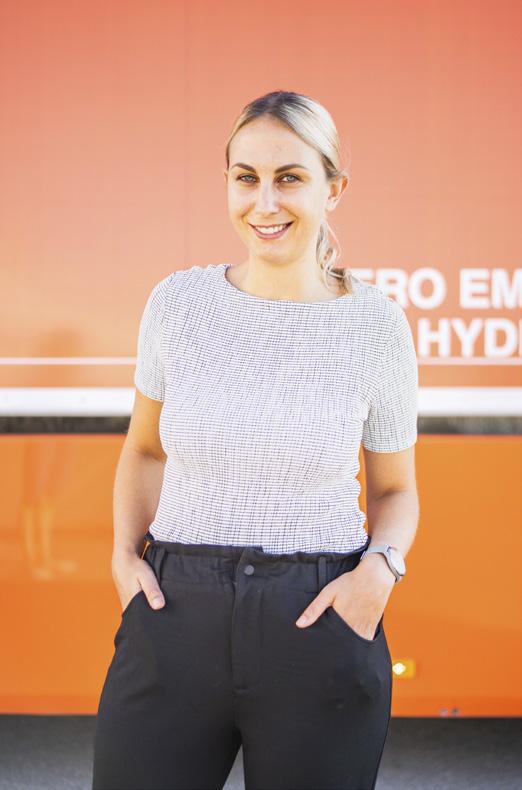

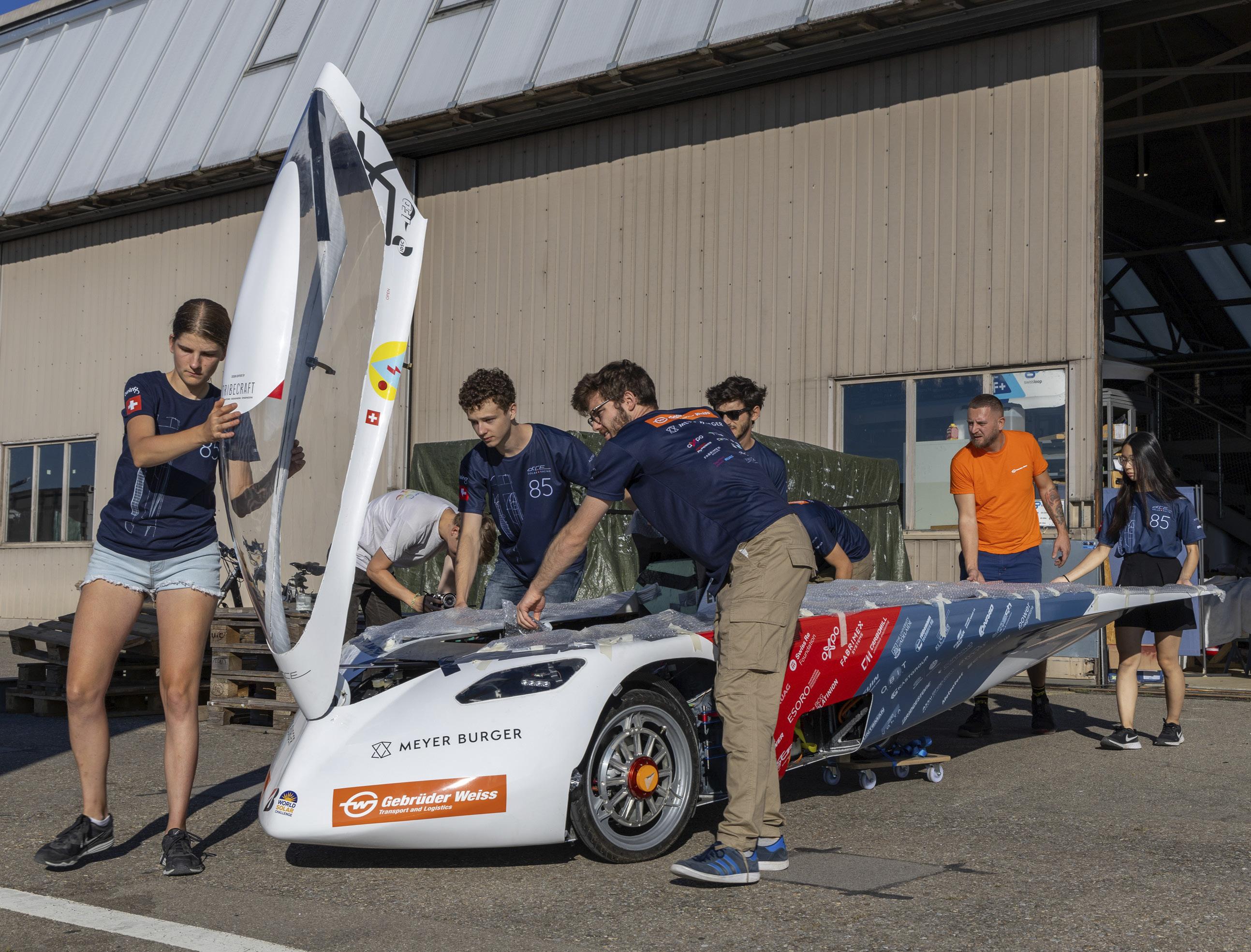
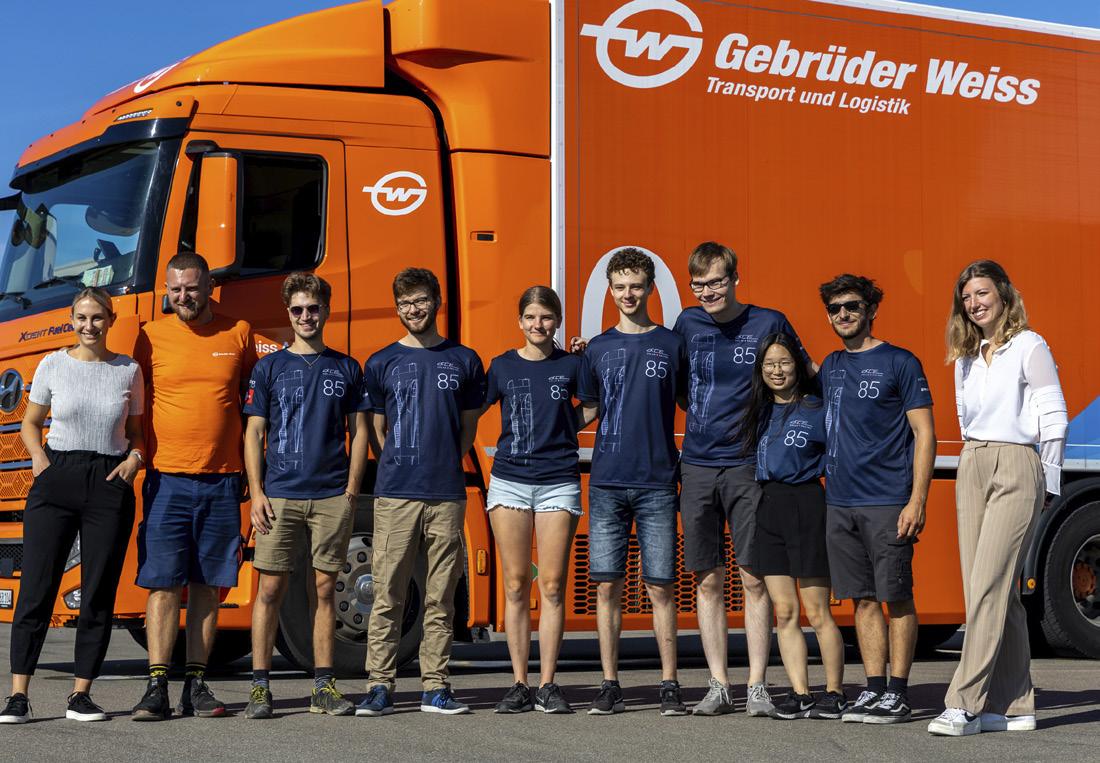

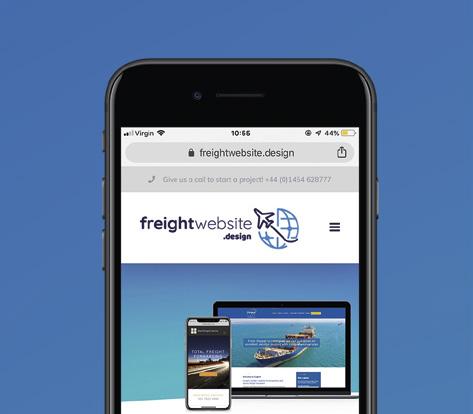
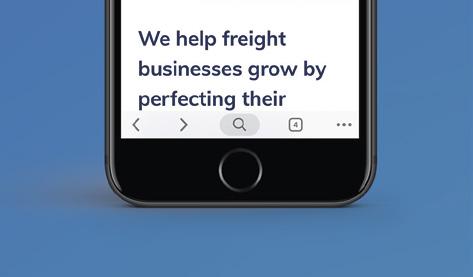


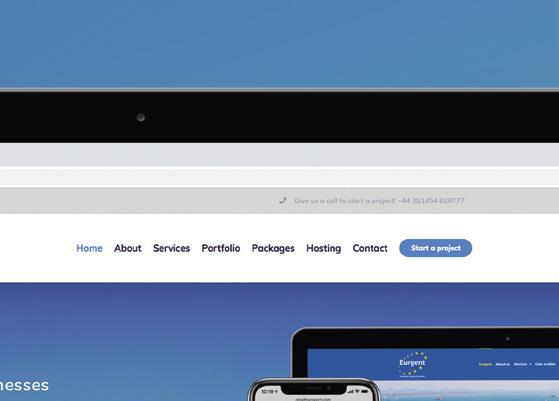


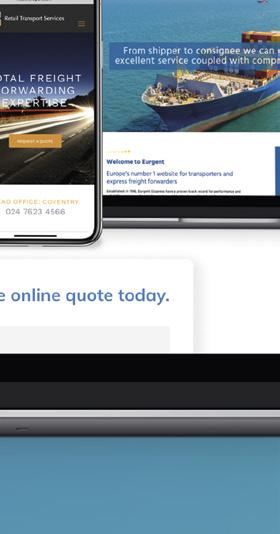







We


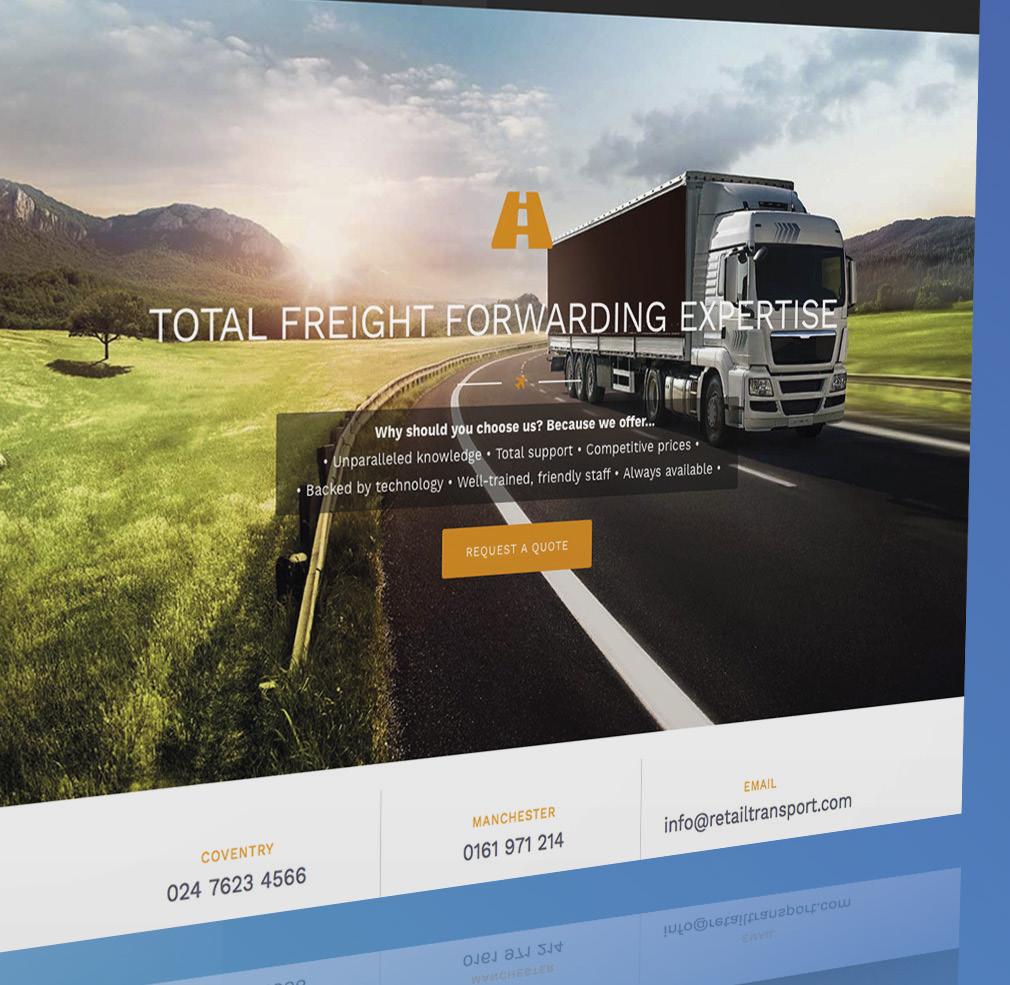


Advertising: +44 (0)1454 628 795 tony@

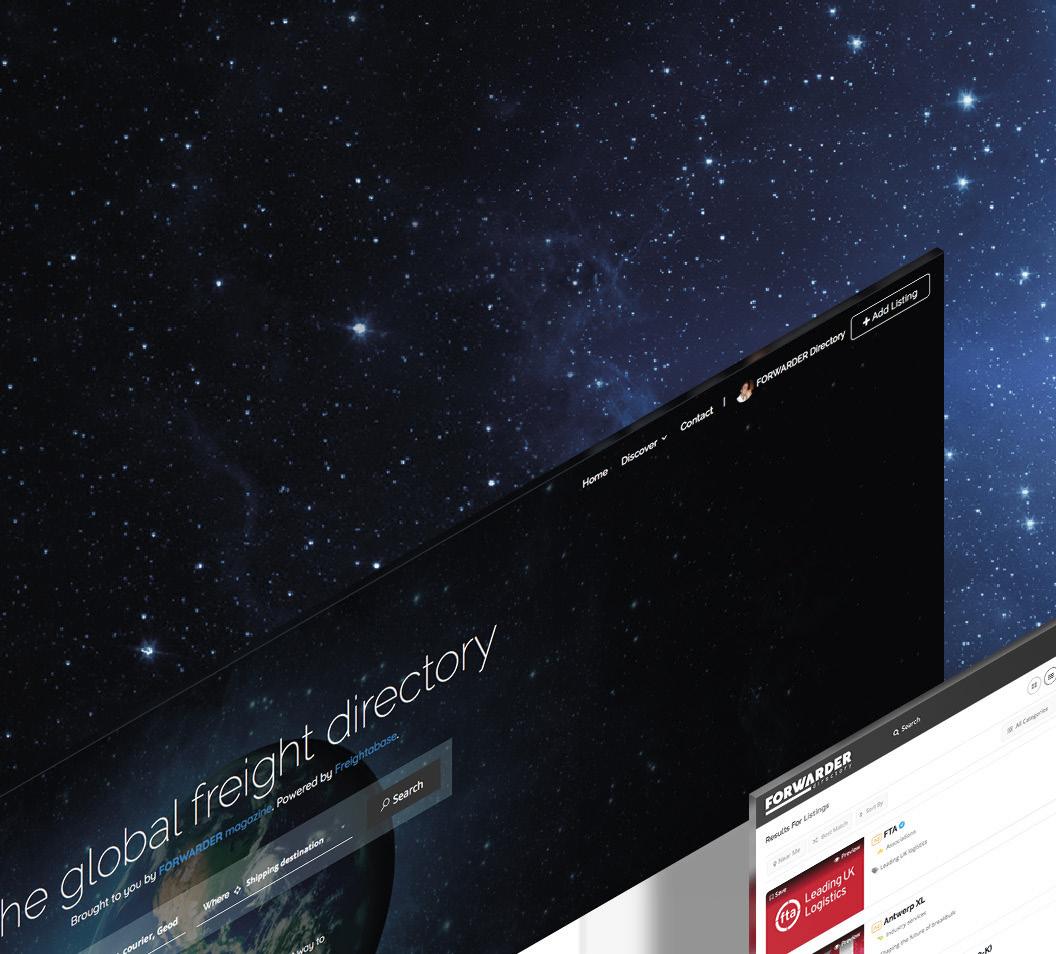






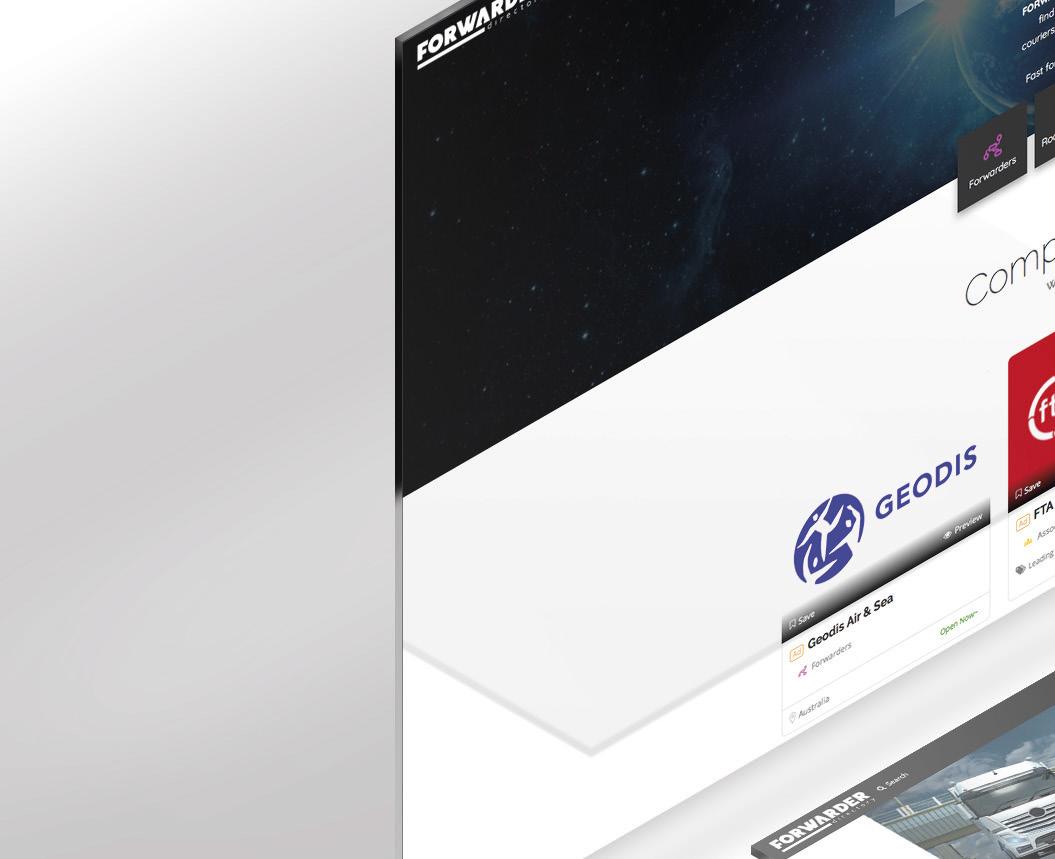
 FROM FORWARDER MAGAZINE POWERED BY FREIGHTABASE
FROM FORWARDER MAGAZINE POWERED BY FREIGHTABASE







We know you're a generous, caring bunch in the freight world. Let us help you get your message out there...
Mission Zero redefines the meaning of Sustainability in fleet accreditation standards and provides companies with a realistic pathway to achieving long-term Sustainability
Involved in the development of the new Mission Zero Standard was leading expert on transport sustainability, Dr Sarah Wixey, Director of Strategy and Sustainability for Virtus Energy. Sarah comments:
Mission Zero, the UK’s fastest growing fleet accreditation scheme, designed to raise the operating standards of any company with a fleet (car, grey fleet, van, HGV or bus), has redefined the meaning of sustainability by redeveloping it’s Mission Zero Standard to ensure alignment to the United Nations Sustainable Development Goals (SDGs).
The United Nations SDGs are at the heart of The 2030 Agenda for Sustainable Development, adopted by all United Nations Member States in 2015 and currently being implemented by most major corporations around the world. Working with industry experts, Mission Zero has translated the United Nations SDGs into a realistic, easy to implement framework that can be successfully achieved by any size of organisation, even those with only one vehicle.
One of the first organisations to specify Mission Zero to its supply chain will be DigiHaul, the UK's leading digital freight platform.
More and more of our customers are demanding sustainable transport solutions and our adoption of Mission Zero allows us to demonstrate a consistent, independently audited standard across our network of over 700 hauliers.
Lucy Rodriguez , Environmental Lead, DigiHaulThis is not just about HGV’s and fleet operators, every company uses a vehicle at some point, whether directly or within their supply chain. Even organisations that just have company cars or a grey fleet should consider implementing Mission Zero, demonstrating that they are not only operating safely and legally, but also committed to improving their sustainability; we all need to play our part.
Mission Zero already covered key sustainability elements around vehicles, fuels, and emissions, however, the latest version of the Mission Zero Standard now incorporates additional sustainability requirements covering areas such as the reduction of single use plastics, energy efficient devices, health & wellbeing, equality & diversity, and the gender pay gap. Although Mission Zero is about fleet standards, these requirements cover the whole organisation, not just the fleet department.
In addition to the redevelopment of the Mission Zero Standard, there are also two new bolt-on ‘Sustainability Advance Transport Modules’ that provide a progressive path for improved sustainability, each one stepping up in requirements and allowing companies to demonstrate a greater commitment to a long-term sustainable transport operation.
Traditionally, most companies have focused heavily on the reduction of tailpipe emissions and of course this is extremely important, but sustainability is not just about buying electric vehicles. It is essential that companies embrace and take-action across all of the United Nations SDGs, ensuring a sustainable future for us all.
Nick Caesari, CEO, Mission ZeroMembership in nonprofit organization to accelerate decarbonization journey in collaboration with fellow logistics, shipping companies
As part of the company’s evolving sustainability commitments, global supply chain solutions leader, AIT Worldwide Logistics, recently became a Smart Freight Centre (SFC) member.
SFC is an international nonprofit focused on reducing the emissions impacts of global freight transportation. The organization provides a forum for collaboration among top companies in the logistics industry. Members in the SFC community work together by consolidating existing knowledge and developing new approaches to foster emissions reductions throughout the global supply chain.
According to AIT’s Chief Information Officer and Executive Vice President, Ray Fennelly, partnerships developed within the SFC will help strengthen efforts to achieve the company’s goal of net-zero emissions by 2035.
Sharing our existing knowledge and supporting the industry as a whole is an important aspect of our company’s sustainability strategy. Joining the SFC community is a natural next step as the firm’s environmental initiatives continue to mature.
As a result of becoming an SFC member, AIT is now participating in the Global Logistics Emissions Council, Clean Cargo, and Clean Air Transport programs.
In 2023, AIT expanded its supply chain solutions to help customers avoid emissions as efficiently and cost effectively as possible. For example, in its most recent sustainability report, the company included updates on pilot programs involving sustainable aviation fuel and electric delivery vehicles in multiple locations on three continents.
AIT also became a signatory of The Climate Pledge in 2022, joining more than 400 other companies around the world in an agreement to measure and report greenhouse gas emissions, implement decarbonization strategies, and neutralize remaining emissions with credible offsets.
Coffee manufacturer Atinkana strives to minimize its carbon footprint. The coffee beans are transported by sailing ships across the Atlantic to Europe, and the hydrogen truck of Gebrüder Weiss takes care of last mile delivery.
Coffee manufacturer Atinkana pursues a vision of sustainability: in the long run, they want to restore the original structure of the virgin forest in Colombia and make the soil more fertile. The Swiss company is financing its project in Colombia’s Sierra Nevada by growing coffee, cocoa and a variety of fruits. The plants are cultivated in a natural cycle, with hardly any emissions being produced thanks to manual harvesting and processing. For every kilo of coffee sold by Atinkana, the company plants two trees in Colombia. In order to make the 8,500-kilometer transport to Europe as sustainable as possible, Atinkana relies on particularly ecofriendly means of transport: the coffee beans are transported by sailing ships across the Atlantic to Amsterdam, then by truck to Antwerp and subsequently by rail to Basel. From there, Gebrüder Weiss delivers them to the coffee roasting plant using its hydrogen truck.
Thanks to the cooperation with our innovative logistics partners Fairtransport and Gebrüder Weiss, we are able to cover 98 % of the route from Colombia to Switzerland by sustainable means of transport. This makes our coffee almost as sustainable as a regional product in Europe.
Andre Conte, Logistics Manager, AtinkanaIt takes two sailing ships about 10 weeks to transport the coffee to Europe. Thus, 14 tons of coffee are transported to Switzerland once a year.

Apart from reforestation of the virgin forest, Atinkana sets high standards in other areas as well. They pay higher wages to their coffee farmers than other companies. For each kilogram of coffee sold, eight dollars remain in the country – five for the coffee beans, three for reforestation. This corresponds to around 22 percent of the revenue. It is mainly the Colombians who are meant to benefit from the profit.
Oskar Kramer, Country Manager Switzerland at Gebrüder Weiss, is fascinated by the project: Atinkana’s eco-friendly approach in terms of production and logistics is a perfect fit for Gebrüder Weiss. For many years, we have been investing in alternative drive technologies for trucks and pursuing the objective of making transport as sustainable as possible. Using our hydrogen truck to deliver the coffee, we provide for zero emission last mile delivery in Switzerland. For more than two years, Gebrüder Weiss has been successfully using its hydrogen (H2) truck for local transport in Switzerland. The company plans to deploy another three H2 trucks in Germany by 2024.
CRAIG EDITOR-IN-CHIEF
PAUL MEDIA / EVENTS MANAGER





TONY SALES EXECUTIVE

TIM DESIGNER
MOHIT DIGITAL & SOCIAL
Thanks for reading. Perhaps you're reading this at the FORWARDER event in Heathrow. If not, please get in touch if you're interested in meeting us at the next one. There will be another local event in November, and the next full-day event will be in January. Details will be updated on the website.
Please keep the great content flowing our way, and we’ll present it to the freight and logistics world, with love from FORWARDER.
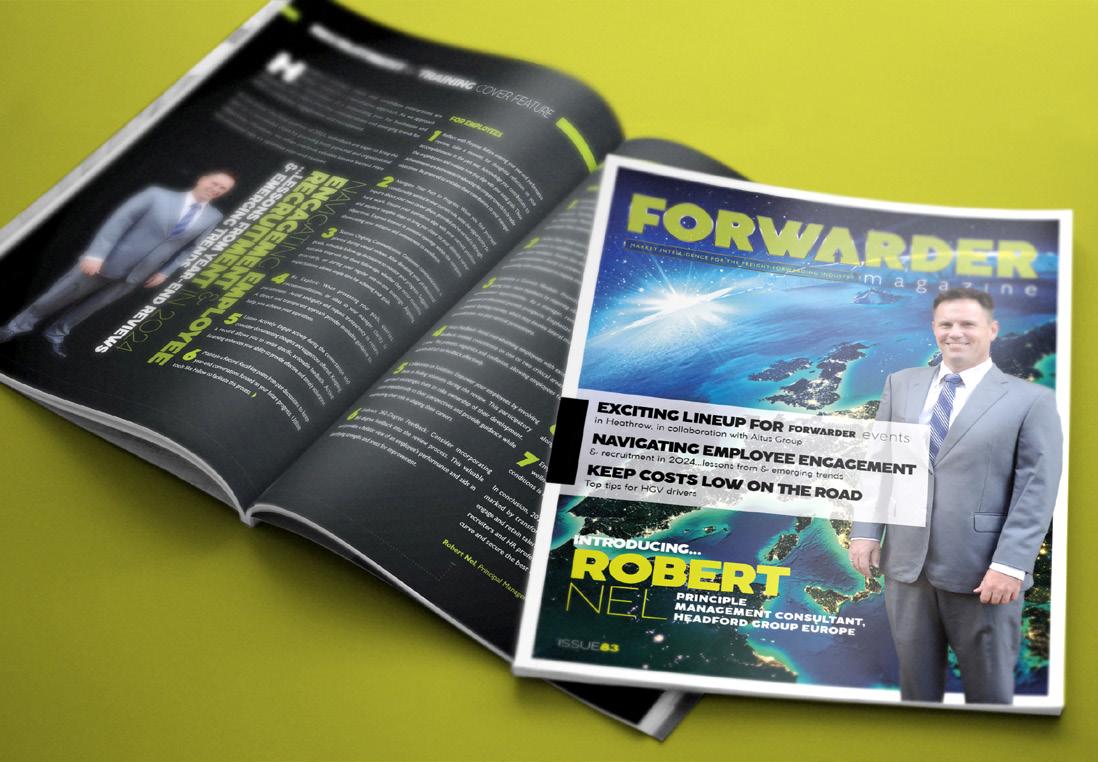
Tim, Designer, FORWARDER

We're hosting our fourth industry event on 5 October. It's being held in the Windsor Heathrow area of London. You may be reading this at the event! Otherwise, let us know if you would like to attend. Check it out using the QR code or at FORWARDER .events

We hope you like the new format and hopefully there will be a section that is of interest to you every month. Feel free to get involved! To re-iterate, the main sections are...
CRISIS RESPONSE RECRUITMENT & TRAINING MERGERS & ACQUISITIONS
MEDIA & MARKETING
GIVING BACK
If you would like your editorial to feature in next month’s magazine, please contact our editor using the contact details to the right. If you would like to advertise in FORWARDER magazine , full details of our rates and technical specifications can be found in our media pack. Please email us for a copy.
FORWARDER magazine is free in the UK. Please email for a subscription form.
Please visit us online at forwardermagazine.com
When you’re finished with this magazine, please




